

Medical Universities and Med Schools in Germany (2022)
Terminology: university vs. med school, complete list of public medical universities to study medicine in germany, private medical universities to study medicine in germany, what is the best medical school in germany, the role of university hospitals in germany, distribution of specializations and expertise throughout germany, the next step: getting access to medical universities.
Video Course
Get Accepted into Your Dream German University — with the Perfect Letter of Motivation!

If you are thinking about studying medicine in Germany , it is important you familiarize yourself with the institutions that provide you with the training to become a medical doctor. To support you with this process, this article answers the following questions for you:
How is the German higher education landscape structured to train students of medicine? And: At which universities in Germany can I study medicine?
Before we get to the 43 German medical universities and schools, here are the most important information you should know about studying medicine in Germany:
Medical degree
Unlike almost all other subjects, which have a two-tier system (undergraduate/Bachelor + Graduate/Master), medical studies are traditionally structured. The university course of study lasts 6 years and 3 months (standard period of study) and concludes with the so-called state examination.
German as language of study
If you want to do the full training in Germany and become a doctor here, you must be able to speak German. The only exceptions are some Bachelor’s and Master’s programs in the field of health sciences that are conducted in English but do not lead to approbation to work as a physician. So please read the article about the German language requirements .
Medical studies are among the most competitive subjects - because the demand of students who want to become medical doctors is much bigger than the number of places available. The application procedure is rather complex. As a rule of thumb, you need to have an excellent GPA in your A-Levels and/or meet one of the alternative application requirements that allow you to get admitted (e.g. admission test, interview, several years of work experience).
Tuition fees
At the public universities the study is basically free of charge (exception: non-EU foreigners in Baden-Württermberg and certain Masters). At the private universities the fees are about 50,000 - 100,000 € in total.

Further Reading

Depending on where you are from, you may know different terms for higher education institutions and facilities that train people to become doctors. No matter if you call it medical university or med school, or if you use MBBS as synonymous to ‘training to become a doctor’, when you transfer to the German system it is usually the medical faculty of a university that will offer your medical training. The few exceptions are the universities that are specialized in medical subjects only, such as the Hannover Medical School (MHH) which is the medical university located in the capital of Lower Saxony.
If you come from a university system in which you can start your training to be a doctor by transferring to a medical school after finishing an undergraduate degree in a more or less related subject, you should also be aware that training to become a doctor in Germany starts after a student’s A-Levels, meaning after they finish high school. Medical education in Germany is not separated into an undergraduate and graduate degree. Rather, it is one comprehensive training.
In Germany, a term that is frequently used to capture the interrelated academic and practical parts of the German doctoral training as well as the structure of the German health system is university medicine (German: Hochschulmedizin ). This term refers to the cooperation of the medical faculties of public universities offering medical studies in Germany, the 32 university hospitals, and the research facilities.
The majority of universities that offer medical studies in Germany are public. Some of the great upsides of that are that they have comprehensive infrastructures and research networks in Germany, that they are free of charge (no tuition fees), and offer the opportunity to engage in doctoral studies as well. All medical studies at public universities underlie certain federal regulations, influencing the course structure as well as application processes. To get admitted at one of Germany’s public universities, students typically need outstanding GPAs.
The regular courses of study all have a similar structure. The uniform structure of the regular study programs doesn’t mean that the training at different public universities looks exactly the same. It is recommendable to check out the module descriptions and specializations of each program in Germany to learn about their differences and identify a program that fits best to your interests and plans.
Furthermore, there are certain model study programs (German: Modellstudiengang ) that are offered by 13 universities (in the following table marked with an [*] asterisk) including two German private universities presented below. These model programs are attempts to innovate the German study course structure and can include features such as earlier contact to patients.
List of public universities to study medicine in Germany
*reformed model programs: Structure of studies differs from that offered in the more common regular programs.
Source: Hochschulstart (Winter semester 2019/20) or website of the university.
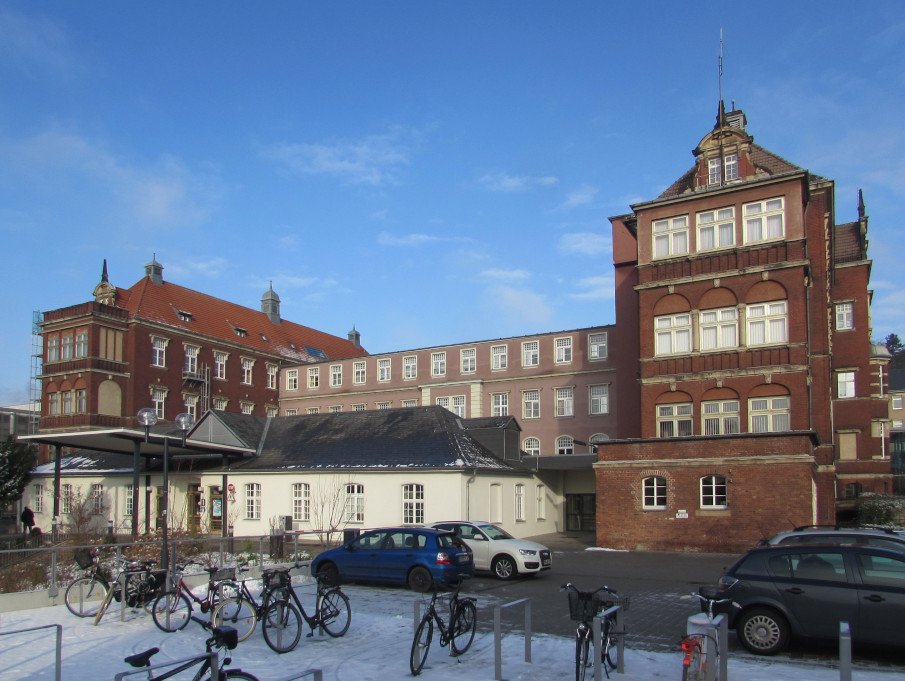
Main building of the Brandenburg Municipal Hospital.
© Gregory Rome . Type of license: CC BY-SA 4.0 .
There are four private German universities that offer medical studies. Unlike the public universities, they are not subject to the nation-wide NC and, therefore, the application process differs and is not only dependent on the applicants’ GPAs. You can still expect, however, to undergo some rigorous testing system in order to get admitted to these universities. On the downside, students need to pay fees to the private universities, which currently amount to 5,700€ - 15,000 € per semester, depending on which university you choose.
Regarding the quality of training that can be obtained at the private universities, the proximity to hospitals and focus on practical experiences in early stages of the career are praised. Partially, it is criticized that these universities are not as strongly focused on research as the public ones since they lack access to the German university hospitals.
When it comes to the students’ ability to practice as physicians in Germany after their studies they, as of now, should not be experiencing problems if they study at one of the private universities in Germany. These four private schools are German institutions and offer medical training that leads to the state examination, just like the German public universities do. Therefore, students have the approbation to work as doctors in Germany after their studies:
- Universität Witten/Herdecke .
- Medizinische Hochschule Brandenburg Theodor Fontane (MHB) .
- Health and Medical University Potsdam (HMU) .
- Medical School Hamburg - University of Applied Sciences and Medical University (MSH) .
Foreign medical schools with campus in Germany - an alternative
There are other private options that are subsidiaries of other European universities. Students of these universities study in Germany under the regulations of the cooperating university’s local regulations. This means that, despite studying in Germany, they are trained as doctors according to the university’s country’s definition.
Often, the training at these foreign medical schools includes stays abroad at the respective superordinate universities. Because of an EU regulation, graduates from these universities, which are located in (former) EU countries, are able to work as doctors in Germany after their graduation:
- Kassel School of Medicine , subsidiary of British Southampton University.
- Asklepios Campus Hamburg , subsidiary of Hungarian Semmelweiß-University in Budapest.
- Paracelsus Universität Nürnberg , subsidiary of Austrian private university in Salzburg.
- Universitätsmedizin Neumarkt am Mieresch Campus Hamburg , subsidiary of Romanian public university in Neumarkt am Mieresch.
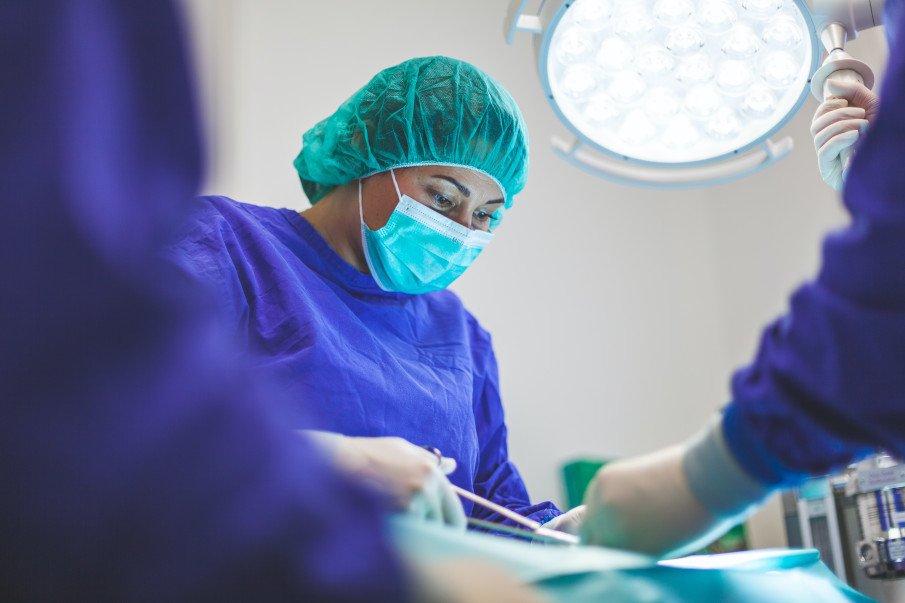
To find the best university in Germany to study medicine as an international student, you might be interested in finding out how different universities and medical faculties fare in rankings. Overall, rankings can be a useful tool to compare certain aspects of different universities and you can obtain an overview of various rankings in our article .
If you are looking for the best German universities to study medicine in international rankings, we advise you to check out the subject rankings that are published by the different ranking agencies. For example, the QS World Universities Ranking , the Shanghai Ranking , and the THE World University Ranking allow you to compare the top universities around the world for medical studies and medical subjects. In these three rankings, Heidelberg University fares best.
Additionally, you can take into consideration national rankings that only compare German universities. The CHE subject ranking allows you to compare German universities that offer medical studies. After registering for free on the website, you can select criteria that are most important for you. This can be a broad array of things, such as how many students use their bike in that town, the number of seats available in the library, the amount of students graduating in time, or the research output. We recommend you have a look at this ranking, because it is partially based on student surveys and can give you a good idea on what it’s like to be a student in a certain city.
In summary, rankings can be a good way to get an overview over your options, or may sway your decision to choose one university over another. Still, we recommend to not overrate rankings. Especially when it comes to studying medicine in Germany, there is a fairly homogeneous level of quality. In fact, because of a system of cooperation and specialization, each faculty is known and leading in different disciplines, so informing yourself on areas of specializations of different faculties might be an even more promising strategy to identify the best medical university in Germany for your interest. Furthermore, no matter where you study, the employment rate for medical practitioners in Germany is very high.
Top 10 Biggest Medical Faculties in Germany
Ranked according to number of enrolled students in all medical programs of that faculty (as of August 2020):
- Charité - Universitätsmedizin Berlin - 8,077 .
- LMU - Ludwig-Maximilians-Universität München - 6,911 .
- Heinrich Heine University Düsseldorf - 4,366 .
- University of Tübingen - 4,140 .
- Heidelberg University - 4,033 .
- University of Cologne - 3,600 .
- Hannover Medical School - 3,521 .
- Universität Hamburg - 3,450 .
- University of Freiburg - 3,300 .
- Ulm University - 3,234 .

Learning about the way that medical training in Germany is organized can furthermore help you to make a decision on where to study. Universities cooperate with certain hospitals for the practical portions of the medical studies. The 32 university hospitals (German: Universitätsklinikum ) in Germany are some of the most important places for the exchange of theory and practice for medical students in Germany.
University hospitals are the flagships within the German health system, since they possess the highest technology and the highest degrees of specialization. They combine the practical care of patients with research and therefore provide a great environment for medical students who are looking to engage in research throughout their studies and acquire a doctoral degree. With support of other teaching hospitals (German: Lehrkrankenhäuser ) university hospitals provide and organize most of the practical training for medical students in Germany.

With these features, university hospitals are the best equipped and highest performing health care facilities in Germany. To operate at such a high level, specializations and expertise are distributed to different university clinics throughout Germany. Therefore, each university hospital with the associated research institutions and medical faculties is a hub for improving and researching certain illnesses or treatments. For an easy to grasp and interactive overview over, inter alia, research focuses of different locations, make sure to check out the Landkarte Hochschulmedizin .
Informing yourself on the research foci of different universities can be supportive of your decision on where to apply to study medicine, since being in a location that sets a focus on a topic close to your interests and beneficial for your planned career is a smart move. This can also be a very useful strategy for students who are not looking to finish their training to become a physician in Germany, but would rather engage in research activities and pursue doctoral studies or a master’s degree in health sciences.
Especially doctoral candidates might want to check out the so-called competence networks medicine which are locations for excellent and globally recognized research. For example, German nobel prize of medicine winner Harald zu Hausen is organized in one of them.

Knowing about the German higher education landscape is a very important first step to starting your medical studies in Germany. As a next step, you can find out more on how and if you can get access to one of the universities presented above.
More Articles

Munich Universities: A guide

Top Universities for MS

Germany in University Rankings

DAAD Scholarships: Guide
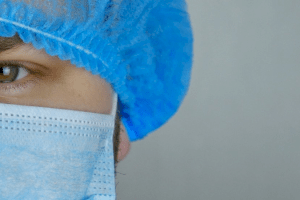
Medical Universities in Berlin
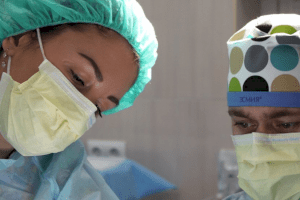
How to study medicine in Germany: 10 things to know
The Expatrist
Study Medicine in Germany for International Students: 2023 Guide
Medicine is one of the most popular subjects to study in German universities, particularly among local students. Becoming a doctor is a dream of many; additionally, medical professionals belong to the top earners in Germany.
The quality of education and affordable costs in Germany also make medical programs very attractive for international students. Moreover, German doctors are known as the best in the world. In this article, you will learn how you can study medicine in Germany as an international student.
Studying Medicine in Germany: all you need to know
Being a doctor is often associated with prestige and a tremendous reward. Germany is one of the best and most affordable countries to study medicine in the world. The main reason for this is that most medical schools don’t charge tuition fees, and the quality of education is unbeatable.
Additionally, students can stay in the country and pursue their careers after they finish the program. Germany is one of the best countries to be a medical professional in the world.
The government supports foreign specialists by regularly simplifying legalization and immigration prozess. The reason for this is also the lack of medical workers in the country; without help from abroad, Germany won’t be where it’s now.
The competition in medical faculty is quite steep; local students are expected to have outstanding notes; if not, they must wait till next year or even for many years.
If German students need to “fight” for one place in the medical faculty, international students have an advantage in this situation. Each university has a quota for foreigners, so you won’t compete with German applicants.
What to expect from medical studies in Germany?
Studying medicine in Germany is an intense and lengthy process, including a lot of learning and practice. However, the program is very diverse and interesting from a medical stand of point; you will be introduced to all areas of medicine and, of course, its basics.
Internships are a must for future doctors in Germany. Therefore, you will spend at least 1 year working at different hospitals during your studies.
In Germany, regular medical study lasts for 6 years and 3 months. Most of the courses are taught in the German language, so students must make sure they possess the required level of language – level C1.
Eventually, foreigners need to spend one year of preparational courses at Studienkolleg because of the difference between German and foreign education. With that said, medical studies may take up to 7 years and 3 months.
A medical degree in Germany has 12 semesters and is divided into a preclinical study section (1st – 4th semesters) and a clinical study section (5th – 12th semesters). The last two semesters, students spent working in different hospitals as interns.
Main stages of a medical degree in Germany
Medical study in Germany is divided into those main stages, which take place for 6 years.
1. Pre-clinical section
Pre-clinic it’s when you learn all basics and all major vital concepts of medicine. This stage involves a lot of learning and studying, it’s also considered to be one of the most challenging times when students tend to give up and stop their studies.
So you better go through it and remember the most interesting things will come after this stage.
Subjects you will learn during these 2 years:
- Biochemistry
- Terminology
- One elective subject to be taken by the student
2. First state examination
After 4 semesters, the first state examination is the first major hurdle in studying medicine in Germany. It lasts two days in a row. In the written part, you will encounter 320 multiple-choice questions. As well as oral examination in anatomy, physiology, and biochemistry subjects.
3. Clinical phase
Anyone who has successfully completed the pre-clinic and 1st state exams can breathe out. The workload of the following semesters is less than it was in the beginning. Now you have to learn about the practical relation to the theory you just learned.
This section is the most crucial part of your medical studies because you will be taught about core concepts and topics in medicine while also visiting hospitals and learning it “live.”
Subjects you will find on your timetable:
- General practice
- Anaesthesiology
- Emergency medicine
- Occupational and Social Medicine
- Eye medicine
- Dermatologie
- Ear, Nose and Throat Medicine
- Human genetics
- Hygiene, microbiology and virology
- Internal Medicine
- Clinical chemistry and laboratory diagnostics
- Neurology department
- Orthopedics
- Pharmacology and toxicology
- Psychiatry and psychotherapy
- Psychosomatic medicine and psychotherapy
- Legal medicine
In addition, there are so-called cross-sectional subjects:
- Epidemiology
- History, theory, ethics of Medicine
- Health Economics
- Clinical-pathological conference
- Clinical Environmental Medicine
- Medicine of aging and the elderly
- Prevention and health promotion
- Rehabilitation
- Naturopathic
4. Internships
Moreover, during the semester break, all medical students must complete internships or so-called Famulatures in outpatient and inpatient care facilities. Total of 120 days:
- 30 days in an outpatient care
- 60 days in a hospital
- 30 days in a general practitioner’s office
These internships can also be completed abroad if their length is more than 15 calendar days.
5. State examination (writing part)
At the end of the 10th semester (after your clinic phase and summer internships), the written part of the 2nd State Examination (so-called Hammer examination) follows, which also includes 320 questions about clinical contents and takes 3 days in a row.
6. Practical year
After that exam, you can start your practical year in a hospital, clinic, or practice. Internships are divided into 3 periods in which you will pass through the departments of internal medicine, surgery, and one department of your choice.
For a year, you’ll participate in real-life training sessions where you can put your skills and knowledge into practice. Students need to work for at least for 4 months in each of these areas. Parts of the practical year or the entire year can also be completed abroad.
In the end, you will be ready for the third and last medical examination .
7. State examination (verbal part)
The last examination happens verbally at the respective training center. For two days in a row, MBBS students will be examined in the 3 clinical subjects (internal, surgery, and one elective).
In addition to a theoretical part, the examination includes a practical part in which the student has to demonstrate their practical skills (examinations, diagnosis) on a previously assigned patient. This is the most serious part of your medical studies, so take it seriously.
Eventually, you will need to get a license to be allowed to practice your job as a doctor. Such a license is called Approbation or Berufserlaubnis, and it’s legitimate for your entire life.
Graduates of medical faculty work as doctors in private practices, hospitals, or any other place needing a medical specialist. For example, you can work in research and development, the pharmaceutical industry, public administration, health management, or environmental medicine.
How to become a doctor in Germany?
Before you can wear the title doctor or Dr. med, you must have completed a doctorate and have written your medical doctoral thesis. This process can be started either during the clinical phase or after completing your program.
Having the title Dr. Med. isn’t mandatory for working as a doctor in Germany . You can start your career already upon finishing your medical degree.
Admission for medicine at German Universities
As in any other country, German universities have their own application processes and requirements international students need to fulfill to apply for the medical program.
Studienkolleg or direct application
First, you need to know if your school’s leaving certificate or other high school certificate equals the German one. This is the most important requirement of German universities.
In most cases, the European school leaving certificate is equal to the German one; however, non-European can differ significantly. For example, in many non-EU/EEA countries, school years are shorter than in Germany.
Therefore, the previous education of some applicants isn’t sufficient to start studying medicine directly in Germany.
There are two options to access a German university if the school system of your country is different:
1. Studienkolleg
The Studienkolleg was made exceptionally for foreign applicants and lasts for two or sometimes one semester. In the end, students pass the exam, which will give them access to German universities.
This doesn’t mean that they are automatically enrolled, but they can apply for the desired program and participate in the competition and entrance tests with other students.
To enroll in Studienkolleg, applicants must have at least a B1 level in the German language. Your language capacity will be tested at the entrance examination.
There are 4 main courses held in Studienkolleg, each specified for a future university program. To study medicine, you need to complete the M-course.
The following subjects are taught in the M-course:
- Mathematics
- German language
It is also possible to complete the final exam from Studienkolleg without attending it. You can prepare on your own and after come to Germany to pass the test. However, you can’t receive a visa for this reason.
You might want to consider going on this path if you are already in Germany or can arrive on another visa, for example, the tourist one or a visa for the language course.
Be aware that with a tourist or language course visa, you can’t apply for a student permit/visa in Germany, you will need to travel home and organize it from there.
Medical degree in the home country
Applicants from non-EU/EEA countries can also fulfill the requirements of German universities by attending university in their home country. Usually, a direct application to a German university can be made after successfully finishing 2 or 4 semesters of medical education at a foreign university.
However, the direct application can only be accepted when a future student possesses the C1 level of the German language.
Whether foreign or local applicants, when applying for a medical degree, all experience related to medicine counts. German universities consider the previous medical background, the completed vocational training, voluntary work, or the nursing internship of all applicants.
This can significantly increase your chances of direct access by having a background in the medical field. However, all foreign applicants must submit all their certificates to Uniassist to determine if they are eligible for studies in Germany.
If you already know which university you want to study at, then you can inform yourself directly at their website about which achievements increase your admission chances.
Pass a test for medical courses (TMS)
More and more German universities choose to use TMS in the selection process and admission to medical programs. Therefore, all students must pass this exam before being considered applicants.
Today 22 universities use this test, and you can check with your desired university if it’s a requirement. Although this test isn’t mandatory, but can significantly increase the chances of the applicant if they don’t have excellent grades. The exam is in German and takes about 5 hours. Currently, the examination fee is 73 EUR.
Test for foreign students (TestAS)
All German Universities have a 5% quota placed for non-EU/EEA citizens. Applicants from non-EU/EEA countries can take the TestAS test instead, which will also improve their chances of receiving a study place.
To participate in the TestAS, the applicant’s language skills should be approximately at level B1. The TestAS can then be done in German as well as in English.
TestAS examines language competence, cognitive abilities (core test), and the capabilities to study medicine which contains field-specific test modules.
You can expect the following tasks:
- Analysis and interpretation of scientific diagrams, charts, and tables
- Formalizing processes, analyzing flowcharts
This test gives foreign applicants a better and fairer chance within the selection process for the admission-restricted program such as medicine. This examination helps especially to differentiate you from other applicants with the same school notes.
Recommendations for foreign applicants
1. if you have a chance to participate in studienkolleg, better take this opportunity..
It will give you good basics for your studies in Germany. Thus, you can keep up with the workload in the first 2 years of the program.
2. Nobody will help you with the paper.
Be responsible for submitting all documents on time and in the correct format. As well as, apply for your visa on time, and don’t forget to take out health insurance beforehand.
3. Students from non-EU/EEA countries have 10 years to complete their medical degree BUT stay on track.
When you apply for a visa extension (every 3 years) immigration office will check all your achievements and how you are doing in school, if you are too behind, they might not extend it.
Requirements to study medicine in Germany as an international student
German medical universities are among the best in the world and, therefore, are highly competitive. To get a place in a medical course, you have to show a good knowledge of medicine-related subjects.
Also, other skills will be tested during the admission process, including personal skills, ability to handle pressure, communication skills, cognitive and critical thinking abilities, and so on.
Depending on your country, you might not need a visa to study in Germany, but all non-EU/EEA students will need to apply for a student visa/residence permit.
There are two types of German student visas you can apply for:
- German Student Visa
This is the standard student visa for international students who have been admitted to a German university and are ready to start their studies at a full-time university program.
- German Student Applicant Visa
Apply for this visa if you need to be in Germany to pass the entrance examination or other exams in person. This visa doesn’t allow you to study in Germany. It’s only valid for the university application process.
If you are participating in Studienkolleg, you can apply either for a regular student visa or a student applicant visa. It depends on these factors:
- If you already have written confirmation from a Studienkolleg or University, you can apply for a student visa.
- If you only have the invitation to participate in the entrance examination at Studienkolleg or university, then you must apply for an applicant visa.
- And if you are coming to Germany to learn the language, you should apply for a German Language Course Visa.
Visa application process
To study in Germany, you will need to provide funds for your stay in the country. Proof can be provided in different ways:
- 10,236 EUR deposit confirmation in a German blocked bank account
- Letter of commitment and evidence of your parent’s income records and financial assets
- Letter of commitment by a German resident (Verpflichtungserklärung)
This letter is made at the immigration office in Germany by the German resident who is going to take responsibility for covering your costs if something happens. It can be someone you know well, e.g., your boyfriend or your relative who lives in Germany .
- Scholarship certificate – however, neither DAAD nor any other German organizations provide scholarships for international students studying medicine in Germany.
- Bank guarantee, issued to you by a recognized German bank
A blocked account is still a traditional way to prove your funds and is 100% accepted by the German embassy. There are two established companies where you can open such an account quite easily and cheaply: DR.WALTER and Fintiba .
DR.WALTER is the insurance provider for international students in Germany.
Fintiba offers blocked accounts as well as health insurance. They provide services exceptionally for international students in Germany. You can either open only a blocked bank account there or two in one account and health insurance for your stay in Germany.
A blocked account isn’t free in Germany; there is always an initial fee and monthly payments (around 5 EUR).
Other requirements for international students
In addition to the standard requirements for studying medicine in Germany , foreign applicants should pay attention to the following criteria:
- High school certificate
It must be recognized in Germany and equivalent to a German school leaving certificate if you’re a citizen of a non-EU/EEA country.
- Grades from the previous education
You must have completed particular subjects related to medicine, like chemistry and biology.
- German language proficiency
You must possess a sufficient amount of German language: TestDaf level IV, DSH Certificate II or III, Goethe Certificate C2, Telc Deutch C1, or B2 Hochschule Certificate – all of them accepted by higher institutions in Germany.
For English programs, you must prove proficiency in the English language:
- TOEFL Test. The required scores: IbT-88, Pbt-66
- IELTS Test. IELTS Academic must be 6.5+
- Cambridge Advanced English Certificate level A, B, or C
As a doctor, you will have constant engagement with patients and, therefore, good communication skills are necessary.
Moreover, you will need health insurance for a) visa application and b) studies in Germany. We have made a comparison of the best insurance providers and coverages for international students in Germany. There you will find the best coverages at affordable rates.
Best German Health Insurance for International Students
How much does a medical degree cost in Germany?
Public universities.
Education is free in Germany, and students only pay a semester contribution covering administration fees. The amount ranges between 150 EUR and 400 EUR per semester. Luckily, these fees include costs for your public transportation ticket and other services.
In fact, Germany and Austria are some of the few places in Europe that don’t have tuition fees for international students, or they are very low.
However, you need to consider the cost of living in Germany so you can survive during these 6 years of studies. Fortunately, Germany isn’t that expensive to live in compared to other EU/EEA countries.
Your cost of living will depend on which part of Germany you will study. It’s recommended to have at least 850 EUR monthly to be on the safe side. The German government itself estimates student living costs at 853 EUR per month.
Education is an investment, especially medical education, because returns are so high. The living costs of the average student lie at 61,416 EUR (for 6 years), but it’s worth 100%.
Imagine, as a doctor, you can earn around 5,000 EUR per month at the beginning of your career, which quickly pays off all your investments in education.
Private universities
A private university is an expensive alternative in Germany . Due to the limited number of free places and the high admission requirements, free medical education remains a dream for many German school leavers. Those who want to pursue their dream anyway decide on a private university.
There is no shortage of private medical schools in Germany. Students only need to be ready to pay. The costs range from 6,000 EUR to 12,500 EUR per semester.
Some most popular of them are the University Targu Mures, Witten / Herdecke University, Kassel School of Medicine, Asklepios campus Hamburg, Paracelsus Private Medical University of Nuremberg, and Medical University of Brandenburg.
Can you study medicine in English in Germany?
If you are looking for a medical degree in English, only one university in Germany that offers it. In general, medical education is taught in the German language.
University Targu Mures Medical Campus Hamburg
Only in Hamburg will you find your dream studies in English. The program lasts for 6 years and is completely in English.
Nevertheless, you still will need to speak some German due to the internships in German hospitals. As an option, you can learn a language later since internships happen at the end of the program.
The study of human medicine begins once a year, in September. Each academic year consists of 28 weeks of teaching divided into two semesters (Autumn/Winter and Spring/Summer). Upon completion of the program, graduates are entitled to take the American State Examination (USMLE).
Language skills
- English (no English certificate required)
- German (B2) for clinical internships in Germany
The Targu Mures doesn’t require applicants to have good marks, and they don’t set any minimum average, which is a significant distinction from all other medical universities.
Since it’s a private university, students pay a significant amount in tuition fees: for the first 4 semesters, 12,500 EUR each, the following 8 together with practical semesters – 14,000 EUR each. In total: 166, 000 EUR.
You need to decide if it’s a good investment for your future or if you should study at home or in another country.
Best medical universities in Germany for international students
1. heidelberg university.
Heidelberg University is one of the most prestigious and oldest universities in Europe to study medicine. In fact, it’s the oldest university in Germany.
It especially focuses on cancer; if you are interested in this area, Heidelberg is a place to study.
Some advantages of medical studies at Heidelberg University:
- Numerous partnerships around the world
- Practical year worldwide
- Exchange programs
- 8-month for doctorate
- Strong scientific approach
- Research focusing on neuroscience, cardiovascular diseases, oncology, infectious diseases, transplantation, and genetics/genomics.
University offers 320 places for human medicine and 81 for dentistry each year. Administration fees are 142 EUR per semester.
2. Humboldt University of Berlin
The medical school of the Humboldt University of Berlin is also ranked as one of the best places to study medicine in Germany.
Each semester university provides 300 places for medical newbies. International students especially benefit from studying in the capital of the country. Berlin is a center of action in Germany and in Europe.
This city will satisfy all tastes with cultural activities, music, festivals, and going out opportunities. Moreover, Berlin is more affordable than Heidelberg, for example.
Currently, the university charges administrative fees of 265 EUR per semester.
3. Technical University of Munich
The Technical University of Munich, or just TUM, is located in the south of the country and is ranked as THE best university in Germany! TUM is primarily a research university, which of course, only benefits your studies and opportunities for a doctorate.
TUM is a member of the TU9 – the largest and most notable German alliance of technical institutes. Furthermore, the Technical University of Munich is among the leading technical universities in Germany and Europe.
Students of TUM go through the pre-clinical section together with students of Ludwig Maximilian University, and the clinic phase is completed separately. A degree in medicine at TUM costs only 150 EUR per semester. However, keep in mind that Munich is the most expensive city in the country.
4. Ludwig Maximilian University of Munich
The Ludwig Maximilian University of Munich raked right after TUM – the second-best university in Germany. LMU is the second-largest university in Germany, offering a wide range of different majors.
Medicine and psychology are both very popular among local and international students. Each year LMU ensures 877 study places for medicine, around 17% of them occupied by international students.
LMU’s administrative fee is only 111 EUR per semester.
5. RWTH Aachen University
RWTH is well known among engineers, but this university is great for studying medicine too. I was lucky enough to live nearby Aachen and get to know many students from RWTH. They all were very satisfied with their choice.
RWTH is also a part of the TU9, thus, one of the best technical universities in Germany. Aachen university is one of the largest technical universities in Germany and one of the most renowned in Europe.
Every year, numerous international students and scientists come to the university to benefit from its high-quality courses and excellent facilities, which are recognized globally.
RWTH was ranked as the best university to study medicine accordingly to CHE Ranking . Currently, the university offers a study place for 2,600 medical students from around the world.
Furthermore, RWTH has an assigned clinic in the same city – RWTH Aachen University Hospital , where most of the research and internships happen.
Students pay 237 EUR for administrative fees per semester at Aachen’s University.
Similar Posts
Can you extend au pair visa in germany, 9 best sim cards in germany for students, how to study in germany without knowing german, 5 of the best ausbildung in germany: what expats need to know, what is the mechanical engineer salary – germany, buying an apartment in munich, germany: guide, 12 comments.
Sene 1983 Bratislava İlkokuluna yeni gelen öğretmen Maria Drazdechova, tüm öğrenciler ve veliler için hayatı cehenneme çevirmiştir. Çocuklardan biri intihar girişimine kalkışınca okul müdürü, tüm velileri acil bir toplantıya çağırır. Toplantı sonunda bir imza kampanyası ile Maria Drazdechovayı okuldan attırmaya karar verirler. Ancak kadının Komünist Parti ile olan sağlam ilişkileri, hepsinin tehdit altında hissetmesine neden olacaktır. Edgar Tran
Work It izle Fritz Muney
Bu bir iş adamının hikayesi ,para ve başarı hırsıyla gözleri kararmış kendini bile görmeden önüne gelen herşeyi ezip geçecek bir hırsla yaşamaktayken birdenbire onu vuran varoluşçu krizin öyküsü… Hayatının ne kadar anlamsız olduğunu en yakınındakilerin bile farkında olmadığının farkına varan adam için bu krizin başlamasına neden olan ise , 6 yıldır aslında bir başkasının oğlunu büyüttüğünün farkına varması , gerçek oğlunun doğum esnasında değiştirilmiş olduğunun farkına varması … Hirokazu Koreeda’nın yönetmenliğini yaptığı filmde başrolleri Masaharu Fukuyama, Machiko Ono ve Yoko Maki paylaşıyor Edmund Soomaroo
Zencefilli evle alakalı travmatik bir kazadan 15 yıl sonra Hansel (Jeremy Renner) ve Gretel (Gemma Arterton) adlı ikizler, kendilerini cadıları yok etmeye adamış intikamcı avcılar haline gelmişlerdir. Yıllar geçtikçe ikizler avcılıkta ustalaşmış, izleme kabiliyetinde ve avını yakalama işinde ünlenmişlerdir. Sıkıntıları iyileşse de, işleri oldukça kolaydır, tehlikeli sözler ve lanetler onlara işlemez. Şimdi, Augsbur Başkanı, kasabadan gidebilmelerine ve büyücü kadınların başını (Famke Janssen) bulabilmelerine yardımcı olur. Büyücü kadınların başı ise iki gün sonra gerçekleşecek ‘ Kanlı Ay’ esnasında yapılacak cadılar toplantısında bir çok yerel çocuğu kurban etmeyi planlamaktadır. İşleri daha kötü yapmak için ikili aynı zamanda Augsburg’daki gücü ele geçirmiş ve kendi çapında bir cadı avlayıcısı olan acımasız Şerif Berringer (Peter Stormare) ile de ilgilenmek zorundadır. Scott Tahon
1997 Ağustos’unda yaşanan ve 3 milyarı aşkın insanın ölümüne neden olan olayın üstünden yıllar geçmiş ve 2029 yılına gelinmiştir. John Connor makinelere karşı insan direnişinin lideri konumundadır. Onu 2029 yılında yok edemeyen makineler şimdi yok edemedikleri düşmanlarını geçmişte yok etmeyi denemeye karar verirler ve John’un 10 yaşında olduğu döneme bir yok edici makine yollarlar. Buna karşılık john da o dönemde kendisini korumak için daha önce annesini öldürmek göreviyle geçmişe yollanan yok edici makinenin daha üst bir modelini geçmişe yollar. İki yok edici makine arasında John Connor için büyük bir mücadele başlar. Bu arada henüz yaşanmamış olan 1997 Ağustos’unda yaşanacak olan felaketin mimarı olan Skynet adlı sistem de yavaş yavaş faaliyetlerini artırmaya başlamıştır. John ve onun koruyucu makinesi John’un annesini akıl hastanesinden kaçırıp Skynet’i durdurmak için işbirliğine girişirken diğer yok edici makine de John’u yoketmek için onların peşinden gitmektedir. Hassan Kearby
Filmin konusu işkolik bir babanın bir gün Los Angeles ‘ ta yaşayan kızını ziyaret etmesiyle başlıyor. Kendi yoğunluğundan kızını ihmal ettiğini düşünen baba kızının mutsuz olduğunu düşünüyor. Kızını neşelendirmek isteyen baba garip ve ayarsız olan kızının erkek arkadaşına tahammül edip iş birliği yapmasıyla işler renkleniyor. Horacio Fouraker
Anlatımın mizahi diyoramalar üzerinden ilerlediği bu filmde tutku dolu bir evlilik, iletişim eksikliği ve baştan çıkarıcı etkenler nedeniyle yavaş yavaş altüst olur. Stacey Franke
Lee Jang Hwan, insan embriyo kök hücrelerini başarılı bir şekilde klonladıktan sonra medyada geniş çapta yer alır. Bir gün bir televizyon kanalı isimsiz bir telefon alır. Arayan kişi geçmişte Lee Jang Hwan ile ortak araştırma yapmış Shim Min Ho’dan başkası değildir. Shim Min Ho, Lee Jang Hwan’ın araştırmasını ele verir. Sonuçlar etik olmayan deneyler neticesinde elde edilmiştir. Olay gerçek bir hikayeden esinlenilmiştir. Whistle Blower izle Francisco Bottgenbach
Victor Hugo nun ölmez eseri Les Miserables(Sefiller), 19 yüzyıl Fransa sında aşk, onu ve tutkuyu anlatan epik bir masal. Hikaye, bir somun ekmek çalan ve karşılığında suçunun çok üstünde hapis cezasına çarptırılan Jean Valjean ı anlatıyor. Valjean ın bağışlanması hayatını değiştirecek, genç adam yoksul bir yer olan Vigau nun valisi olacaktır. Valjean, zamanla kasabanın en yoksul ve en güzel kızı Fantine e aşık olur, hayatını ona adar.Ancak bir süre sonra, Fantine in ölümün eşiğine gelmesi onu kahreder ve bu kez bütün enerjisini kızı, Cosette yi kötülüklerden korumak için sarfeder. Cosette, zamanla etkileyici bir devrimci olan Marius a aşık olur.Bu sırada, Valjean bütün hayatı boyunca Valjean ı aramış saplantılı polis Javert tarafından takip edilmektedir. Valentin Nims
Bebek bakıcısı olan Greta, bir İngiliz ailenin yanında iş bulur ancak ailenin bebekleri oyuncaktır. Başlarda komik gelen bu durum, bir süre sonra Greta’nın oyuncak bebeğin aslında gerçek olduğunu farketmesiyle bambaşka bir hal alacaktır. Waldo Westphalen
Hdfilmcehennemi – Türkiye’nin en hızlı hd film izleme sitesi. Tek ve gerçek hdfilmcehennemi sitesi. Alphonso Amber
Fullhdfilmizle ile Full HD film izle deneyimi sizlerle! Türkçe dublaj ve Altyazı arşivimizle 1080p kalite kesintisiz film izleme sitesinin tadını çıkar! Jame Atwood
Leave a Reply
Your email address will not be published. Required fields are marked *
- Higher Education and Research
Study medicine and help people
Doctors are in particular demand during the current corona pandemic. We present the key facts about studying medicine in Germany.

How are students admitted to degrees in medicine in Germany ?
The courses are heavily oversubscribed: each year, some 45,000 applications are submitted for one of the 9,000 or so available places to study medicine in Germany. The grade achieved in the applicant’s university entrance qualification plays an important role: 30 percent of students are selected according to their performance in their final school exams. 60 percent of students are chosen by the universities themselves on the basis of an aptitude test specific to the subject of the degree course in question. This takes into account at least two criteria that have nothing to do with school grades, such as a completed course of vocational training or a recognised professional activity. The remaining ten percent of applicants are picked on the basis of an “additional aptitude quota”: this likewise gives consideration to practical experience, e.g. in nursing care or laboratory work; selection interviews or prizes in science competitions can also play a part.

Dieses YouTube-Video kann in einem neuen Tab abgespielt werden
Third party content.
We use YouTube to embed content that may collect data about your activity. Please review the details and accept the service to see this content.
Piwik is not available or is blocked. Please check your adblocker settings.
Where can medicine be studied in Germany?
Around 40 universities across Germany offer a degree in human medicine, including the world-famous Charité University Hospital in Berlin, where the Freie Universität and the Humboldt-Universität Berlin collaborate. The MeCuM International programme at Ludwig-Maximilians-Universität (LMU) Munich offers students particular opportunities: as well as taking a conventional semester abroad, they can additionally complete modules in clinical practice at over 60 partner universities around the world. The degree course on offer at Germany’s oldest university in Heidelberg is also outstanding: in the current ranking of the Centre for Higher Education (CHE), it achieved among the best scores in every category.

What form does a medical degree take in Germany?
The relevance to clinical practice is increasing all the time: four semesters of foundation courses are followed by six semesters of the main degree course. Subsequently a practical year is spent in surgery, internal medicine and one elective area, during which students extend their knowledge of the doctor’s profession in daily hospital routine. Once students have passed the final oral and practical medical exams, they receive their licence to practise.
International students can also find comprehensive information about studying medicine on the website of the German Academic Exchange Service (DAAD) study-in-germany .de .
© www.deutschland.de
You would like to receive regular information about Germany? Subscribe here:
- Newsletter #UpdateGermany
Related content
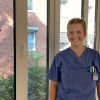
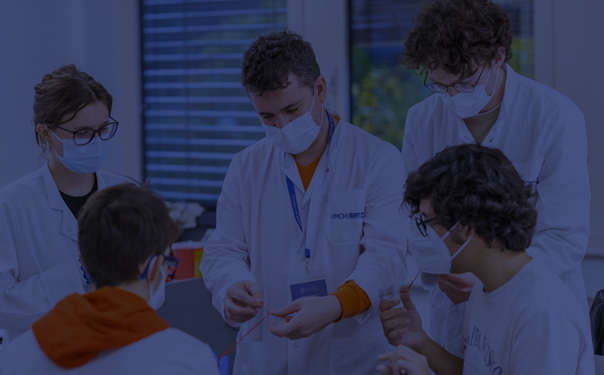
WELCOME TO UMCH
Study Human Medicine in English within 6 years – in Hamburg, Germany
Study Medicine at UMCH
Germany's first international medical program! Discover a state-of-the-art medical education in an international environment. Get informed and apply now!
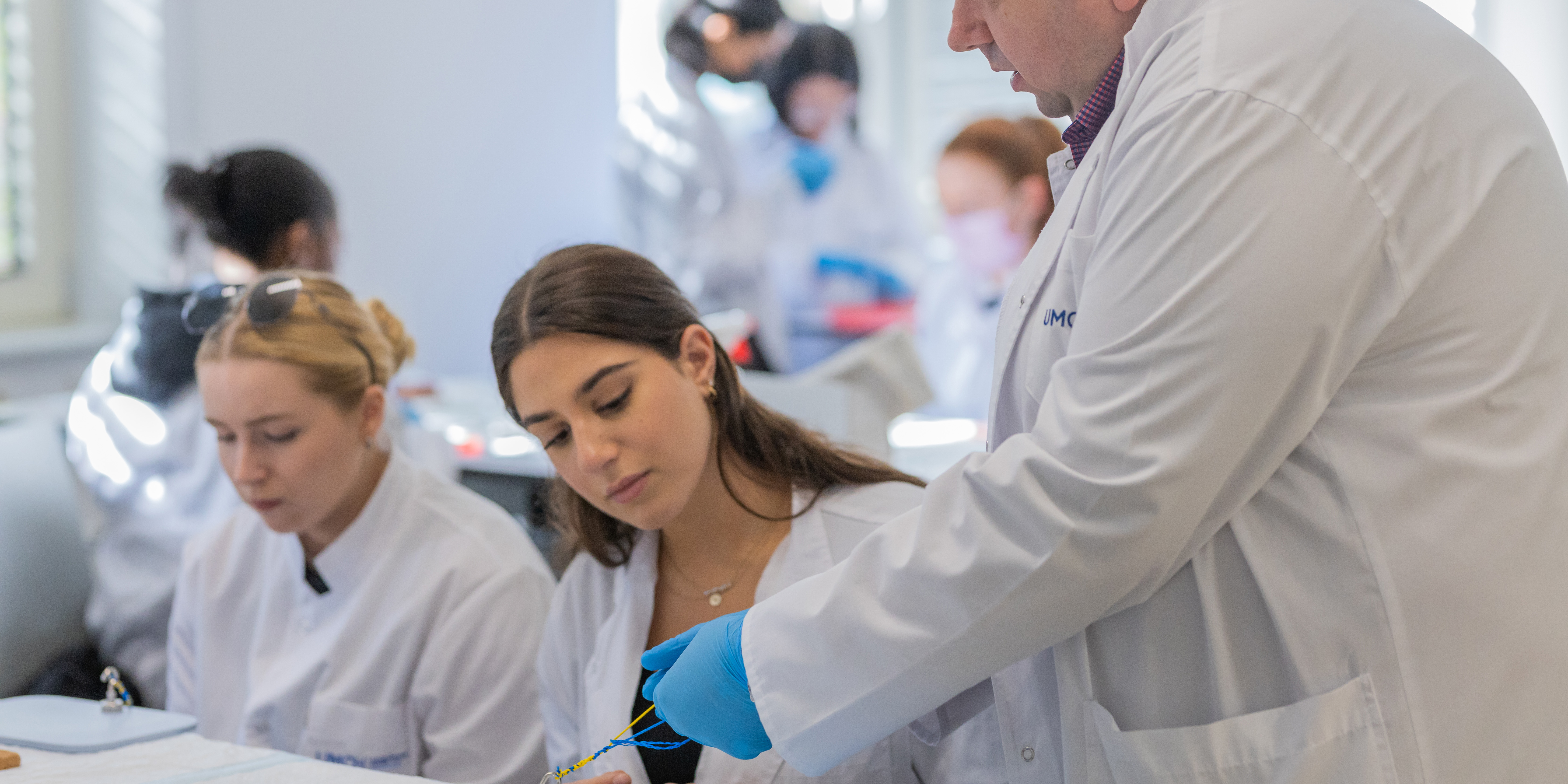
- What does UMCH stand for?
- The University
- Mission Statement
- Medical campus of the future
- Rector’s Welcoming Speech
- Organization & Structure
- Become a Teaching Hospital
- Bad Lippspringe
- Delmenhorst
- Eisenhüttenstadt
- Lüdenscheid
- Marl-Sinsen
- Elche-Alicante
- Hauck-Rohrbach Eye Centers
- University City Hamburg
- Accommodations
- Start of Studies
- Free Public Transport
- Student Clubs
- UMCH Cafeteria
- Counseling Program
- ERASMUS / ERASMUS+
- General Information
- Study Structure
- Accreditation and Recognition
- Online Application
- Information for Transfer Students
- Tuition Fees
- Medical Informatics
- UMCH E-Learning Platform (Canvas)
- ClinicalKey Student (Elsevier)
- News and Events
Medical Foundation Track (3 Weeks)
Medical Foundation Track (12 Weeks)
- Accommodation
- Connections and Accessibility
Admissions Open for September 2024 Intake
Secure your future: apply now, even before high school graduation, inform yourself at no obligation – digitally or live on-site.
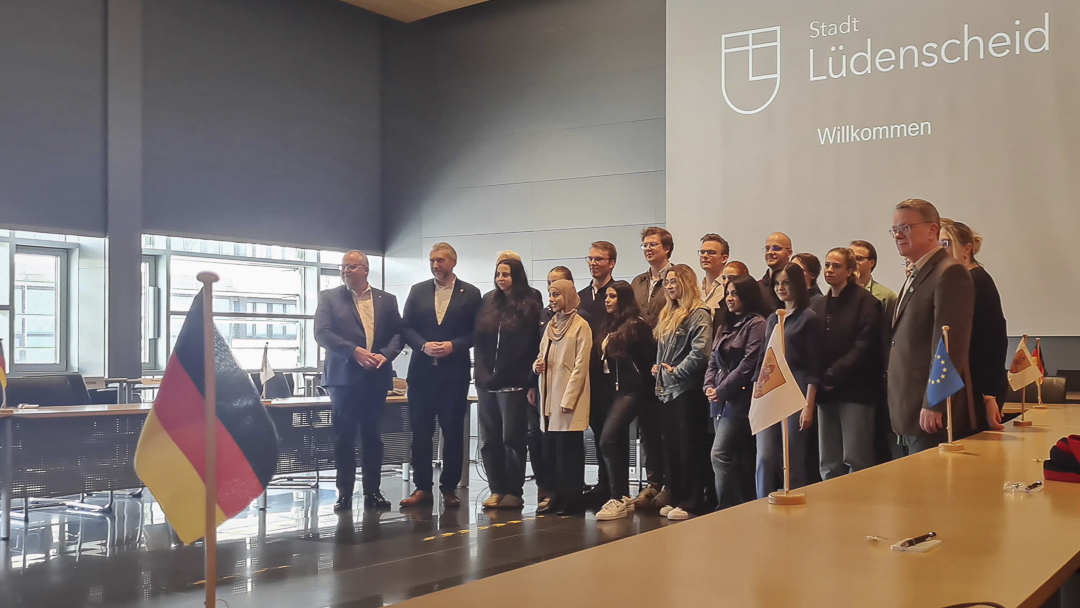
Mayor Sebastian Wagemeyer Extends Warm Welcome to UMCH Students in Lüdenscheid
Preparatory Courses
From 5/13/2024 to 8/2/2024
Duration: 12 weeks Location: Hamburg / Online Incl. preparation for selection interview
From 7/1/2024 to 7/19/2024
Duration: 3 weeks Location: Hamburg / Online
From 9/2/2024 to 9/18/2024
Most popular
- Tuition fees

UMCH Student Advisors
Your contact persons
Dates and Events
Visit info events, lectures, panel discussions and much more..
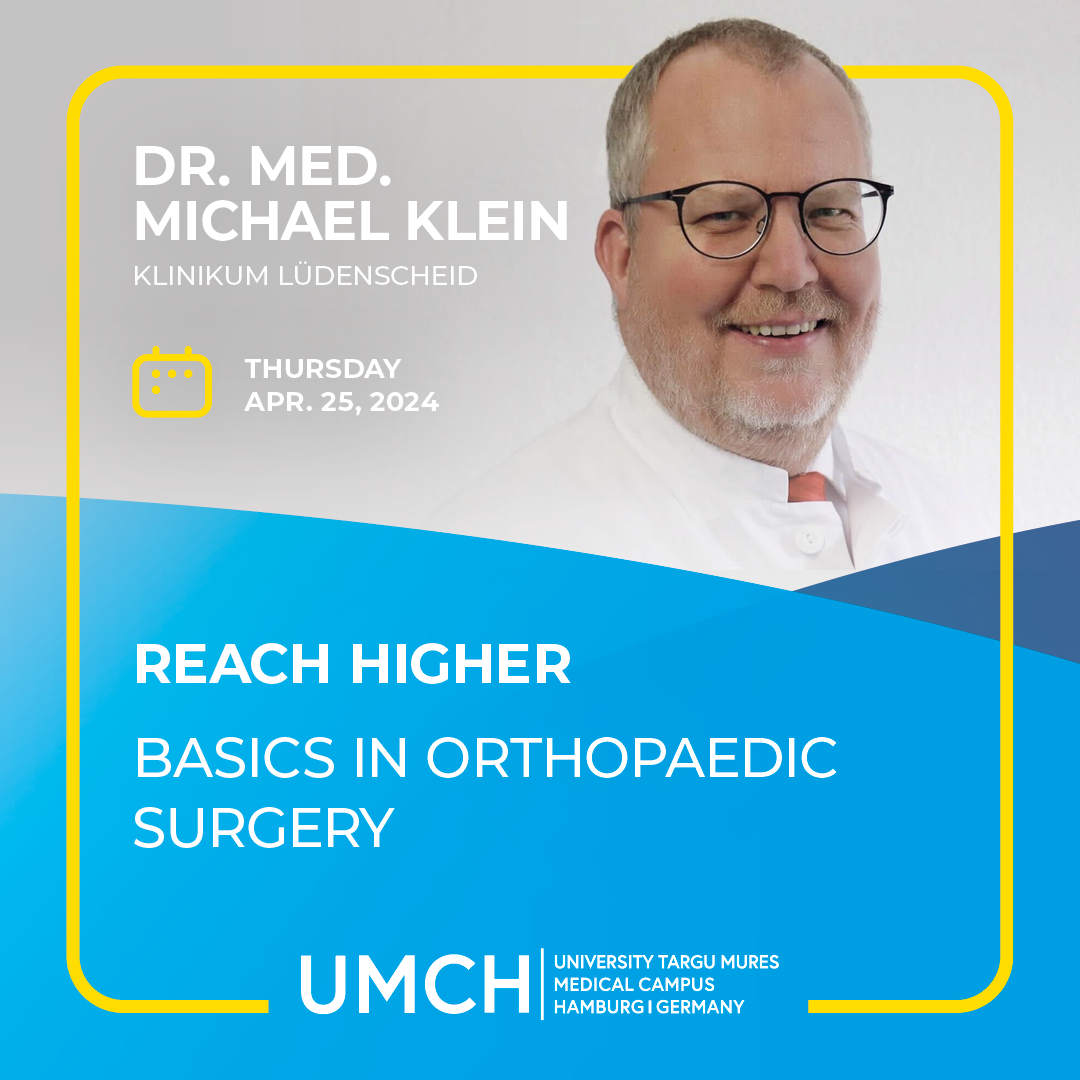
ReachHigher with Dr. med. Michael Klein
Lecture: "Basics in orthopaedic surgery" (Lecture Language: English) On April 25th, Dr. med. Michael Klein will not only guide you through the fascinating history of orthopedic surgery but also impart the fundamental techniques. On April 26th, you will have the opportunity to apply the acquired knowledge directly under his guidance during a workshop. Contents History technique step-by-step practical training physical examination technique step-by-step practical training diagnostis tools X-Ray CT / MRI Ultrasound Doppler / Duplex Shock room management ATLS interprofessional setup technique step-by-step practical training ReachHigher Entertaining, innovative and condensed: At ReachHigher, experts from a network of extraordinary personalities give…
More information
[countdown date=”27 April 2020″ format=”dHMS” hour=”10″ minutes=”00″ link=”false”]
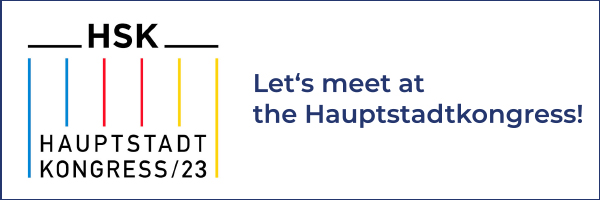
UPCOMING DATES AND EVENTS
Lecture: "Basics in orthopaedic surgery" (Lecture Language: English)…
Workshop “Emergency room treatment in trauma patients” with Dr. med. Michael Klein
On April 26th, the 2nd and 3rd year…
Open Campus Day
Visit us on campus Explore the UMCH Campus…
Online Info Event
We are delighted to extend an invitation to…
Individual consultation appointments in Washington D.C.
With pleasure, we would like to invite you…
Individual consultation appointments in New Orleans
Start of the academic year 2024/25
At UMCH, the Academic Year 2024/25 commences on…
Dear applicants,
Small study groups, teaching in English, clinical training in Germany: this is what distinguishes the accredited medical studies of UMCH in Hamburg!
An intensively supervised and yet independent study. Highly motivated students and lecturers who share their experience and knowledge and work out solutions for better medicine. Excellent infrastructure that encourages scientific exchange.
This is what University Targu Mures Medical Campus Hamburg stands for.
And what do you stand for?

UMCH’s admission procedure
The online application platform for your studies is open to you at any time. As soon as you have uploaded all the necessary application documents there, you will receive an invitation to participate in our admission procedure, which consists of a brief evaluation and a motivation-based interview . Until further notice, you can follow the procedure comfortably and securely via video call from home . Please contact us after uploading your documents and receiving the invitation by UMCH so that we can arrange an individual appointment with you.
You will find all information about the application and the exact procedure of the admission procedure here .
Next admission dates:
Go through the admissions process online now
Inform here
New! Admission dates on Saturdays
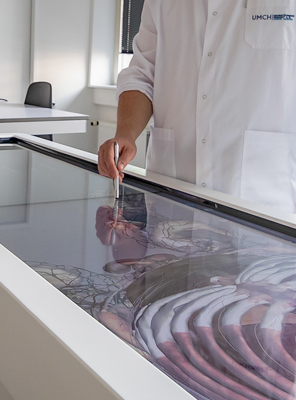
Transfer to UMCH
Have you already started studying medicine at another university? At UMCH you can continue your studies from the 2nd academic year onwards.
UMCH – First English-Speaking Program in Medicine (MBBS) in Germany
All special features summarized.
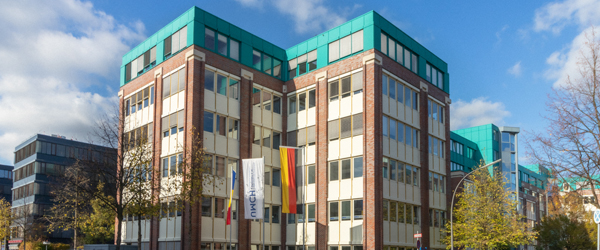
All UMCH news at a glance

UMCH students in their fifth year have embarked on their clinical training at the Märkische Klinikum Lüdenscheid. A significant milestone was achieved as UMCH fifth-year students stepped into the Märkische...
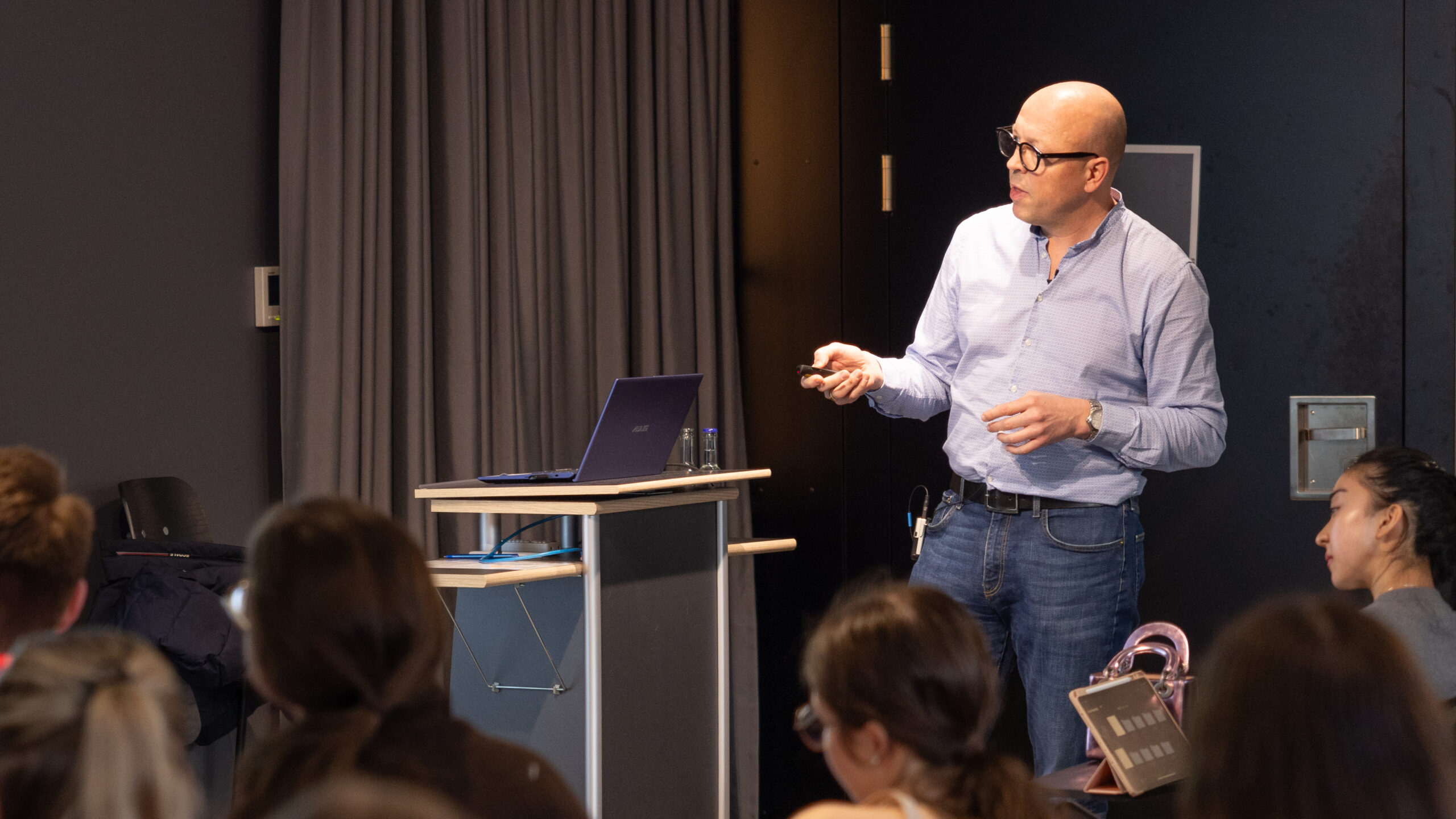
Fascinating Insight: Lecture on "Plastic Surgery in the Interplay between Form and Function" at UMCH Campus
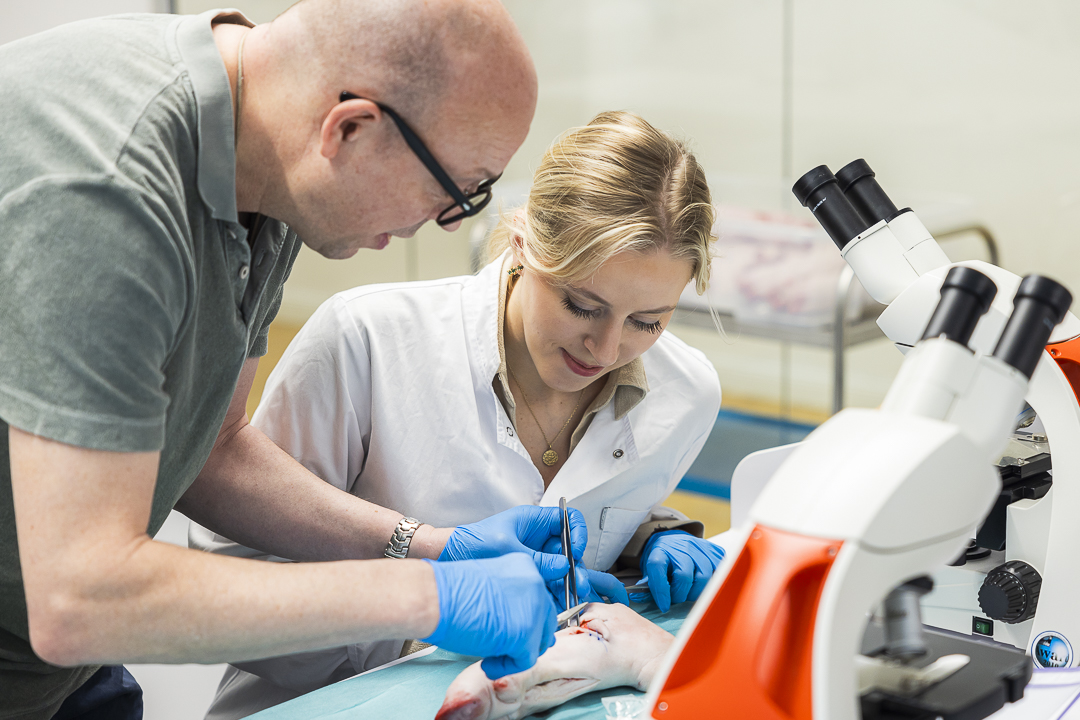
Prof. Meyer-Marcotty from Klinikum Lüdenscheid leads Hands-On Workshop on Surgical Techniques
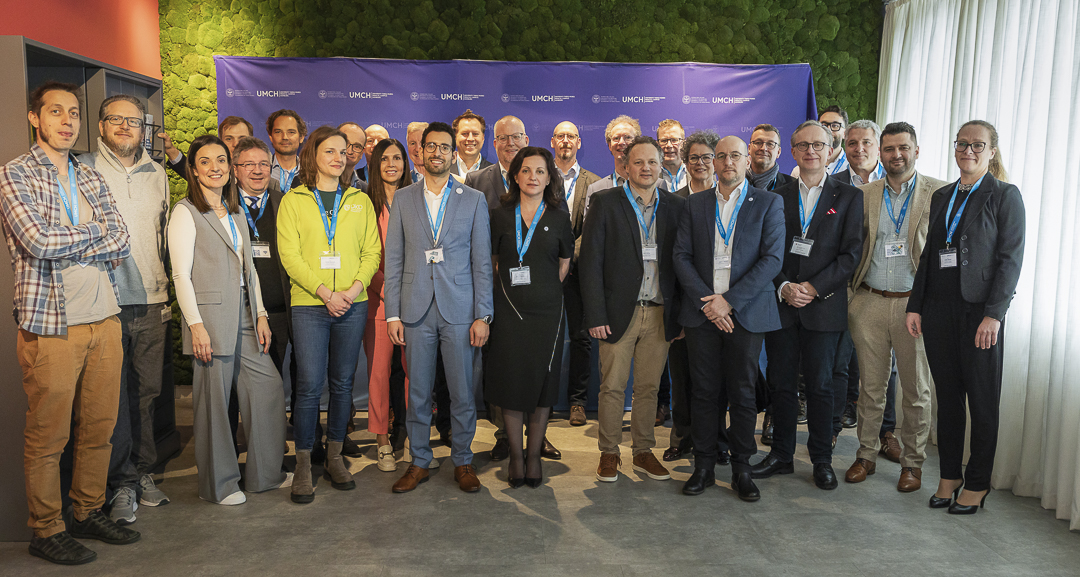
Hospitals from all over Germany present themselves in Hamburg
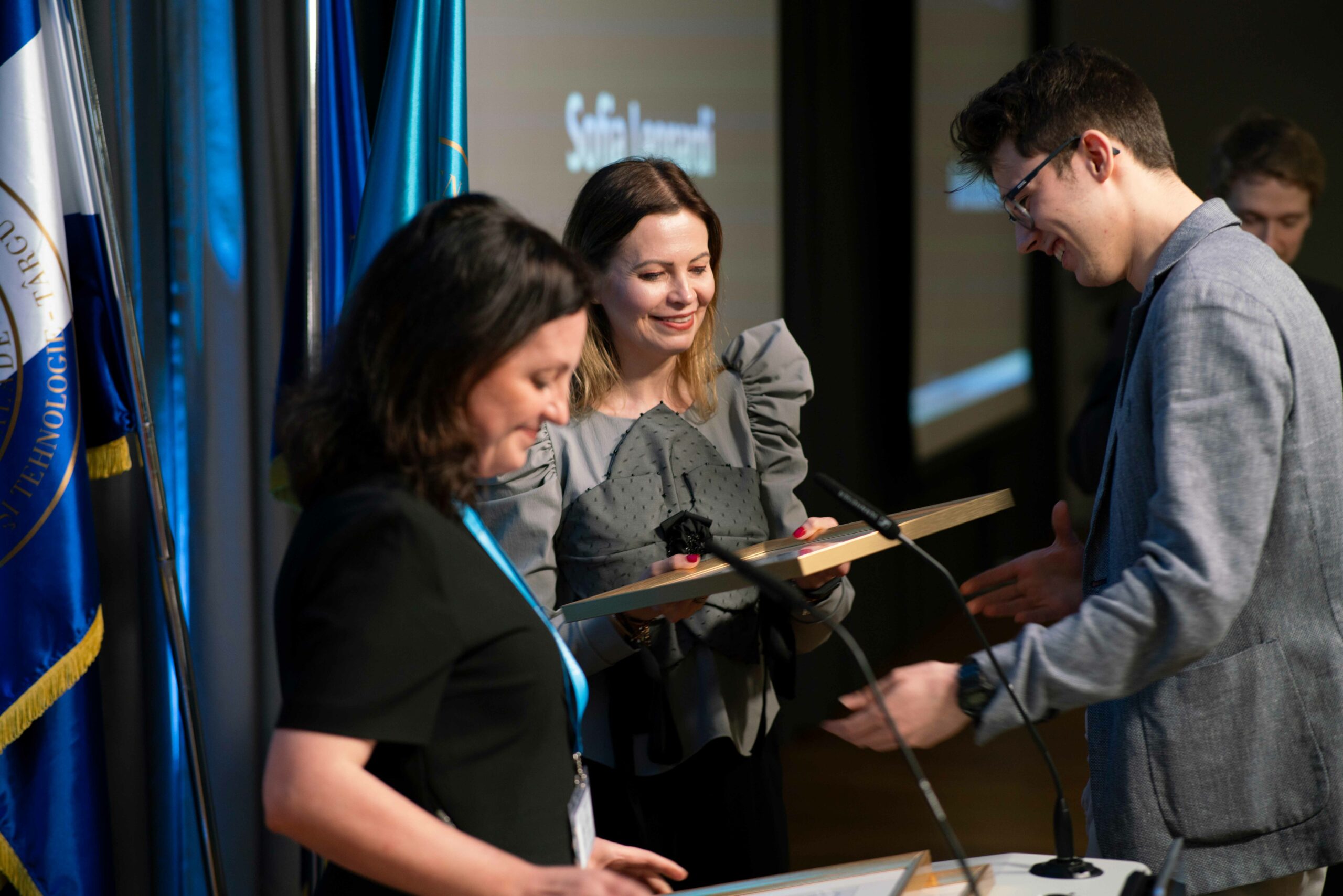
UMFST-UMCH Days 2024: Students Showcase Excellence in Medical Research Hamburg, March 21, 2024
Umfst-umch research, scientific activities.
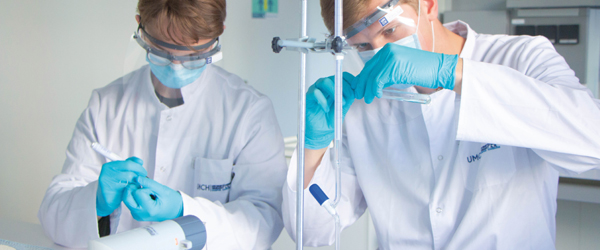
Exciting impressions of the university
Teaching hospital: elisabeth-krankenhaus essen, student insight´s: practical phase at umch & teaching hospitals, teaching hospital: protestant hospital mettmann.

UMFST-UMCH Teaching Hospitals

Are you interested in cooperating with us?
You are already a teaching hospital, academic teaching practice or want to become one we look forward to hearing from you., what are the admission procedures in which countries is the medical license recognized, here you will find all the answers to the most frequently asked questions about studying medicine at umch..

Testimonials from our lecturers
Close guidance and supervision by a prestigious team of professors, research assistants and other experts.
“ Biochemistry is the chemistry of life, as chemical molecules produced in our body can interact and through biochemical processes, can generate the physiological status, feelings ... Assoc. Prof. Amelia Tero-Vescan, PhD Lecturer for BIOCHEMISTRY
“ Only due to the history of anatomy as a subject of science did we as human beings start to understand the functions of our different ... Assoc. Prof. Mircea-Gabriel Muresan, MD, PhD Lecturer for ANATOMY
“ Medical psychology represents a branch of psychology that deals with the application of psychological principles in medical practice. It is particularly concerned with the way in which biological ... Lecturer Cosmin Popa, PhD Lecturer for BEHAVIORAL SCIENCES
“ Medical Informatics is designed to provide future doctors with the tools they need to be successful in a constantly changing and evolving environment. With practical exercises in areas such as natural language ... Lecturer Marian Pop, MD, PhD Lecturer for INFORMATICS
“ I am very impressed with UMFST-UMCH. The interaction between the Hamburg campus and the teaching hospitals provides students with excellent preparation for their future work as medical ... Hon.-Prof. Dr. med. Christian Berg Chief Physician of the Center for Internal Medicine at Mettmann Protestant Hospital
Preparatory courses for your medical studies
UMCH offers different courses, which are subject to a fee and help you get ready for your medical studies.
Medical Foundation Track (3 Weeks):
Our Medical Foundation Track is a 3-week program. It includes the subjects of biology, chemistry and physics. Above all, it serves to consolidate and expand your preexisting knowledge while gaining new skills in these areas. Throughout the course you will acquire a significant amount of scientific information – a basic requirement for medical studies – within a short period of time.
Medical Foundation Track (12 Weeks):
Our 12-week Medical Foundation Track covers not only the natural sciences of biology, chemistry and physics, but also mathematics, biochemistry, anatomy and medical theory. Therefore, the extensive semester also includes topics that are usually not covered at school. As a result, a considerable advantage in knowledge is built up, which will make your starting medical studies immensely easier.
Next courses
Medical foundation track.
Contact us for information on upcoming courses.
Book an online consultation appointment including a virtual campus tour.

- Legal Notice
- Privacy Policy
Cookie Policy
Data protection overview.
Performance cookies are used to understand and analyze the site’s key performance indicators, which helps to provide a better user experience for visitors.
Advertising cookies are used to provide visitors with relevant ads and marketing campaigns. These cookies track visitors across websites and collect information to provide customized ads.
Analytic cookies are used to help us understand how visitors interact with the site. These cookies help to provide information about metrics such as number of visitors, drop-off rate, length of stay, etc.
Any cookies that may not be particularly necessary for the functioning of the website and that are specifically used to collect personal information from users through analysis, ads and other embedded content are referred to as non-essential cookies. It is mandatory to obtain the user’s consent before using these cookies on your website.
Necessary cookies are absolutely necessary for the proper functioning of the website. This category only includes cookies that guarantee basic functionality and security features of the website. These cookies do not store any personal information.
- Walk In Notification

- Global Learning
- Global Investments
- Global Workspace
- Help Center
Connect with us Online!
As we navigate through these challenging times, our primary aim is to service our community and to ensure your safety.
To protect the wellbeing of our student, university, and people community, we introduced a digital infrastructure last year, and we now seamlessly connect with all our communities online!
If you want to connect or to discuss anything related to your Global Ed, Learning, or Mobility journey, you can schedule a meeting with us and all of these bookings will be done virtually now!
Once you've sent us your info, we will send you a link so you can log in for your slot!
Do note that there are no walk-ins at the moment - since we value your safety more than anything else. You can log on to the student portal to connect with us.
10 Best Medical Colleges in Germany for International Students in 2024

Medical colleges in Germany are globally recognized for their excellence in teaching and research. There is a wide range of specializations available to international students, such as public health, biomedicine, and much more. German medical universities offer world-class research facilities and highly experienced faculty. In 2021, the German Medical Association reported a significant boost in foreign doctors working in Germany’s healthcare system to 57,200 – an impressive number that marks a huge shift in medical personnel.
Table of Contents
Why choose to study in medical colleges in Germany?
Are mbbs universities in germany free, what are the best medical universities in germany for international students, how to study medicine in germany.
With a student population totalling nearly three million, the German Academic Exchange Service (DAAD) report reveals that 350,000 of those are international students as of this past winter semester. According to the Wissenschaft Weltoffen 2022 report, Germany currently has the highest number of international students ever, with a staggering 8% increase from the previous year. While there are other countries that also offer great medical education, like Canada and also Australia – which has some top medical college s, Germany is great choice for many reasons.
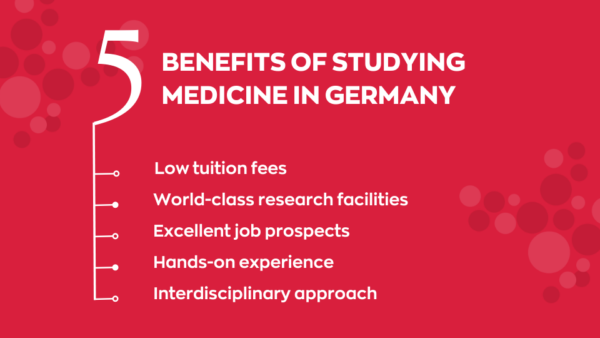
India is one of the major countries for international students. From 2017 to 2018, Indian student enrollment skyrocketed by 65%, now boasting a total of nearly 28,500 scholars.
The 5 key benefits of studying medicine in Germany are
1. Low tuition fees:
Compared to other countries, medical colleges in Germany have comparatively low tuition fees. Public universities offer medical courses free of cost.
2. World-class research facilities:
German medical colleges are considered some of the best research institutions in the world for medicine and healthcare technologies.
3. Excellent job prospects:
Graduates from medical colleges in Germany have excellent job opportunities, both domestically and abroad. The average salary for doctors in Germany is €65,000 /yr.
4. Hands-on experience:
German medical universities use state-of-the-art simulation technology to give students firsthand experience in a hospital setting.
5. Interdisciplinary approach:
Medical colleges in Germany take an interdisciplinary approach to teaching, combining academic theory with practical application.
Of significance to note about medical education in Germany is that bachelor’s and master’s degree programmes are not separated. To become a skilled medical practitioner, you will have to finish a gruelling six-year programme in German — so it’s essential that your language skills are up to the task.
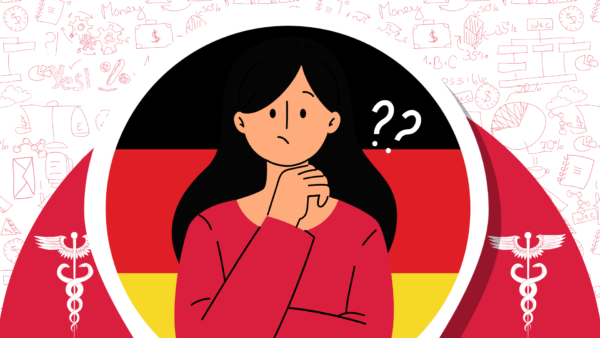
Structure of medical degrees in Germany
After an intensive period of study lasting at least six years and three months, graduates in the field of human medicine may attempt to pass the state examination (Ärztliche Prüfung). Successfully passing this exam will grant them their official Licence to Practice Medicine (Approbation) – a crucial step towards becoming a certified medical professional.
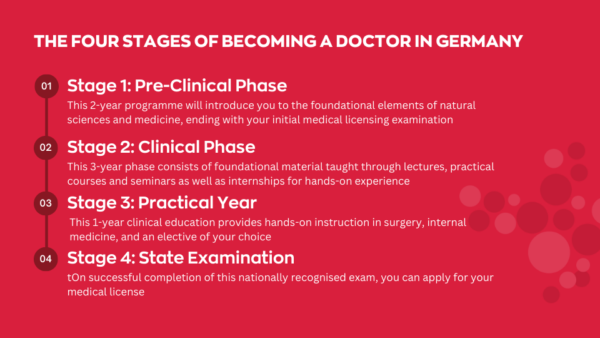
The four stages of becoming a doctor in Germany include
- Stage 1: Pre-Clinical PhaseThis four-semester programme (two years) will introduce you to the foundational elements of natural sciences and medicine, ending with your initial medical licensing examination.
- Stage 2: Clinical PhaseThis phase of study lasts a total of six semesters or three years. It consists of foundational material taught through lectures, practical courses, and seminars as well as internships for hands-on experience.
- Stage 3: Practical Year This one-year clinical education provides hands-on instruction in surgery, internal medicine, and an elective of your choice. It equips you with the essential skills to become a proficient practitioner for future endeavours.
- Stage 4: State ExaminationFinishing your medical degree in Germany requires one more step: acing the State Examination, a nationally recognised test. On successful completion of the test, you can apply for your medical license (Approbation).
Most publicly funded Germany medical colleges offer free tuition for medical programmes. This allows students the opportunity to focus on their studies without worrying about the financial burden of medical colleges in Germany’s tuition fees. Private Germany medical college fees are comparatively higher than public medical colleges but they often offer scholarships to eligible students.
To gain a study visa and attend one of the prestigious Germany medical universities, candidates must prove that they possess sufficient monetary resources to cover the expenses of studying in the country. Applicants are required to have 934 EUR per month or 11,208 EUR annually to cover the costs of tuition and living expenses in Germany.
To receive a student visa and attend one of the Germany MBBS universities, students are required to submit appropriate proof. Parental income statements, evidence of money held in an appropriately blocked account (“Sperrkonto”), or documentation showing the award of an accepted scholarship can be used to prove sufficient funds.
For those studying in Germany medical universities outside of Baden-Württemberg, there is only a nominal fee per semester that covers administrative and enrolment fees. In Germany’s Baden-Württemberg, non-EU students have to pay €3,000 as medical college fees.
As a student, you can anticipate having to spend around €10,200 per year in order to cover the cost of living which includes rent, health insurance, food and other expenses while studying at one of the Germany MBBS universities.

Germany is home to some of the world’s best medical universities, and many offer excellent tuition-free medical programmes for international students. Some of the best German medical universities for international students include:
Please note: The QS Rankings for best medical colleges in Germany 2024 have not been released yet. This table will be updated as soon as the information is available.
1: Universitat Heidelberg
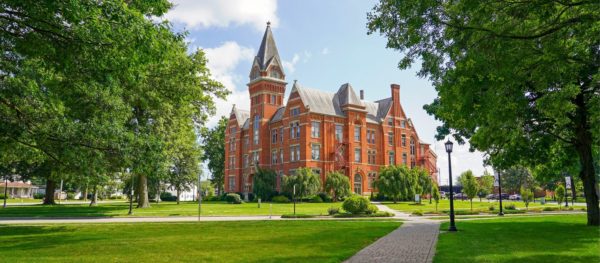
Source: Heidelberg University
Established in 1386, Heidelberg University is an illustrious research institution that provides students with a wide range of courses to choose from. It cultivates a worldwide network of teaching and research collaborations, with 27 institutional partnerships and exchange arrangements connecting them to over 480 universities across the world. This impressive global reach demonstrates this medical university Germany’s commitment to fostering international relationships that facilitate learning, growth and innovation.
Why is it good to study here?
The HeiCuMed (Heidelberger Curriculum Medicinale) programme of study offers students an easily navigable and customisable course that meets their individual requirements. To ensure top-notch education, each semester’s teaching is supplemented with communications training and practice classes known as “SkillsLabs” that allow students to hone their medical investigation and procedure abilities.
Fees & Scholarship options
The fee for the MBBS degree programme is 5,000.00 € / Semester
- Amirana Scholarship
- Scholarships from the Attorney J.B. Göring Foundation
Eligibility and Duration
To apply for this six-year course, students must have a background in physics, chemistry, and biology with excellent school grades. When assessing qualifications from non-German countries, this MBBS university in Germany relies on the evaluation framework of the Central Office for Foreign Education (Zentralstelle für ausländisches Bildungswesen, ZAB).
Courses offered & admission process
To gain admission, prospective medical students can follow the process listed here .
- Health Services Research and Implementation Science in Health System
- International Health
- Interprofessional Health Care
- Medical Biometry/Biostatistics/
- Medical Education
- Medicine (study location Heidelberg)
- Medicine (study location Mannheim)
- Medical Informatics
2: Ludwig-Maximilians University
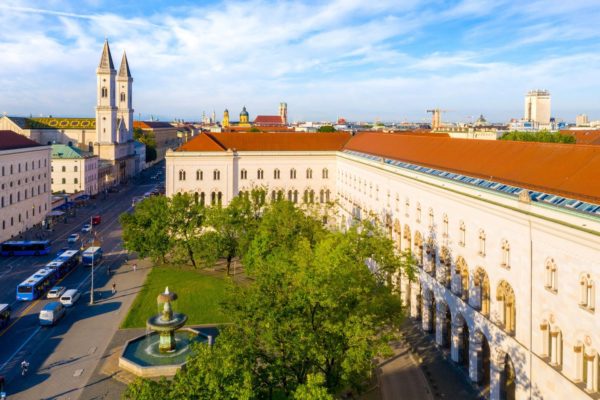
Source: Ludwig-Maximilians
Situated in the heart of Munich, Ludwig-Maximilians-Universität München (LMU) has been a world leader in academia and research since its foundation in 1472. As one of Europe’s most distinguished universities, LMU continues to draw scholars and students from around the globe eager for cutting-edge knowledge that will help them shape our ever-changing world.
By establishing the Medical Curriculum Munich (MeCuM-LMU), LMU’s medical faculty has sought to revolutionize the learning and teaching of medicine. They have a global reputation for excellence in both academics and clinical practice making them one of the best medical colleges in Germany.
Students are not required to pay any fee to pursue a degree in Medicine, Dentistry, Veterinary Medicine, and Pharmacy. However, all students are required to pay a fee of €152.30 for the Studierendenwerk (Munich Student Union) every semester.
Eligibility and Duration
To apply for this six-year course, students must have a background in physics, chemistry, and biology with excellent school grades and a working knowledge of both German and English. This medical university Germany may also require a personal statement, an interview and/or entrance tests.
Possibilities for international applicants are restricted due to the national allocation procedure. To apply to this MBBS university in Germany, students must submit the application to the LMU International Office . The university offers courses in
- Veterinary medicine
3: Technical University of Munich
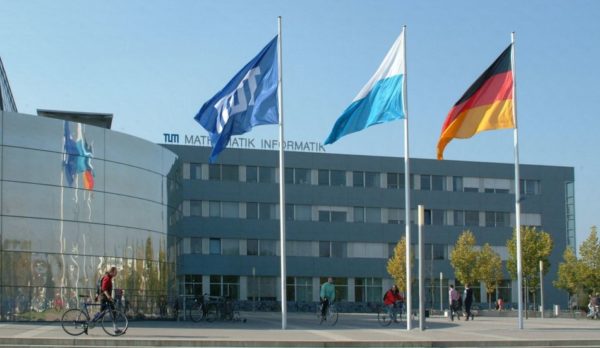
Source: Technical University of Munich
TUM, also known as the Technical University of Munich (Technische Universität München), is one of the most esteemed engineering universities in Germany. Established in 1868 and a member of the renowned group TU9, it has regularly been ranked amongst the top-rated learning facilities in Germany according to QS World University Rankings.
The TUM School of Medicine is a powerhouse for medical research in Germany and its accomplishments have been recognized worldwide making it one of the best universities to study medicine. In tandem with the university hospital, it stands as one of Germany’s foremost locations for life-changing discoveries. TUM School of Medicine fosters a culture of confident collaboration between research, teaching and patient care that yields tangible results.
The semester fee for international students in Munich, Garching and Weihenstephan is €152.30; Straubing is €62.00; and Heilbronn is €92.00. As one of the most acclaimed medical universities in Germany, it offers a remarkable opportunity for international students through the Scholarship Program. This generous one-time grant provides recipients with access to up to €1500 per semester, enabling them to pursue higher education without financial constraints.
The medical course spans 6 years and is taught in German. Excellent command of the language, including reading and writing skills is a must for admission. To apply for the course, students have to demonstrate their academic qualifications with a high school diploma, relevant documents, and proof of German language proficiency.
After completing a pre-clinic training phase in collaboration with the Medical School of Ludwig-Maximilians-Universität München, students are eligible to pursue their clinical study at TUM School of Medicine. For international applicants, the process of applying to LMU begins with a direct application. Those who have yet to go through their federal medical exam should get in touch with LMU for further information and guidance.
- Studies of Human Medicine
- Radiation Biology
- Biomedical Neuroscience
- Medical Life Science and Technology
4: Charité Universitätsmedizin Berlin
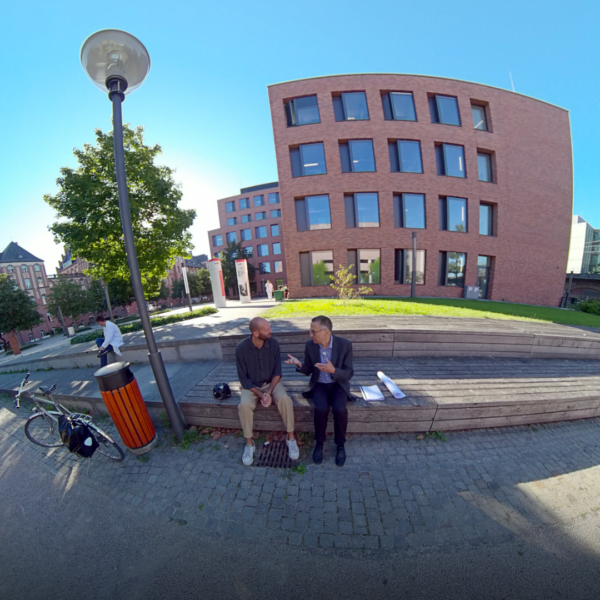
Source: Charité – Universitätsmedizin Berlin
With nearly 9,030 students enrolled in degree courses at Charité – Universitätsmedizin Berlin, the institution is one of the largest medical universities in Germany. Students are trained to provide exemplary care to those seeking medical assistance and partake in research activities designed to propel the healthcare system into a new era.
Charité students have a special chance to get involved in student councils and committees, empowering them to voice their thoughts on the advancement of teaching and learning. Some noteworthy contributions from these initiatives include introducing the Revised Medical Curriculum in 1999 and accommodating new updates with the New Revised Medical Curriculum in 2010.
Since Charité – Universitätsmedizin Berlin is a public university, there are no tuition fees.
The duration of the medical and dentistry courses is 6 years. The eligibility criteria include good grades in math and science, German and English language proficiency level, and excellent communication skills. See here for more.
International prospective students with a higher education entrance qualification have to apply via Uni-Assist e. V. The courses offered include:
- Medicine (state examination)
- Dentistry (state examination)
- Health Care Sciences (BSc, MSc)
- Public Health (MSc)
- Epidemiology (MSc)
- International Health (MSc) – English
- Medical Neurosciences (MSc) – English
- Molecular Medicine (MSc) – English
5: Universität Hamburg
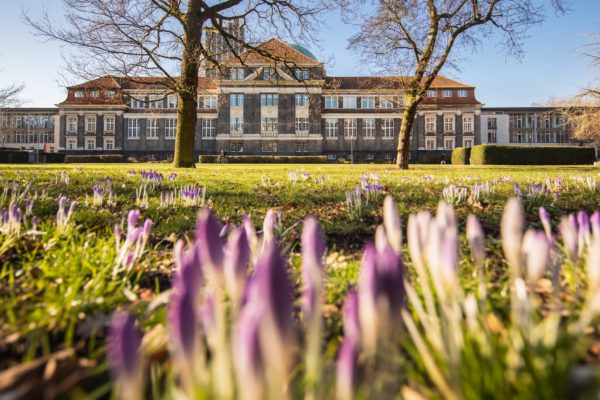
Source: Universität Hamburg
Universität Hamburg stands out among German universities as an institution of excellence, renowned for its groundbreaking research. By fostering collaborative partnerships between academic and external organizations, the university is able to expand upon its knowledge base and provide students with invaluable learning experiences.
The faculty of Medicine at the University of Hamburg has created “Medicine – iMED”, a model learning path focused on scientific methods. This course aims to develop students’ critical thinking, problem-solving and research skills and their capacity to work independently while basing knowledge on evidence-based science. Furthermore, this programme prepares future practitioners by honing practical capabilities and fostering psycho-social competencies.
There are no tuition fees for Medical courses however students are required to pay a semester fee of €339.90.
The course duration for the MBBS course is 6 years and 3 months and the courses are conducted in German.
The university offers degrees in
The selection process for international applicants is based on a bonus point system. The detailed application process can be found here .
6: Eberhard Karls Universität Tübingen
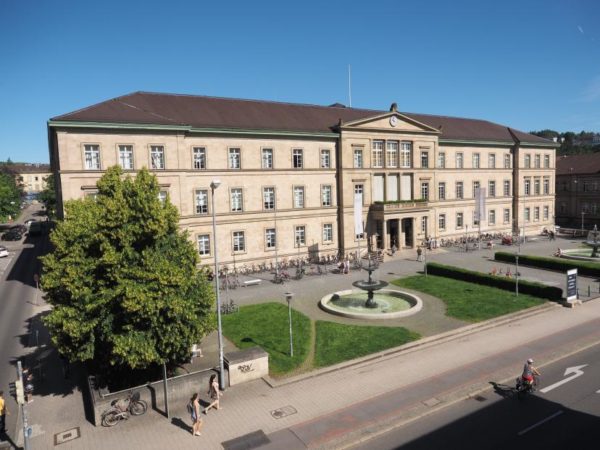
Source: University of Tübingen
With its roots tracing back to 1477, the Eberhard Karls Universität Tübingen is a distinguished research university, renowned across Europe and beyond. It stands as an ideal destination for those seeking outstanding academic studies and pioneering research opportunities.
Established as one of the original four faculties at Eberhard Karls University of Tübingen, the Faculty of Medicine has been a cornerstone of this esteemed German institution since its foundation. Boasting research and teaching area as well as non-clinical facilities, the University Hospital stands out among other medical training and research institutions in Baden-Württemberg due to its size.
International students typically pay a tuition fee of €1,500 per semester and a general semester fee of €158.30. The university offers Deutschlandstipendium scholarships to gifted students.
The duration of the Medizin programme is 13 semesters and the course is conducted in German. To be eligible, students must have a higher education entrance exam qualification, good knowledge of the German language and excellent communication skills. The detailed criteria can be found here.
International applicants who wish to apply for Medicine, Dentistry or Pharmacy courses must apply through the ALMA online portal .
7: Albert-Ludwigs-Universitaet Freiburg

Source: Albert Ludwigs Univeritaet Freiburg
With a distinguished history that dates back to 1457, Albert-Ludwigs-Universitaet Freiburg has solidified itself among the world’s most prestigious institutions. Not only is it highly acclaimed for its teaching and research excellence, but it has also been witness to 23 Nobel laureates who have studied or taught at the university. Its reputation extends further with multiple awards won in national competitions, making this one of the top German universities for MBBS.
The University of Freiburg Faculty of Medicine stands out for its commitment to excellence in medical education. Students benefit from highly innovative teaching plans and can learn in Germany’s most renowned groups of university hospitals. Each student has the ability to grow, learn, and develop in this stimulating environment.
All international students pay a fee of €1,500 in addition to their semester fees of €161 to study MBBS at this college. This medical college provides the Deutschlandstipendium, a national scholarship programme that recognizes and rewards hard-working students.
Before embarking on their studies, international students are afforded the opportunity to take an introductory course in technical language. Students must have a higher education entrance qualification and good knowledge of the German language to be eligible and must fulfill other course requirements.
This medical college offers the following courses:
- Dental Medicine
- Molecular Medicine
- Nursing Science
- Midwifery Science
Interested students can apply online .
8: Goethe-University Frankfurt am Main

Source: Goethe University
Goethe University was established in 1914 as a remarkable “citizen’s university,” changing the face of higher education. It is a world-renowned research university with over 48,000 students. It offers an array of academic programs and interdisciplinary approaches to address difficult issues, as well as diverse groups of research institutes that position it among the most prominent international German universities for MBBS.
Goethe University Frankfurt offers students an innovative and comprehensive medical degree program, providing them with the opportunity to gain knowledge in a variety of areas, including fundamental and clinical medicine. Its research-oriented structure also allows students to explore advanced topics in their field of study.
Presently, the semester fee is around €360 for this MBBS college. Students can apply for the DAAD-Scholarships.
Non-EU applicants must demonstrate successful completion of both their University Entrance Qualification and the TestAS (Test for Academic Studies) in Mathematics, Computer Science and Natural Sciences. This exam is offered exclusively in the German language. The course duration is 6 years.
This German medical university offers courses in Medicine, Dentistry, Biochemistry and Pharmacy. Students can through www.uni-assist.de .
9: Medizinische Hochschule Hannover
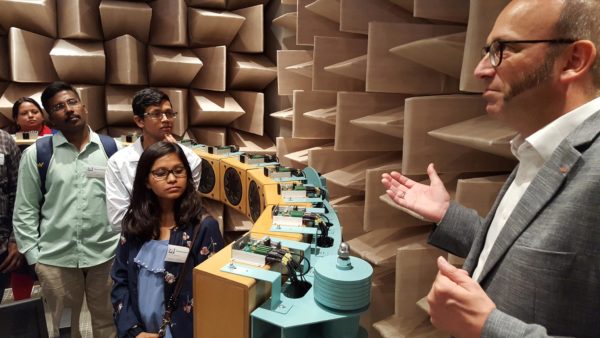
Source: Medizinische Hochschule Hannover
Medizinische Hochschule Hannover (MHH) – more commonly known as Hannover Medical College – is situated in the beautiful state of Hannover and has a strong reputation for being one of Germany’s most distinguished medical schools. Established in 1965, it is an esteemed institution with noteworthy educational and clinical credentials.
The Hannover Medical School is renowned for its exceptional education, research and health care. This German medical university is dedicated to providing interdisciplinary, practical education through academic study and scientific research. At the cutting-edge Skills Lab Hannover (SkilLaH), hopeful medical professionals hone their skills in a range of treatments.
International students are required to pay € 359.61 every semester. There are no scholarships available for medical studies.
The university requires a German language certificate with a proficiency level of A/A+ for all courses and exams in the fields of medicine or dentistry. The duration of the course is 6 years. Students are also required to have excellent academic credentials in science and math.
This medical university in Germany offers courses in the following fields:
- Biochemistry
- Biomedicine
- Biomedical Data Sciences
- European Master of Science in Midwifery
- Infectious Diseases and One Health (IDOH)
- Public Health
Non-EU student can apply through the central application agency UNI-ASSIST .
University #10: Rheinische Friedrich-Wilhelms-Universität Bonn

Source: University of Bonn
Founded in 1818 during the enlightened Age of Reason, the University of Bonn became renowned for its liberal values and emphasis on critical thinking. It is known for its excellence in research and teaching, as well as its commitment to international exchange.
The Human Medicine programme is designed to give students the knowledge and skills they need to become successful physicians, such as diagnostics and treatment of medical conditions. Additionally, it emphasizes the importance of health promotion, disease prevention, and rehabilitation care.
Although the University of Bonn is a public university, all students are still required to pay for their education through the social contribution fee. This mandatory semester fee amounts to 320.11€. Academically gifted students can apply for the Deutschlandstipendium scholarship.
The programme duration is 12 semesters or 6 years. The eligibility criteria are:
- Medical university in Germany entrance qualification
- German language proficiency (DSH level 2, CEFR level C1, as per DSH exam. regulations)
Students can apply online . The courses offered include
- Global Health Risk Management & Hygiene Policies ( M.Sc .)
- Human Medicine (StEx.)
- Medical Immunosciences and Infection ( M.Sc .)
- Midwifery Science, B.Sc .
- Dentistry (St.Ex.)
- Neurosciences ( M.Sc .)
Apart from studying in Germany, you can also look at options of medical colleges in the UK , or other countries like Canada or Australia, in case you find the language in Germany to be an issue. Also, if you’re thinking about country options, you can know more about destinations in our comparative articles – like comparing Canada and Germany etc.

Navigating medical colleges in Germany can be daunting. TC Global’s team of experienced Student Advisors help students in the following ways:
1. Understanding the eligibility criteria
Medical colleges in Germany have very specific eligibility criteria for international students interested in pursuing medicine. The medical field in particular requires a certain academic level of proficiency in science and mathematics. It is important to have the right documents ready during your application process.
2. Researching Germany MBBS Universities
With TC Global’s support, students can narrow down their list of Germany MBBS Universities and courses to fit their personal interests and career goals.
3. Applying for admission and scholarships
The application process for Medicine in Germany is quite intensive and requires students to submit a wide range of documents such as transcripts, letters of recommendation and a statement of purpose. Our advisors help you build a competitive profile with extracurricular activities and language proficiencies that add value to your application. Germany has a range of scholarships available, and we can help you find the best-suited one.
4. Applying for a student visa
We guide you through the student visa process and provide detailed information on the documents required.
5. Finding accommodation
Our experienced team of student advisors can link you to the best accommodation options that suit your budget and needs. TC Global is committed to helping students pursue their dreams of studying Medicine in Germany. Contact our team of student advisors for more information. We would be glad to help you with your journey.
You May Also Like
- Cost of Studying Medicine In The UK
- Best Universities in Germany for Masters
- Best Medical Colleges in the World for International Students
Filed under:
Share the insight.
Popular this week

UK vs Australia: Which is Better for Indian Students in 2024?

Why Study in Australia? Top 10 Reasons For International Students in 2024

Finance Courses in Canada: Best Guide for International Students in 2024
In our series of comparing global ed destinations, we are looking at UK vs Australia in this article. To choose

If “why study in Australia?” has been on your mind, this article is for you. The land down under,

Of the many places where international students can pursue a career in finance, Canada stands out as an ideal destination.

There are many great options when it comes to colleges for masters in Canada, be it colleges to pursue law
No spam, just your favourite topics.
Choose Insight topics that you are interested in to subscribe for your personalized newsletter.
Thanks for contacting us! We will reach you shortly and start our journey together.
- Terms of Service
Privileged and confidential
Terms of Use | August 24 2021
THE CHOPRAS GLOBAL HOLDINGS PTE LTD ("TC GLOBAL") END USER LICENSE AGREEMENT AND TERMS OF USE
PLEASE READ THESE TERMS OF USE CAREFULLY BEFORE USING THE SERVICES OFFERED BY TC GLOBAL. THESE TERMS OF USE SET FORTH THE LEGALLY BINDING TERMS AND CONDITIONS FOR YOUR USE OF THE WEBSITE AT https://tcglobal.com ("THE "SITE") AND THE SERVICES, FEATURES, CONTENT, APPLICATIONS OR WIDGETS OFFERED BY TC GLOBAL ("SERVICE") .
For the purposes of these Terms of Use, "TC Global" shall be deemed to include The Chopras Global Holdings Pte Ltd and/or its affiliates.
Acceptance of Terms
By registering for and/or using the Service in any manner, including but not limited to visiting or browsing the Site, you agree to all of the terms and conditions contained herein ("Terms of Use") and all other operating rules, policies and procedures that may be published from time to time on the Site by TC Global, each of which is incorporated by reference and each of which may be updated by TC Global from time to time without notice to you in accordance with the terms set out under the "Modification of Terms of Use" section below. In addition, some services offered through the Service may be subject to additional terms and conditions specified by TC Global from time to time; your use of such services is subject to those additional terms and conditions, which are incorporated into these Terms of Use by this reference. These Terms of Use apply to all users of the Service, including, without limitation, users who are contributors of content, information, and other materials or services on the Site, individual users of the Service, venues that access the Service, and users that have a page on the Service.
Subject to these Terms of Use, TC Global may offer to provide the Services, as described more fully on the Site, and which are selected by you, solely for your own use, and not for the use or benefit of any third party. Services shall include, but not be limited to, any services TC Global performs for you, any applications or widgets offered by TC Global that you download from the Site or, subject to the terms set out under the "Third party Sites and Services" section below, from third party application stores (eg. App Store, Play Store or Google Apps Marketplace) authorized by TC Global, as well as the offering of any materials displayed or performed on or through the Services (including Content (as defined below)).
Registration and Eligibility
You are required to register with TC Global to browse the Site, view Content and access the Services only and represent, warrant and covenant that you provide TC Global with accurate and complete registration information (including, but not limited to a user name ("User Name") , e-mail address and/or mobile telephone number and a password you will use to access the Service) and to keep your registration information accurate and up-to-date. Failure to do so shall constitute a breach of these Terms of Use, which may result in immediate termination of your TC Global account. We recommend, but do not require, that you use your own name as your User Name so your contacts can recognize you more easily. You shall not:
- Create any account for anyone other than yourself without such person's permission.
- Use a username that is the name of another person with the intent to impersonate that person.
- Use a username or TC Global account that is subject to any rights of a person other than you without appropriate authorization.
- Use a username that is a name that is otherwise offensive, vulgar or obscene or otherwise unlawful.
TC Global reserves the right to refuse registration of, or cancel a User Name at its sole discretion. You are solely responsible and liable for activity that occurs on your account and shall be responsible for maintaining the confidentiality of your TC Global password. You shall never use another user's account without such other user's prior express permission. You will immediately notify TC Global in writing of any unauthorized use of your account, or other account related security breach of which you are aware.
You represent and warrant that if you are an individual, you are of legal age to form a binding contract, or that if you are registering on behalf of an entity or a minor, that you are lawfully authorized to enter into, and bind the entity or yourself (as the legal guardian of the minor) to, these Terms of Use and register for the Service. The Service is not available to individuals who are younger than 10 years old. TC Global may, in its sole discretion, refuse to offer the Service to any person or entity and change its eligibility criteria at any time.
You are solely responsible for ensuring that these Terms of Use are in compliance with all laws, rules and regulations applicable to you and the right to access the Service is revoked where these Terms of Use or use of the Service is prohibited and, in such circumstances, you agree not to use or access the Site or Services in any way.
If you use a mobile device, please be aware that your carrier's normal rates and fees, such as text messaging and data charges, will still apply. In the event you change or deactivate your mobile telephone number, you agree that you will update your account information on the Services within 48 hours to ensure that your messages are not sent to the person who acquires your old number.
All Content, whether publicly posted or privately transmitted, is the sole responsibility of the person who originated such Content. TC Global cannot guarantee the authenticity of any Content or data which users may provide about themselves. You acknowledge that all Content accessed by you using the Service is at your own risk and you will be solely responsible and liable for any damage or loss to you or any other party resulting therefrom. For purposes of these Terms of Use, the term "Content" includes, without limitation, any location information, video clips, audio clips, responses, information, data, text, photographs, software, scripts, graphics, and interactive features generated, provided, or otherwise made accessible by TC Global on or through the Service. Content added, created, uploaded, submitted, distributed, posted or otherwise obtained through the Service by users, including Content that is added to the Service in connection with users linking their accounts to third party websites and services, is collectively referred to as, "User Submissions" .
TC Global Content
The Service contains Content specifically provided by TC Global or its partners and such Content is protected by copyrights, trademarks, service marks, patents, trade secrets or other proprietary rights and laws, as applicable. You shall abide by and maintain all copyright notices, information, and restrictions contained in any Content accessed through the Service.
Subject to these Terms of Use, TC Global grants each user of the Site and/or Service a worldwide, non-exclusive, non-sub licensable and non-transferable license to use, modify and reproduce the Content, solely for personal, non-commercial use. Use, reproduction, modification, distribution or storage of any Content for other than personal, non-commercial use is expressly prohibited without prior written permission from TC Global, or from the copyright holder identified in such Content's copyright notice, as applicable. You shall not sell, license, rent, or otherwise use or exploit any Content for commercial (whether or not for profit) use or in any way that violates any third party right.
User Submissions
We may use your User Submissions in a number of different ways in connection with the Site, Service and TC Global's business as TC Global may determine in its sole discretion, including but not limited to, publicly displaying it, reformatting it, incorporating it into marketing materials, advertisements and other works, creating derivative works from it, promoting it, distributing it, and allowing other users to do the same in connection with their own websites, media platforms, and applications ("Third Party Media") . By submitting User Submissions on the Site or otherwise through the Service, you hereby do and shall grant TC Global a worldwide, non- exclusive, royalty-free, fully paid, sub licensable and transferable license to use, copy, edit, modify, reproduce, distribute, prepare derivative works of, display, perform, and otherwise fully exploit the User Submissions in connection with the Site, the Service and TC Global's (and its successors and assigns') business, including without limitation for promoting and redistributing part or all of the Site (and derivative works thereof) or the Service in any media formats and through any media channels (including, without limitation, third party websites and feeds). You also hereby do and shall grant each user of the Site and/or the Service, including Third Party Media, a non-exclusive license to access your User Submissions through the Site and the Service, and to use, edit, modify, reproduce, distribute, prepare derivative works of, display and perform such User Submissions in connection with their use of the Site, Service and Third Party Media. For clarity, the foregoing license grant to TC Global does not affect your other ownership or license rights in your User Submission(s), including the right to grant additional licenses to the material in your User Submission(s), unless otherwise agreed in writing with TC Global.
You represent and warrant that you have all rights to grant such license to us without infringement or violation of any third party rights, including without limitation, any privacy rights, publicity rights, copyrights, contract rights, or any other intellectual property or proprietary rights.
You understand that all information publicly posted or privately transmitted through the Site is the sole responsibility of the person from whom such Content originated; that TC Global will not be liable for any errors or omissions in any Content; and that TC Global cannot guarantee the identity of any other users with whom you may interact in the course of using the Service.
You should be aware that the opinions expressed in the Content in User Submissions are theirs alone and do not reflect the opinions of TC Global. TC Global is not responsible for the accuracy of any of the information supplied in User Submissions or in relation to any comments that are posted.
You should bear in mind that circumstances change and that information that may have been accurate at the time of posting will not necessarily remain so.
When you delete your User Submissions, they will be removed from the Service. However, you understand that any removed User Submissions may persist in backup copies for a reasonable period of time (but following removal will not be shared with others) or may remain with users who have previously accessed or downloaded your User Submissions.
Rules and Conduct
As a condition of use, you promise not to use the Service for any purpose that is prohibited by these Terms of Use. You are responsible for all of your activity in connection with the Service.
Additionally, you shall abide by all applicable local, state, national and international laws and regulations and, if you represent a business, any advertising, marketing, privacy, or other self-regulatory code(s) applicable to your industry.
By way of example, and not as a limitation, you shall not (and shall not permit any third party to) either (a)take any action or (b)upload, download, post, submit or otherwise distribute or facilitate distribution of any Content on or through the Service, including without limitation any User Submission, that:
- belongs to another person and to which the user does not have any right;
- is defamatory, obscene, pornographic, pedophilic, invasive of another's privacy, including bodily privacy, insulting or harassing on the basis of gender, libelous, racially or ethnically objectionable, relating or encouraging money laundering or gambling, or otherwise inconsistent with or contrary to the laws in force;
- is harmful to a minor;
- infringes any patent, trademark, copyright or other proprietary rights;
- violates any law for the time being in force;
- deceives or misleads the addressee about the origin of the message or knowingly and intentionally communicates any information which is patently false or misleading in nature but may reasonably be perceived as a fact;
- impersonates another person;
- threatens the unity, integrity, defence, security or sovereignty of India, friendly relations with foreign states, or public order, or causes incitement to the commission of any cognizable offence or prevents investigation of any offence or is insulting other nation;
- contains software virus or any other computer code, file or program designed to interrupt, destroy or limit the functionality of any computer resource;
- is patently false and untrue, and is written or published in any form, with the intent to mislead or harass a person, entity or agency for financial gain or to cause any injury to any person.
Additionally, you agree not to:
- contact anyone who has asked not to be contacted, or makes unsolicited contact with anyone for any commercial purpose, specifically, contact any user to post an advertisement on a third party website or post any advertisement on behalf of such user; or to "stalk" or otherwise harass anyone;
- make any libelous or defamatory comments or postings to or against anyone;
- collect personal data about other users or entities for commercial or unlawful purposes;
- use automated means, including spiders, robots, crawlers, data mining tools, or the like to download or scrape data from the Site, except for internet search engines (eg. Google) and non-commercial public archives (e.g. archive.org) that comply with our robots.txt file;
- post Content that is outside the local area or not relevant to the local area, repeatedly post the same or similar Content, or otherwise impose unreasonable or disproportionately large loads on our servers and other infrastructure;
- attempt to gain unauthorized access to computer systems owned or controlled by TC Global or engage in any activity that disrupts, diminishes the quality of, interferes with the performance of, or impairs the functionality of, the Service or the Site.
- use any automated device or software that enables the submission of automatic postings on TC Global without human intervention or authorship (an "automated posting device" ), including without limitation, the use of any such automated posting device in connection with bulk postings, or for automatic submission of postings at certain times or intervals; or
- Any Content uploaded by you shall be subject to relevant laws and may disabled, or and may be subject to investigation under appropriate laws. Furthermore, if you are found to be in non-compliance with the laws and regulations, these terms, or the privacy policy of the Site, we may terminate your account/block your access to the Site and we reserve the right to remove any non-compliant Content uploaded by you.
TC Global does not guarantee that any Content or User Submissions (as defined above) will be made available on the Site or through the Service. TC Global has no obligation to monitor the Site, Service, Content, or User Submissions. However, TC Global reserves the right to (i) remove, suspend, edit or modify any Content in its sole discretion, including without limitation any User Submissions at any time, without notice to you and for any reason (including, but not limited to, upon receipt of claims or allegations from third parties or authorities relating to such Content or if TC Global is concerned that you may have violated these Terms of Use), or for no reason at all and (ii) to remove, suspend or block any User Submissions from the Service. TC Global also reserves the right to access, read, preserve, and disclose any information as TC Global reasonably believes is necessary to (i) satisfy any applicable law, regulation, legal process or governmental request, (ii) enforce these Terms of Use, including investigation of potential violations hereof, (iii) detect, prevent, or otherwise address fraud, security or technical issues, (iv) respond to user support requests, or (v) protect the rights, property or safety of TC Global, its users and the public.
Technical Failures
It is possible that you may face disruptions, including, but not limited to errors, disconnections or interferences in communication in the internet services, software or hardware that you have used to avail our Service. TC Global is not responsible for such factors in the disruption or interruption in the Service and you take full responsibility with complete knowledge for any risk of loss or damages caused due to interruption of services for any such reasons.
Advertisements, Third Party Sites and Services
Some of the TC Global Services are supported by advertising revenue and may display advertisements, promotions, and links to third-party websites. You hereby agree that TC Global may place such advertising and promotions on the TC Global Services or on, about, or in conjunction with your Content. The manner, mode and extent of such advertising and promotions are subject to change without specific notice to you.
The Service may permit you to link to other websites, services or resources on the Internet, and other websites, services or resources may contain links to the Site. When you access third party websites, you do so at your own risk. These other websites are not under TC Global's control, and you acknowledge that TC Global is not responsible or liable for the content, functions, accuracy, legality, appropriateness or any other aspect of such websites or resources. The inclusion of any such link does not imply endorsement by TC Global or any association with its operators. You further acknowledge and agree that TC Global shall not be responsible or liable, directly or indirectly, for any damage or loss caused or alleged to be caused by or in connection with the use of or reliance on any such Content, goods or services available on or through any such website or resource.
Termination
TC Global may terminate your access to all or any part of the Service at any time, with or without cause, with or without notice, effective immediately, which may result in the forfeiture and destruction of all information associated with your membership. If you wish to terminate your account, you may do so by contacting us at [email protected] till we develop the procedure on the website and apps. Any fees paid hereunder are non-refundable. All provisions of these Terms of Use which by their nature should survive termination shall survive termination, including, without limitation, ownership provisions, warranty disclaimers, indemnity and limitations of liability.
Warranty Disclaimer
Save to the extent required by law, TC Global has no special relationship with or fiduciary duty to you. You acknowledge that TC Global has no control over, and no duty to take any action regarding: which users gain access to the Service; what Content you access via the Service; what effects the Content may have on you; how you may interpret or use the Content; or what actions you may take as a result of having been exposed to the Content.
You release TC Global from all liability for you having acquired or not acquired Content through the Service. The Service may contain, or direct you to websites containing, information that some people may find offensive or inappropriate. TC Global makes no representations concerning any Content contained in or accessed through the Service, and TC Global will not be responsible or liable for the accuracy, copyright compliance, legality or decency of material contained in or accessed through the Service and cannot be held liable for any third-party claims, losses or damages.
You release us from all liability relating to your connections and relationships with other users. You understand that we do not, in any way, screen users, nor do we inquire into the backgrounds of users or attempt to verify their backgrounds or statements. We make no representations or warranties as to the conduct of users or the veracity of any information users provide. In no event shall we be liable for any damages whatsoever, whether direct, indirect, general, special, compensatory, consequential, and/or incidental, arising out of or relating to the conduct of you or anyone else in connection with the Services, including, without limitation, bodily injury, emotional distress, and any damages resulting in any way from communications or meetings with users or persons you may otherwise meet through the Services. As such, you agree to take reasonable precautions and exercise the utmost personal care in all interactions with any individual you come into contact with through the Service, particularly if you decide to meet such individuals in person. For example, you should not, under any circumstances, provide your financial information (e.g., credit card or bank account numbers) to other individuals.
THE SITE, SERVICE AND CONTENT ARE PROVIDED "AS IS", "AS AVAILABLE" AND ARE PROVIDED WITHOUT ANY REPRESENTATIONS OR WARRANTIES OF ANY KIND, EXPRESS OR IMPLIED, INCLUDING, BUT NOT LIMITED TO, THE IMPLIED WARRANTIES OF TITLE, NONINFRINGEMENT, MERCHANTABILITY AND FITNESS FOR A PARTICULAR PURPOSE, AND ANY WARRANTIES IMPLIED BY ANY COURSE OF PERFORMANCE OR USAGE OF TRADE, ALL OF WHICH ARE EXPRESSLY DISCLAIMED, SAVE TO THE EXTENT REQUIRED BY LAW.
TC GLOBAL, AND ITS AFFILIATES, TEAM, DIRECTORS, EMPLOYEES, AGENTS, REPRESENTATIVES, SUPPLIERS, PARTNERS AND CONTENT PROVIDERS DO NOT WARRANT THAT: (A) THE SERVICE WILL BE SECURE OR AVAILABLE AT ANY PARTICULAR TIME OR LOCATION; (B) ANY DEFECTS OR ERRORS WILL BE CORRECTED; (C) ANY CONTENT OR SOFTWARE AVAILABLE AT OR THROUGH THE SERVICE IS FREE OF VIRUSES OR OTHER HARMFUL COMPONENTS; OR (D) THE RESULTS OF USING THE SERVICE WILL MEET YOUR REQUIREMENTS. YOUR USE OF THE WEBSITE, SERVICE AND CONTENT IS SOLELY AT YOUR OWN RISK. SOME STATES / COUNTRIES DO NOT ALLOW LIMITATIONS ON IMPLIED WARRANTIES, SO THE ABOVE LIMITATIONS MAY NOT APPLY TO YOU.
Indemnification
You shall defend, indemnify, and hold harmless TC Global, its affiliates and each of its and its affiliates' employees, contractors, directors, suppliers and representatives from all losses, costs, actions, claims, damages, expenses (including reasonable legal costs) or liabilities, that arise from or relate to your use or misuse of, or access to, the Site, Service, Content or otherwise from your User Submissions, violation of these Terms of Use, or infringement by you, or any third party using the your account, of any intellectual property or other right of any person or entity (save to the extent that a court of competent jurisdiction holds that such claim arose due to an act or omission of TC Global). TC Global reserves the right to assume the exclusive defense and control of any matter otherwise subject to indemnification by you, in which event you will assist and cooperate with TC Global in asserting any available defenses.
Limitation of Liability
ALL LIABILITY OF TC GLOBAL, ITS AFFILIATES, DIRECTORS, EMPLOYEES, AGENTS, REPRESENTATIVES, PARTNERS, SUPPLIERS OR CONTENT PROVIDERS HOWSOEVER ARISING FOR ANY LOSS SUFFERED AS A RESULT OF YOUR USE OF THE SITE, SERVICE, CONTENT OR USER SUBMISSIONS IS EXPRESSLY EXCLUDED TO THE FULLEST EXTENT PERMITTED BY LAW, SAVE THAT, IF A COURT OF COMPETENT JURISDICTION DETERMINES THAT LIABILITY OF TC GLOBAL, ITS DIRECTORS, EMPLOYEES, AGENTS, REPRESENTATIVES, PARTNERS, SUPPLIERS OR CONTENT PROVIDERS (AS APPLICABLE) HAS ARISEN, THE TOTAL OF SUCH LIABILITY SHALL BE LIMITED IN AGGREGATE TO THE VALUE OF TC GLOBAL'S SERVICES AVAILED BY THE USER FOR 12 MONTHS PRIOR TO THE INITIATION OF A CLAIM.
TO THE MAXIMUM EXTENT PERMITTED BY APPLICABLE LAW, IN NO EVENT SHALL TC GLOBAL, NOR ITS DIRECTORS, EMPLOYEES, AGENTS, REPRESENTATIVES, PARTNERS, SUPPLIERS OR CONTENT PROVIDERS, BE LIABLE UNDER CONTRACT, TORT, STRICT LIABILITY, NEGLIGENCE OR ANY OTHER LEGAL OR EQUITABLE THEORY OR OTHERWISE (AND WHETHER OR NOT TC GLOBAL, ITS DIRECTORS, EMPLOYEES, AGENTS, REPRESENTATIVES, PARTNERS, SUPPLIERS OR CONTENT PROVIDERS HAD PRIOR KNOWLEDGE OF THE CIRCUMSTANCES GIVING RISE TO SUCH LOSS OR DAMAGE) WITH RESPECT TO THE SITE, SERVICE, CONTENT OR USER SUBMISSIONS FOR:
- INDIRECT OR CONSEQUENTIAL LOSSES OR DAMAGES;
- LOSS OF ACTUAL OR ANTICIPATED PROFITS;
- LOSS OF REVENUE;
- LOSS OF GOODWILL;
- LOSS OF DATA;
- LOSS OF ANTICIPATED SAVINGS;
- WASTED EXPENDITURE; OR
- COST OF PROCUREMENT OF SUBSTITUE GOODS OR SERVICES.
NOTHING IN THESE TERMS OF USE SHALL BE DEEMED TO EXCLUDE OR LIMIT YOUR LIABILITY IN RESPECT OF ANY INDEMNITY GIVEN BY YOU UNDER THESE TERMS OF USE. APPLICABLE LAW MAY NOT ALLOW THE LIMITATION OR EXCLUSION OF LIABILITY OR INCIDENTAL OR CONSEQUENTIAL DAMAGES, SO THE ABOVE LIMITATION OR EXCLUSION MAY NOT APPLY TO YOU. IN SUCH CASES, TC GLOBAL'S LIABILITY WILL BE LIMITED TO THE FULLEST EXTENT PERMITTED BY APPLICABLE LAW.
Governing Law
A printed version of these Terms of Use and of any notice given in electronic form shall be admissible in judicial or administrative proceedings based upon or relating to these Terms of Use to the same extent and subject to the same conditions as other business documents and records originally generated and maintained in printed form. You and TC Global agree that any cause of action arising out of or related to the Service must commence within one (1) year after the cause of action arose; otherwise, such cause of action is permanently barred.
Terms of Use and all other policies available on this Service shall be interpreted and construed in accordance with the laws of India. Any dispute arising out of or in connection with these Terms of Use and/ or other policies available on this App, including any question regarding its existence, validity or termination, shall be referred to and finally resolved by arbitration administered by the Singapore International Arbitration Centre ("SIAC") in accordance with the Arbitration Rules of the Singapore International Arbitration Centre ("SIAC Rules") for the time being in force, which rules are deemed to be incorporated by reference in this clause. The Tribunal shall consist of 3 arbitrators. The seat and venue of Arbitration shall be Singapore and the language of proceedings shall be English. Subject to the foregoing, the Courts of Singapore shall have exclusive jurisdiction over any disputes relating to the subject matter, herein.
Notwithstanding the foregoing, if a dispute arises with respect to the validity, scope, enforceability, inventorship, ownership, infringement, breach or unauthorised use of any patent, trademark, copyright or other intellectual property right or any non-proprietary data owned and/or controlled by TC Global, whether or not arising from the Terms of Use, such dispute (at the option of TC Global) shall not be submitted to arbitration and instead, TC Global shall be free to initiate litigation, including but not limited to a claim for interim injunctive relief, in a court of competent jurisdiction, in any country or other jurisdiction in which such rights apply.
Integration and Severability
These Terms of Use are the entire agreement between you and TC Global with respect to the Service and use of the Site, Service, Content or User Submissions, and supersede all prior or contemporaneous communications and proposals (whether oral, written or electronic) between you and TC Global with respect to the Site. If any provision of these Terms of Use is found to be unenforceable or invalid, that provision will be limited or eliminated to the minimum extent necessary so that these Terms of Use will otherwise remain in full force and effect and enforceable. The failure of either party to exercise in any respect any right provided for herein shall not be deemed a waiver of any further rights hereunder. Waiver of compliance in any particular instance does not mean that we will waive compliance in the future. In order for any waiver of compliance with these Terms of Use to be binding, TC Global must provide you with written notice of such waiver through one of its authorized representatives.
Modification of Terms of Use
TC Global reserves the right, at its sole discretion, to modify or replace any of these Terms of Use, or change, suspend, or discontinue the Service (including without limitation, the availability of any feature, database, or content) at any time by posting a notice on the Site or by sending you notice through the Service or via email. TC Global may also impose limits on certain features and services or restrict your access to parts or all of the Service without notice or liability. It is your responsibility to check these Terms of Use periodically for changes. Your continued use of the Service following the posting of any changes to these Terms of Use constitutes acceptance of those changes. You shall also be notified of any modifications to these Terms of Use as and when effected or at least once a year.
Other Provisions
Claims of Copyright or Trademark Infringement
Claims of copyright or trademark infringement should be sent to TC Global's designated agent. If you believe that someone is infringing your copyright or trademark rights on the Site, you can report it to us by contacting our designated agent at [email protected] with a report containing the following information:
- your complete contact information (name, mailing address and phone number),
- a detailed description of the Content that you claim infringes your copyright or trademark along with details on how it infringes upon your copyright or trademark,
- the web address (URL) of the infringing content,
- a declaration that you are filing this report in good faith and that all the information provided is accurate and that you are the owner of the copyright and/or trademark in question.
Please attach your digital signature or physical signature to the report.
Within 36 hours of receiving this notice with the above mentioned details, we will take down the allegedly infringing material from public view while we assess the issues identified in your notice.
On completion of the take-down procedure above:
- If the complainant is successful in obtaining an order of injunction from a court of competent jurisdiction within 21 days from filing the complaint, the material will be permanently removed from TC Global's Site and database upon TC Global being provided with a copy of such order;
- If the complainant is not successful in obtaining an order of injunction from a court of competent jurisdiction within 21 days from receiving notice from the complainant, the material will be made available for public view once again.
Before you submit a report of infringement, you may want to send a message to the person who posted the Content. You may be able to resolve the issue without contacting TC Global. Please remember, only the copyright/trademark owner or their authorized representative may file a report of infringement. If you believe something on the Site infringes someone else's copyright/trademark, you may want to let the rights owner know.
TC Global may give notice by means of a general notice on the Site / Service, notification within the mobile application on your account, electronic mail to your email address in your account, or by written communication sent to your address as set forth in your account. You may give notice to TC Global by written communication to TC Global's email address at [email protected] or physical address at No. 3, Shenton Way, #10-05/06, Shenton House, Singapore, 068805 .
You may not assign or transfer these Terms of Use in whole or in part without TC Global's prior written approval. You hereby give your approval to TC Global for it to assign or transfer these Terms in whole or in part, including to: (i) a subsidiary or affiliate; (ii) an acquirer of TC Global's equity, business or assets; or (iii) a successor by merger. No joint venture, partnership, employment or agency relationship exists between you, TC Global or any Third Party Provider as a result of the contract between you and TC Global or use of the Services.
If any provision of these Terms is held to be illegal, invalid or unenforceable, in whole or in part, under any law, such provision or part thereof shall to that extent be deemed not to form part of these Terms but the legality, validity and enforceability of the other provisions in these Terms shall not be affected. In that event, the parties shall replace the illegal, invalid or unenforceable provision or part thereof with a provision or part thereof that is legal, valid and enforceable and that has, to the greatest extent possible, a similar effect as the illegal, invalid or unenforceable provision or part thereof, given the contents and purpose of these Terms. These Terms constitute the entire agreement and understanding of the parties with respect to its subject matter and replaces and supersedes all prior or contemporaneous agreements or undertakings regarding such subject matter. In these Terms, the words "including" and "include" mean "including, but not limited to."
Miscellaneous
TC Global shall not be liable for any failure to perform its obligations hereunder where such failure results from any cause beyond TC Global's reasonable control, including, without limitation, mechanical, electronic or communications failure or degradation (including "line-noise" interference). These Terms of Use are personal to you, and are not assignable, transferable or sublicensable by you except with TC Global's prior written consent. TC Global may assign, transfer or delegate any of its rights and obligations hereunder without consent. No agency, partnership, joint venture, or employment relationship is created as a result of these Terms of Use and neither party has any authority of any kind to bind the other in any respect.
Unless otherwise specified in these Term of Use, all notices under these Terms of Use will be in writing and will be deemed to have been duly given when received, if personally delivered or sent by certified or registered mail, return receipt requested; when receipt is electronically confirmed, if transmitted by facsimile or e-mail; or the day after it is sent, if sent for next day delivery by recognized overnight delivery service.
You may contact us at the following address:
The Chopras Global Holdings PTE Ltd No. 3, Shenton Way, #10-05/06, Shenton House, Singapore, 068805 Our grievance / nodal officer may be contacted at: Zishan Siddiqui Grievance Officer The Chopras Global Holdings PTE Ltd No. 3 Shenton Way #10-05/06, Shenton House Singapore, 068805 Email: [email protected]
- Privacy Policy
Privacy Policy | September 6, 2021
- The Chopras Global Holdings PTE Ltd. is an entity registered in Singapore. We are engaged in the business of providing a global education, learning, and investment services Site which caters to students, professionals, universities, corporates and governments. We are committed to ensuring that privacy of our clients, visitors, and other users of the website https://tcglobal.com , its subdomains, the web applications and mobile applications (" Site ") is always respected. This Privacy Policy (" Policy ") is to serve as a testament to our sincere efforts to uphold privacy laws. In this Policy, " TC Global ", " we ", or " us " refers to The Chopras Global Holdings PTE Ltd. and its affiliates and " you " refers to a user who has provided any information including Personal Information ( as defined below ) and using any features therein.
- The protection and security of your Personal Information and Usage Information ( as defined below ) is one of our top priorities. This Privacy Policy discloses and explains how we collect, use, share and protect Personal Information, Usage Information or any other information about you. We also provide information regarding how you can access and update your Personal Information and make certain choices about how your Personal Information is used by us. This Privacy Policy does not apply to information we collect by other means (including offline) or from other sources.
- This Privacy Policy explains what information of yours will be collected by TC Global when you access the Site, how the information will be used, and how you can control the collection, correction and/or deletion of information. We will not use or share your information with anyone except as described in this Privacy Policy. The use of information collected through our Site shall be limited to the purposes under this Privacy Policy.
TC Global controls, collects, owns and directs the use of the Personal Information and Usage Information on its Site and TC Global is the data controller and data processor as regards the Personal Information and Usage Information collected on its Site. For any queries regarding this Privacy Policy and the collection and use of data collected or processed under this Privacy Policy, TC Global can be contacted by mail at The Chopras Global Holdings PTE Ltd, No. 3, Shenton Way, #10-05/06, Shenton House, Singapore 068805 ; by phone at +65 9825 6174 or by e-mail at [email protected] .
The legal basis for collection and processing of any information collected and processed by TC Global including the Personal Information is (i) your consent at the time of providing the Personal Information; (ii) where it is in our legitimate interests to do so and not overridden by your rights (for example, in some cases for direct marketing, fraud prevention, network and information systems security, responding to your communications, the operation of networks of groups by the network administrators, and improving our Site). In some cases, we may also have a legal obligation to collect information about you or may otherwise need the information to protect your vital interests or those of another person. We may also process information to comply with a legal requirement or to perform a contract.
TC Global may ask you to provide certain categories of information such as personal information, which is information that coold reasonably be used to identify you personally, such as your name, gender, family details, address, e-mail address, nationality, details of your passport and other government ID, financial information, academic record / education history, date of birth, mobile number, travel history and medical records (" Personal Information "), when you access the Site, in order to provide you with the services requested. Additionally, we may collect this information through various forms and in various places through the Site, including when you first register with us, when you create a transaction, when you contact us, when you update your information or from time to time or when you otherwise interact with us. TC Global may include registration, surveys, and other online forums where users will need to provide Personal Information.
First party cookies are the cookies served by the owner of the domain. In our case, that's TC Global. Any cookie we place ourselves is a "first-party cookie."
Third-party cookies are cookies placed on our domains by trusted partners that we've allowed to do so. These can be social media partners, advertising partners, security providers, and more. And they can be either "session cookies" or "permanent cookies":
Session cookies only exist until you close your browser, ending what's called your "session." Then they're deleted.
Permanent cookies have a range of lifespans and stay on your device after the browser is closed. On the Site, we try to only serve permanent cookies (or allow permanent cookies to be served by third parties) that have a limited lifespan. However, for security reasons or in other exceptional circumstances, sometimes we may need to give a cookie a longer lifespan.
Web browser cookies may store info such as your IP address or other identifiers, your browser type, and info about the content you view and interact with on digital services. By storing this info, web browser cookies can remember your preferences and settings for online services and analyze how you use them.
Along with cookies, we also use tracking technologies that are very similar. Our Site may contain small transparent image files or lines of code that record how you interact with them. These include "web beacons," "scripts," "tracking URLs," or "software development kits" (known as SDKs):
Web beacons have a lot of different names. They might also be known as web bugs, tracking bugs, tags, web tags, page tags, tracking pixels, pixel tags, 1x1 GIFs, or clear GIFs. In short, these beacons are a tiny graphic image of just one pixel that can be delivered to your device as part of a web page request, in an app, an advertisement, or an HTML email message. They can be used to retrieve info from your device, such as your device type, operating system, IP address, and the time of your visit. They are also used to serve and read cookies in your browser or to trigger the placement of a cookie.
Scripts are small computer programs embedded within our web pages that give those pages a wide variety of extra functionality. Scripts make it possible for the website to function properly. For example, scripts power certain security features and enable basic interactive features on our website. Scripts can also be used for analytical or advertising purposes. For example, a script can collect info about how you use our website, such as which pages you visit or what you search for.
Tracking URLs are links with a unique identifier in them. These are used to track which website brought you to the Site. An example woold be if you clicked from a social media page, search engine, or one of our affiliate partners' websites.
Software Development Kits (SDKs) are part of our apps' source code. Unlike browser cookies, SDK data is stored in the app storage. They're used to analyze how the apps are being used or to send personalized push notifications. To do this, they record unique identifiers associated with your device, like your device ID, IP address, in-app activity, and network location.
All these tracking technologies are referred to as "cookies" here in this Cookie Statement. However, no Personal Information identifying the user is collected nor any data capture mechanisms are employed. The user may change browser settings to accept or reject cookies on personal preference. You have the ability to accept or decline cookies. Most web browsers automatically accept cookies, but you can usually modify the browser setting to decline cookies if you so prefer. If you choose to decline cookies, you may not be able to sign in or use other interactive features of the Site that may depend on cookies. If you choose to accept cookies, you also have the ability to later delete cookies that you have accepted. If you choose to delete cookies, any settings and preferences controlled by those cookies, including advertising preferences, will be deleted and may need to be recreated. We process and keep all data for our own use and, if you wish to opt-out from tracking by TC Global you can do so at [email protected]
- Information Collected Automatically : In addition to any Personal Information or other information that you choose to submit to us, we may use a variety of technologies that automatically (or passively) collect certain information whenever you access the Site (" Usage Information "). This Usage Information may include the browser that you are using, the URL that referred you to our Site, mobile device model (manufacturer), OS type (IOS/android), OS version, network carrier, IP address, mobile screen size, time zone of the user, browser details, among other information. Usage Information may be non-identifying or may be associated with you. Whenever we associate Usage Information with your Personal Information, we will treat it as Personal Information and the conditions relating to Personal Information under this Privacy Policy will be followed. Traffic data, while anonymous, is gathered and analysed for business needs.
- Information Third Parties Provide About You: We may, from time to time, supplement the information we collect about you through our Site with outside records from third parties obtained rightfolly in order to enhance our ability to serve you, to tailor our content to you and to offer you opportunities to use such of our Services that we believe may be of interest to you. We may combine the information we receive from such third party sources with information we collect through the Site or through independent research conducted by TC Global, with your consent. In these cases, we will apply this Privacy Policy to any Personal Information received, unless otherwise provided. We may process such information received from third parties for legitimate commercial purposes or to enter into contractual obligations with you or to folfil certain contractual obligations or where you have requested third parties to provide information about yourself to us.
TC Global may also process any Personal Information or Usage Information collected from you for legitimate commercial purposes including to provide you with the requisite information requested. A list of uses of the Personal Information and Usage Information collected is provided at Section 3 of this Policy ( Use of Information Collected ). TC Global implements appropriate technical and organisational measures to ensure a level of security appropriate to the risk of our processing of information about individuals such as (i) only sharing and providing access to your information to the minimum extent necessary, subject to confidentiality restrictions where appropriate, and on an anonymised basis wherever possible; (ii) using secure servers to store your information; (iii) verifying the identity of any individual who requests access to information prior to granting them access to information; and (iv) using Secure Sockets Layer (SSL) software or other similar encryption technologies to encrypt any payment transactions you make on or via our Site.
Any user who has submitted Personal Information on the Site has the right to (i) access, correct, delete such Personal Information subject to us successfolly verifying your identity; (ii) object to us processing your Personal Information on legitimate grounds; (iii) to withdraw your consent to our use of your information at any time where we rely on your consent to use or process that information; (iv) opting out of receiving any promotional or marketing material by clicking on the "Unsubscribe" button or by sending an email to [ [email protected] ]. Please note that if you withdraw your consent, this will not affect the lawfolness of our use and processing of your information on the basis of your consent before the point in time when you withdraw your consent; (v) right to have the Personal Information transferred to another data controller; and (vi) lodge a complaint with a supervisory authority, in particolar in the jurisdiction of your habitual residence, place of work or of an alleged infringement of any applicable data protection laws. Any request received by us by the user in relation to the aforesaid shall be acknowledged by us within seventy-two (72) business hours.
TC Global does not share any Personal Information with any third party without your consent, except when directed by the law. TC Global can use this data to verify user identity in line with engagement initiated by the user. We will communicate with you using the contact information provided by you in order to respond to any queries that you may have and to provide any information that you may request regarding the services provided through the Site. We may communicate with you either by written, physical communication, email, telephone, SMS or via notifications on your mobile device. We may also send strictly service-related announcements to you periodically and when it is necessary to do so. For instance, if our services are temporarily suspended for maintenance, we might send you an email, text message, flash notification or telephone call. If you do not wish to receive such alerts, you have the option to unsubscribe from such emails or opt out by sending an email to [email protected] .
We may use Personal Information or Usage Information collected through the Site in the following ways:
- to operate and improve our Site and tools associated with the Site;
- to create aggregated and anonymized information to determine which Site features are most popolar and usefol to users, and for other statistical analyses;
- to prevent, discover and investigate violations of this Privacy Policy or the Terms of Use of the Site, and to investigate fraud or other matters;
- To customize the content or the services on the Site for you, or the communications sent to you through the Site.
- To help provide you the services accessible through the Site, which may include liaising and providing information to visa/customs/immigration offices of various countries and admissions offices of universities situated across the globe;
- To observe, improve and administer the quality of services on the Site;
- To analyze how the Site is used, diagnose technical problems;
- Remember the basic information provided by you for effective access;
- To confirm your identity in order to determine your eligibility to use the Site and avail our services;
- To notify you about any changes to the Site;
- To enable TC Global to comply with its legal and regolatory obligations;
- For the purpose of sending administrative notices, service-related alerts and other similar communication with a view to optimizing the efficiency of the Site;
- Doing market research, troubleshooting, protection against error, project planning, fraud and other criminal activity; and
- To enforce TC Global's Terms of Use.
- Using your contact info to send you regolar news about relevant products and services. You can unsubscribe from email marketing communications quickly, easily, and anytime. All you need to do is click the "Unsubscribe" link included in each newsletter or other communication.
- Based on your info, individualized offers might be shown to you on the Site, on mobile apps, or on third-party websites/apps (including social media sites), and the content of the site displayed to you might be personalized. These coold be offers that you can book directly on the Site, on co-branded sites, or other third-party offers or products we think you might find interesting.
- When you participate in other promotional activities (e.g. sweepstakes, referral programs, or competitions), relevant info will be used to administer these promotions.
We may share non-Personal Information, such as aggregated user statistics and log data, with our business partners for industry analysis, demographic profiling, to deliver targeted advertising about other products or services, or for other business purposes. This information is solely used to analyze company Site and understand usage statistics, as mentioned above, is anonymous. The company may share this data with its business partners on anonymous basis. We do not sell, share, rent or trade the information we have collected about you, including Personal Information, other than as disclosed within this Privacy Policy or at the time you provide your information. We do not share your Personal Information with third parties for those third parties' direct marketing purposes unless you consent to such sharing at the time you provide your Personal Information.
We cooperate with government and law enforcement officials and private parties to enforce and comply with the law. Thus, we may access, use, store, transfer and disclose your information (including Personal Information), including disclosure to third parties such as government or law enforcement officials or private parties as we reasonably determine is necessary and appropriate: (i) to satisfy any applicable law, regolation, governmental requests or legal process; (ii) to protect the safety, rights, property or security of TC Global, our services, the Site or any third party; (iii) to protect the safety of the public for any reason; (iv) to detect, prevent or otherwise address fraud, security or technical issues; and /or (v) to prevent or stop any activity we consider to be, or to pose a risk of being, an illegal, unethical, or legally actionable activity. Such disclosures may be carried out without notice to you.
We may share your information, including your Personal Information and Usage Information with our parent, subsidiaries and affiliates for internal reasons. We also reserve the right to disclose and transfer all such information: (i) to a subsequent owner, co-owner or operator of the Site or applicable database; or (ii) in connection with a corporate merger, consolidation, restructuring, the sale of substantially all of our membership interests and/or assets or other corporate change, including, during the course of any due diligence process. You will be notified via email and/or a prominent notice on our Site of any change in ownership or uses of your personal information, as well as any choices you may have regarding your personal information. We will endeavor that the transferee who is the recipient of Personal Information and Usage Information commits to privacy measures which are substantially similar to the measures under this privacy policy.
We do not include or offer third party products or services on our Site.
Your information may be stored and processed in Singapore or any other country in which TC Global or its subsidiaries, affiliates or service providers maintain facilities. TC Global may transfer information that we collect about you, including Personal Information, to affiliated entities, or to other third parties across borders and from your country or jurisdiction to other countries or jurisdictions around the world. These countries may have data protection laws that are different to the laws of your country and, in some cases, may not be as protective. We have taken appropriate safeguards to require that your information will remain protected in accordance with this Privacy Policy by entering into requisite agreements with the concerned transferees.
Your information will be retained with TC Global as long as it is needed by TC Global to provide services to you. If you wish to cancel your account or request that TC Global no longer uses your information to provide services, you may contact TC Global at [email protected].. TC Global will promptly delete the information as requested. TC Global will retain and use your information as necessary to comply with its legal obligations, resolve disputes, and enforce its agreements or for other business purposes. When TC Global has no ongoing legitimate business need to process your information, we will either delete or anonymize it.
In case on any queries on this privacy policy, please contact us at [email protected] . TC Global reserves the right to update or modify any part of this policy or make any changes without prior notice to the user. The user is advised to check this page periodically to stay abreast of any policy changes by us.
You are responsible for maintaining the accuracy of the information you submit to us, such as your contact information provided as part of account registration. If your Personal Information changes, or if you no longer desire to access the Site, you may correct, delete inaccuracies, or amend information by contacting us through [email protected] and we will respond within 72 hours of receipt of communication. You have the right to request that we rectify or delete the personal data or restrict the processing of your personal data, if you think they are inaccurate. Furthermore, you have the right to object against the processing based on our legitimate interests as a legal basis. We are required to assess and act on your request. Additionally, you also have the right to data portability if it shoold become relevant. You have a right to lodge a complaint with your local supervisory authority. [You may also cancel or modify your communications that you have elected to receive from the Site by logging into your user account and changing your communication preferences. If you wish to cancel your account or request that we no longer use your information to provide you details with respect to our services and the Site, please write to us at [email protected] .
If you wish to opt out of receiving non-essential communications such as promotional and marketing-related information regarding the Site and our services, please send TC Global an email at [email protected] .
From time to time, we may update this Privacy Policy to reflect changes to our information practices. Any changes will be effective immediately upon the posting of the revised Privacy Policy on the Site. If we make any material changes, we will notify you by email (sent to the e-mail address specified in your account) or by means of a notice on the Site prior to the change becoming effective. We encourage you to periodically review this page for the latest information on our privacy practices.
If you have any questions or concerns about this Privacy Policy, please feel free to contact us by writing to us at [email protected] or using the details provided on our 'Contact Us' page. We will use reasonable efforts to respond promptly to requests, questions or concerns you may have regarding our use of personal information about you. Except where required by law, TC Global cannot ensure a response to questions or comments regarding topics unrelated to this policy or Company's privacy practices.
By consenting to the terms under this Privacy Policy, you are expressly granting TC Global the right to collect, share, transfer, store, retain, disseminate or use the Personal Information/Usage Information collected by TC Global from your usage of the Site in accordance with the terms of the Privacy Policy. You may, at any time, withdraw consent for the collection or processing of Personal Information/Usage Information by sending an email to [email protected] . TC Global, shall within 72 hours delete or anonymize the data collected from you.
If you have any questions about this Privacy Policy, please contact us: By email: [email protected]
In the event of any grievances, user can contact the grievance officer at [email protected] or write to us at the following address: Zishan Siddiqui Grievance Officer The Chopras Global Holdings PTE Ltd No. 3 Shenton Way #10-05/06, Shenton House Singapore, 068805
Our platform ecosystem for students is on it's way. Meanwhile, talk to us, and let us help you find you suitable solutions. Fill in the form so we can help and keep you updated! Join the movement, #TCGlobalCommunity
Choose Insight topics that interest you to subscribe
First things first, confirmation.
Hey it looks like you've already got an account with us. Sign into your Portal to e-meet with us!
Find Experience Centre near you
- Chennai - On Demand
- Coimbatore - On Demand
- Dehradun - On Demand
- Gurgaon - On Demand
- Lucknow - On Demand
- Ludhiana - On Demand
- Mangalore - On Demand
- Nehru Place, Delhi
- North Delhi
- Vijayawada - On Demand
- Nepal - On Demand
It's the closest venue based on your location. Feel free to change it!
Choose any one service.
Global Ed Placement
Country, Course, Univeristy search and selection
Application management
Visa management
Essay / Personal Statement recommendations
We're now directing you to our scheduling service to pick an e-meet slot. We look forward to starting our journey together!

an Investor

Leadership Engagement

Staff Training

Student Engagement
Careers Guidance for Students
English Language Preparation
Test Preparation
TC Global-NCUK Pathways
Psychometrics.
EB-5 Investment Program
Preferred Equity
Real Estate
Other Investment Program
TC Global Managed Desk
On Demand Shared Space
Private Space

Services Ecosystem
Personal Details
Date & Time
We will contact you shortly and together we will focus on your journey.
Search suggestions:
- Scholarship
Follow us on
Get to know the higher education system
Medical Studies and Specialist Training
Do you want to become a doctor? You are not alone with this dream. Medicine studies are in high demand at German universities. Here you will find out what the requirements are, how you can apply, and what you can do after completing the state examination.
Short & Sweet
If you want to become a physician in Germany, you need good grades and plenty of discipline.
The medical degree takes a little over six years and ends with the state examination.
You can then receive further training to become a specialist.
Medicine: One subject, many options
The numerus clausus (nc).
Doctors have an exciting and wide-ranging profession. You can choose from more than 30 specialist areas in Germany, from ophthalmology to forensic medicine. That is one reason why many who are just starting their studies find a future as a doctor particularly attractive. As a result, it can be difficult to get one of the coveted study places in medicine at German higher education institutions.
Selection procedure
A numerus clausus applies nationwide. This key admission restriction is based on your high school grades. At some universities, an additional test for medical courses (TMS, also known as the “medical test”) is required. This is a subject-specific study aptitude test that rates understanding of scientific and medical problems. It is held annually.
Compared to other courses, the demands in medicine are particularly high. Medical studies are very study-intensive and include many exams.
Useful overview
The Medizinische Fakultätentag or MFT, and the Association of University Hospitals in Germany maintain a database of teaching, research and patient care in university medicine and update it regularly.
The steps leading to your profession
Medical programmes last at least six years and three months. In contrast to medical-related courses, such as the health and nursing sciences, it is not divided into a bachelor’s and master’s degree. The course is completed with a state examination. The structure of the course is regulated uniformly throughout Germany via the Medical Licensing Regulations (ÄAppO). The course differs from training in other countries in a number of ways.
After the basic course of four semesters and the first of a three-part “medical examination”, a main course of six semesters follows. It brings you closer to professional practice. Students then spend a practical year in a clinic or hospital. You work in surgery, internal medicine and another ward of your choice. Your studies are then completed after the state examination.
Here are links for jobs as assistant doctors
Advanced training to become a specialist.
When you have passed the oral part of your exam, your medical degree is complete. You can apply for your credentials to work as a physician, called an Approbation, shortly before the oral examination. If you decide to train to become a specialist, you have to plan for another five to six years. The additional training takes place in university clinics or other certified facilities.
- Choosing your subject
- Main occupation
- Requirements for specialist training
Approbation: Credentials to work as a physician
Working in germany.
Foreign physicians
Important: Holding up under stress
Good knowledge of German is absolutely necessary for studying medicine at a German university. The medical literature is often in English, but the lectures and exams are mostly not. Scientific skills also play a major role, especially in the first semesters. The so-called Physikum, the examination at the end of the basic course, comprises basic subjects such as physics, chemistry, biology, physiology and anatomy. Anyone who wants to succeed in studying medicine needs to be empathetic, tenacious and able to work under stress. All qualities that are also important later in your career.
Medical specialists: Careers beyond caring for the ill
Some 10,000 medical degrees are awarded at universities in Germany every year. And finding a job in a hospital or settling down is not difficult outside of the big cities. Family doctors are urgently needed, especially in rural regions. Health care is making great advances, so people in Germany are living longer. This means they also have to be treated more frequently and at greater expense. As a result, job prospects are also excellent for the future. But there are also interesting jobs outside of traditional medical practices and hospitals. Medical expertise is valuable for careers in medical technology, the pharmaceutical industry, and hospital administration. Management consultancies and insurance companies are also options for people completing a medical degree.
Alternative: Studies in health sciences
The health care system requires more than doctors. The well-being of an entire population is at the centre of the field of public health. Public health examines the interaction between people and their environment, develops strategies for coping with health problems and deals with the economics of health care.
In these courses you are prepared for a variety of careers in the health care industry. Well-trained public health scientists are in demand to promote corporate or municipal health as well as in the pharmaceutical industry, international organizations and consumer protection. Public health departments at schools issue both bachelors and masters degrees in health management, health economics and health education. Some of the courses require prior vocational training, often completed while working part time. These programmes are aimed at people who are already working in therapeutical, care giving or social science professions. The course imparts medical, health and social science knowledge, but also subject-related aspects of psychology and economics.
Many reach their dream job as a doctor once they meet the requirements and master the demanding course of study.
With a degree in medicine or a related degree, there are also various exciting fields of activity in health care.
Find now the right course of study in this area
Find out more.
Read about the different types of higher education institutions and degrees
Higher Education Compass
In this database you will find more than 20,000 degree programmes
Engineering
Top 10 Medical Universities in Germany for International Students in 2024.
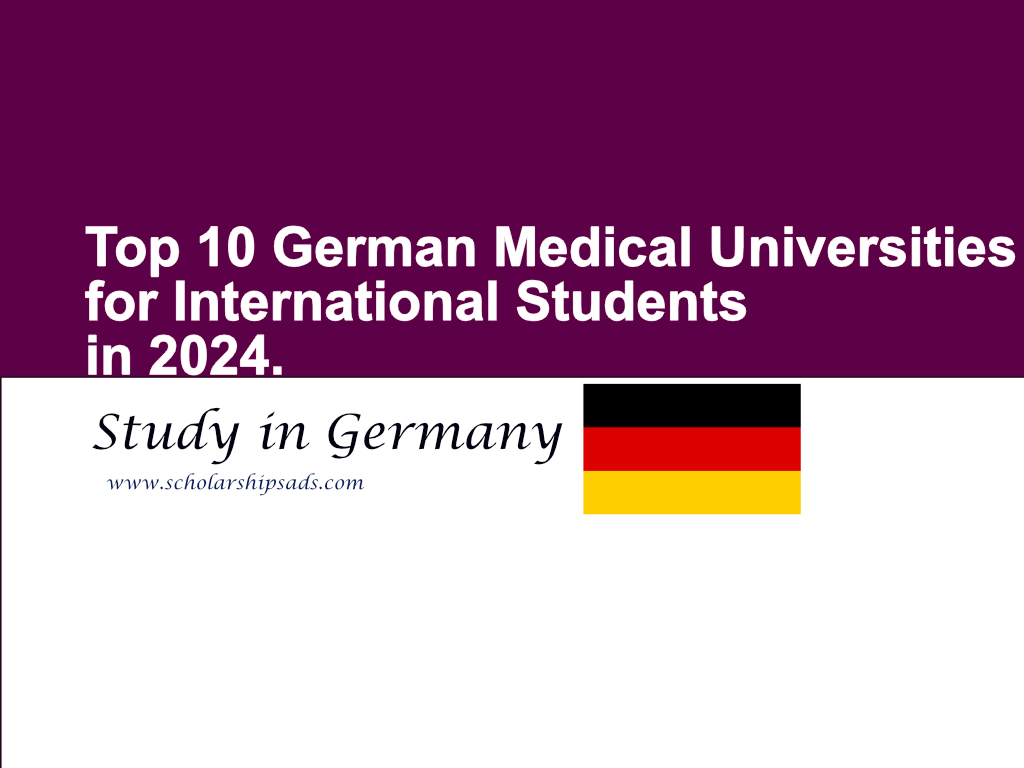
Top 10 Medical Universities in Germany in 2024: A Comprehensive Guide
Introduction:.
Germany has long been recognized for its prestigious education system, and when it comes to medical studies, the country boasts an impressive array of top-tier universities. As we step into the academic year 2024, this article serves as a comprehensive guide to the top 20 medical universities in Germany, highlighting key features and insights for aspiring medical students.
1. University of Tübingen:
With a global ranking of 86, the University of Tübingen stands out as a leading institution for medical studies in Germany. Known for its research excellence, this university provides a robust platform for students pursuing a career in medicine.
2. University of Cologne:
Securing the 335th position globally, the University of Cologne offers a dynamic environment for medical education. Aspiring medical professionals can benefit from its world-class faculty and cutting-edge research facilities.
3. University of Wurzburg:
Ranked 221 globally, the University of Wurzburg is a hub for medical innovation. Its comprehensive medical programs and state-of-the-art facilities make it a preferred choice for prospective medical students.
4. University of Giessen:
At 392 in global rankings, the University of Giessen emphasizes a holistic approach to medical education. The institution's commitment to research and practical learning sets the stage for a well-rounded medical career.
5. Charité – Universitätsmedizin Berlin:
Claiming the 51st spot subjectwise, Charité – Universitätsmedizin Berlin is a powerhouse for medical studies. Renowned for its diverse programs and world-class faculty, it offers a unique academic experience.
6. RWTH Aachen University:
With a global ranking of 168, RWTH Aachen University is a trailblazer in medical research and education. The university's emphasis on interdisciplinary learning creates a dynamic environment for aspiring medical professionals.
7. Heidelberg University:
Heidelberg University, securing the 70th global position, has a rich history of medical education. Known for its esteemed faculty and commitment to excellence, it remains a top choice for prospective medical students.
8. University of Bremen:
At 545 in global rankings, the University of Bremen is a prominent player in medical education. Its diverse medical programs and focus on international collaboration make it an attractive option for students worldwide.
9. Heinrich Heine University Düsseldorf:
Ranked 393 globally, Heinrich Heine University Düsseldorf is synonymous with cutting-edge medical research. The institution's emphasis on practical learning prepares students for the dynamic field of medicine.
10. Freiburg University:
Securing the 113th global position, Freiburg University is a leading institution in medical studies. Its commitment to fostering innovation and critical thinking makes it a preferred destination for medical aspirants.
Must Check out List of Top Engineering Universities in Germany 2024.
Conclusion:
As aspiring medical professionals look to embark on their educational journey in 2024, the top 20 medical universities in Germany provide a promising landscape for academic excellence. From renowned faculty to cutting-edge research facilities, these institutions offer a holistic approach to medical education, ensuring that students are well-prepared for the challenges of the medical field. Whether it's the University of Tübingen or Charité – Universitätsmedizin Berlin, each university on this list contributes to Germany's reputation as a hub for world-class medical studies.
For more Fully Funded Scholarships Worldwide Click here
Introduction to GMAT (Graduate Management Admissions Test)
Universities in USA with Low GPA Requirement in 2024.
Leave A Reply
- courses Python
- Professional Exams
- Notes English Essays
- Internships
- Opportunities
- Mobile Apps
- Scholarships
- Citizenship
- Universities Review
Recent Blogs
ScholarshipsAds
Recent Updates
Flinders university australian government rtp scholarships (agrtps) 2024, finland government scholarships 2025 (study in finland), unesco/poland co-sponsored fellowship 2024 (fully funded), shaanxi normal university xian belt and road scholarship 2024 in china, unsw graduate scholarships 2024 in australia, ucl global masters scholarship 2024-2025 in uk (partial funding up to £15,000), westlake university international summer camp scholarship 2024 in china (fully funded), fulbright romania student award 2025/2026 (fully funded), caregiver continuing education: 7 ways to advance your career, london centre for nanotechnology announces phd positions for 2024, ontario tech university has 16 vacant postdoctoral and academic positions., 69 vacant postdoctoral and academic positions at arizona university, 41 faculty positions at toronto university, canada, bocconi university launches scholarship program for 2024 academic year, study abroad: a student's handbook for international schools, kpmg summer internships 2024 for international students, ireland..
Medical Faculty Heidelberg Medicine (study location Heidelberg)
The Medical Faculty in Heidelberg is one of the oldest medical faculties in Germany, with an international reputation. Students benefit from outstanding opportunities for study and research.
The degree programme in Medicine lasts for a minimum of six years and three months and consists in three training phases:
- Preclinical study
- Clinical study
- Practice year
At the end of the degree programme, students complete the state examination and so become licenced to practice as a medical doctor. Graduates can specialise after completion of the degree programme by continuing to study whilst they work.
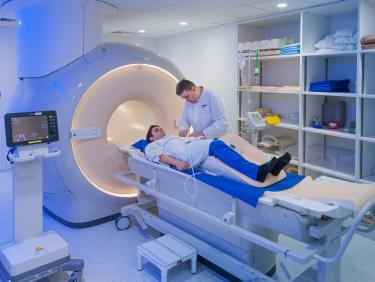
Special Features and Characteristics
The programme of study HeiCuMed (Heidelberger Curriculum Medicinale) provides students with a course which is easy to navigate and tailor to their individual needs. The programme is unparalleled in preparing students to practice as a medical doctor, or undertake research or teaching in the field.
Particular characteristics of the Heidelberg Curriculum Medicinale include:
- Students are very well prepared for examinations, for state examinations and for the demands of medical practice
- Students are supported throughout their learning by fully engaged lecturers who are highly qualified in their subjects and in didactics, and by learning coordinators
- The interdisciplinary nature of the course aids students’ learning as the coordination of subjects facilitates understanding of complex content
- Modern approaches to learning and tutor support mean the content is frequently repeated and appropriated by students
- Each semester, teaching is supported by communications training and practice classes or “SkillsLabs” during which students practice carrying out medical investigation and procedures
- E-learning programmes, digital databases and instructional videos are provided for independent study.
- Courses and examinations are divided into structured courses and modules. Examinations are of a high standard
- Teaching in so-called “class groupings” promotes effective learning within familiar seminar classes and small groups
- The degree programme offers flexibility and opportunities to develop areas of specialism according to students’ interests
- The standard period of study includes a semester during which there are no courses and students are able to carry out their own research. Students can choose when they take this semester and the majority of students in Heidelberg complete this semester within the standard period of study
- There is a comprehensive, structured range of elective courses, and numerous opportunities for students to participate in internal and external research projects
- There is a number of opportunities for, as well as advice on completing a period of study or work abroad
- Medical Faculty Heidelberg (DE)
The Heidelberg campus connects the numerous medical institutes and clinics which form part of the University clinic and sustains links to other faculties of the University where research focusses on the life sciences and the humanities. In addition, the Medical Faculty Heidelberg cooperates successfully with a number of large, external research institutes.
Research at the Faculty focusses in particular on infectious diseases, cardiovascular research, neurology, translational and individualised oncology, transplantation and individualised immunotherapy. The Medical Faculty makes an important contribution to the specialist research conducted for the German Research Foundation (Deutsche Forschungsgemeinschaft, DFG) and centres for health research.
The large number of research centres within the medical community in Heidelberg enables students to participate in numerous laboratory and research projects, pursue a doctorate and make contacts for any work they conduct in the field in the future. Students are supported by courses and advisory services offered as part of the Faculty’s doctoral programme.
Occupational Areas
Graduates of Medicine might pursue employment in a number of different fields: Medical roles generally require an acute sense of responsibility, physical and psychological stability, the willingness to work long hours and engage in ongoing professional training.
The major areas of employment for doctors are
- clinics, medical practices and centres
- medical research and teaching
further areas of employment
- public health or administration
- medical technology / biomedical technologies / medical physics
- medical informatics
- scientific or medical journalism / online services
- industry
Degree variants
State Examination

Medical research in the coming years might well be one of the most exciting fields of study, marked by new discoveries with the potential to surprise us all. Whether we are talking genetics or technical solutions, the future should also be shaped here in Heidelberg.
Leonard Lintzen, 20, Medicine, preclinical study
Preparatory Course
Newly admitted Heidelberg University students with foreign school-leaving certificates and admission have the opportunity to attend a four-week preparatory course in September to prepare for their studies.
- BioMed Kolleg (Pre-Semester Introduction Course)
Further Interesting Subjects

International Health
Medical Biometry/Biostatistics

Medical Education

Medicine (study location Mannheim)
Cookie Consent
To improve the website, the DAAD and third parties set cookies and process usage data . In doing so, the DAAD and third parties transfer usage data to third countries in which there is no level of data protection comparable to that under EU law. By clicking the "Accept all" button, you consent to this processing. You can also find selection options and explanations of these cookies and processing at the end of this page under "Cookies". There you can withdraw consent at any time with effect for the future.
- Privacy Policy
Jump to content

Higher Education Compass
Medical education part time, master of education.
Master Degree
6 semesters
Standard period of study (amount)
Please enquire
Overview and admission
Admission semester.
Winter Semester only
Area of study
- Sociology, Social Science
- Health Pedagogy
- Health Science
- Nursing Science
- Pedagogy (Teaching Degree)
- Educational Sciences
Currently and in the future, there exists a large demand for very well qualified teachers in public and private vocational schools in health care. With the upcoming amendments to the occupational admission laws of the therapy and rehabilitation professions as well as the diagnostic-technical health professions it becomes clear that the standard "higher education" for teachers in the health sector will continue to establish itself. However, the number of suitable study places is very limited. The Master's degree in Medical Education at the Faculty of Health at the HMU Health and Medical University Potsdam offers an adequate range of courses that take into account the increasing qualification requirements for healthcare professionals. This is a teacher training course, which is characterised by the clear orientation on the structure of teaching courses and the nationwide recommendations of the Conference of Ministers of Education for teaching courses. The decision about hiring is determined by the country-specific hiring requirements. However, the chances of employment in this area increase significantly due to the targeted orientation towards cross-border standards of teacher training. As a graduate, you can work in both health care schools and vocational schools in the public school system. The Master's degree in Medical Education at the HMU focuses on three areas: Educational Sciences, the Social Sciences and the elective areas of Health Sciences (including Therapy Sciences) or Nursing Sciences. The part-time model of the HMU Health and Medical University Potsdam provides part-time students with the opportunity to gain academic qualifications in addition to work and family.
Admission modus
open admission
Admission requirements (Link)
Admission requirements
Eligibility to study in Master’s courses according to § 9 (5) BbgHG and successfully completed relevant Bachelor's degree in the field of Health, Therapy and Nursing Sciences rsp. Nursing Education* After your application, we will check your personal motivation in an individual interview. * The Bachelor's degree in Medical Education (BA) at HMU Health and Medical University Potsdam forms an ideal basis for the Master's degree in Medical Education (M.Ed.) because the study concepts are coordinated.
Lecture period
Application deadlines, winter semester (2022/2023), application deadline for germans and inhabitants.
No deadlines: Apply for a study place at the HMU Health and Medical University Potsdam at any time.
Deadlines for International Students from the European Union
Deadlines for international students from countries that are not members of the european union, enrollment deadline for germans and foreign students, tuition fee.
495.00 EUR / semester
Fees (Link)
Tuition fees for the Master´s degree programme amount to EUR 17,820, to be paid in 36 constant monthly instalments of EUR 495 for the full-time model. Newly enrolled students are charged a one-time examination fee of 100 euros. There are numerous possibilities for financing studies, such as BAföG (state financial support), KfW study loans (parent- and subject-independent without collateral), scholarships for outstanding students, student loans from banks, student education funds and scholarships.
Languages of instruction
Main language.
Deutscher Akademischer Austauschdienst e.V. Kennedyallee 50 53175 Bonn
All addresses in the DAAD Network
DAAD Newsletters
Receive regular up-to-date information about our work and organisation.
Newsletter - DAAD
Useful Links
- Find Scholarships
- DAAD offices worldwide
Jump to top of page
gms | German Medical Science
- MAK Collection
- About JME (ZMA)
- For authors
- GMA Meetings
GMS Journal for Medical Education
Gesellschaft für Medizinische Ausbildung ( GMA )
ISSN 2366-5017
- Search in JME (ZMA)
- Current Volume
- PDF version
- XML version
International students – support and integration initiatives at Medical Faculties in Germany
Search medline for.
- Huhn D
- Nikendei C

GMS J Med Educ 2018;35(5):Doc62
doi: 10.3205/zma001208 , urn:nbn:de:0183-zma0012085
This is the English version of the article. The German version can be found at: http://www.egms.de/de/journals/zma/2018-35/zma001208.shtml
© 2018 Huhn et al. This is an Open Access article distributed under the terms of the Creative Commons Attribution 4.0 License. See license information at http://creativecommons.org/licenses/by/4.0/ .
Competing interests
Did you know that international students make up more than 12% of students at German medical faculties? In absolute numbers, this means that almost 12,000 international students are currently enrolled in German medical schools. Please note that the term ‘international’ does not mean young people living in Germany with a migrant background in their (family) biography, but exclusively refers to people coming to Germany with the intention of pursuing their university studies. So why do so many young people leave their home country and culture to study in Germany? The quality of medical education and the comparably low university fees are key incentives for many young academics.
Although there are a large number of international students at German medical faculties, many questions concerning this interesting group remain unanswered. Also, comparatively little work has been published in German-speaking countries regarding international students. However, existing research shows that international medical students report more stress symptoms, achieve poorer results in written, oral, and practical exams and show extended study duration as well as higher dropout rates. Particularly, the first semesters can be regarded as a critical phase in which international students are confronted with language deficits and cultural obstacles.
An improved understanding of international students within the framework of German medical education can have advantages for both sides: if their needs and their concerns become clearer, greater attention can be paid to them – providing these students with a greater chance of a successful academic career. Simultaneously, these international students are a valuable chance to gain a deeper understanding of the heterogeneity and complexity of people and cultures. Mutual learning with and from each other offers many opportunities for all those involved – it would be a pity to let these pass by.
We are, therefore, pleased to have the opportunity of presenting this "International Medical Students" issue to our reader and hope to provide this particular group of students with a forum within which one or two open questions can be answered. As editors, we hope that the commentary presented in this context as well as the four research papers and four project reports will be received with great interest. We hope that this issue raises awareness for the special situation of international medical students and offers practical suggestions for the implementation of initiatives at other faculties. Perhaps this issue will even initiate a much welcomed progressive scientific discussion of this hitherto underrepresented field of research.
In this issue you will first find a general commentary on this topic, followed by contributions regarding students' first steps in their studies as well as networking among international students. Subsequently, two Peer-assisted Learning (PAL) programs to support international students are introduced as well as a further support offer for students in clinical semesters. A further contribution deals with the question of the extent to which tertials spent abroad during the Practical Year affect the performance of German students. Finally, the "Symposium International Medical Students", launched in 2017, will be featured.
Each contribution was evaluated by three reviewers; two of them were selected in the conventional way in the course of the peer review process, one of them was himself an international student. We felt it was important to ensure that the contributions written about international students were also reviewed from the perspective of an international student.
Timo Astfalk's and colleagues' commentary "On center field or at the sidelines?" raises the question of to what extent a deficit-oriented perception of international medical students and related specific support offers are helpful in the first place for this group and if stronger integration into existing student bodies would yield greater benefits [1] .
With regard to the two contributions to the study start, Yassin Karay and colleagues present the program "Studienstart International" of the University of Cologne [2] , and Wendelin Marmon and colleagues present their program " Welcome, Orientation, Language Training" of the Charité in Berlin [3] . Both programs are designed to make it easier for international students to start their academic studies, and were evaluated in terms of participant satisfaction.
In the form of a qualitative analysis, Timo Astfalk and Brigitte Müller-Hilke approach the topic of networking among international students in pre-clinical semesters and make comparisons with networks of German students [4] .
In a separate article ("Interactive student-led examination preparation course"), we present a longitudinal tutorial program that prepares international medical students in Heidelberg for examinations in the pre-clinical semesters [5] . In "Peer-teaching International" Daisy Rotzoll and colleagues also present a PAL project which is offered in Leipzig for Erasmus students arriving there in order to better prepare them for their one-year stay in Germany [6] .
Furthermore, Holger Lenz and his colleagues present the support program – "An equal opportunity for everyone?!" – for international students in clinical semesters at the LMU in Munich, which focuses on getting to know and practicing communication strategies [7] .
In their research, Sylvère Störmann and Matthias Angstwurm ("What do international health electives and state examination scores have in common?") do not look at international students in Germany, but analyse German ‘international’ students studying abroad for parts of their practical year, and try to find out whether this experience has a positive impact on the academic achievements [8] .
Finally, Henrike Schulze and colleagues have summarized the "Symposium International Medical Students" of the German Medical Students Association, which took place for the first time in May 2017 in Hanover [9] .
We would like to thank the editors of the GMS Journal for Medical Education, Prof. Dr. med. Martin Fischer and Dr. med. Götz Fabry, for their support and giving us the opportunity of realising this exciting issue. We thank all authors for their enthusiastic cooperation and for their valuable contributions as well as all reviewers for their untiring and consistent support of the review process. Our heartfelt thanks go to Beate Hespelein (editorial office of the GMS Journal for Medical Education) for her competent administration of the submitted contributions and coordination of the peer review process as well as for her unwavering capacity of never losing sight of the bigger picture.
The authors declare that they have no competing interests.


Testimonials
Placement Records
Explore all your options & choose your future
Countries >
Czech Republic
Netherlands
New Zealand
Switzerland
Courses >
Medicine >
About Medicine
University Finder
Prep Material
Medicine Foundation Course
Engineering >
About Engineering
Computer Science & IT
Other Courses
Dentistry >
About Dentistry
By Country >
Contact Form
Book An Appointment
MBBS in Germany in English: Top Universities, Fees, & Eligibility

Germany is renowned as an economic study hub, making it a sought-after destination for interested applicants. The country’s claim to fame lies in its state-funded education system which is home to over 400,000 international students. National universities here are strongly research-oriented and offer holistic tutelage. For MBBS in Germany alone, there are over 30 specialization options. From ophthalmology to forensic medicine, students can pursue various avenues of medicine.
Medical universities in Germany teach both theoretical knowledge and methodological expertise. However, competition is high and very few students get to study medicine in Germany. Although all students who have completed high school are eligible to enroll, there are very few programs available in the English language.
This article provides you with all the necessary information to study MBBS in Germany in English. Also, we will help you discover other medicine-related programs, admission requirements, and the cost of MBBS in Germany for international students.
To get a better insight regarding which institution will be best suited for you, you can also check out our blog on Public Vs Private Universities in Germany .
MBBS in Germany: Highlights
Best medical universities in germany.
QS World Rankings lists 32 German universities among the best in the world. The list of the top 15 is presented below.
Please note that all German universities offer undergraduate-level medicine programs in the German language.
Medical Degree in Germany
MBBS is the popular blanket term for studying medicine in India and UAE. However, this is not applicable to all countries. Conventionally, MBBS stands for Bachelor of Medicine and Bachelor of Surgery. In particular, medical courses in Germany have a duration of six years and are not categorized as bachelor’s or master’s programs. Instead, MBBS in Germany is available as a long-cycle master’s program.
An accredited program to study medicine in Germany typically lasts six years and three months after a state-administered exam that allows doctors to officially start practicing. This exam is referred to as the ‘Staatsexamen’, with which one obtains a license to practice as a physician. This licensing procedure is termed ‘Approbation’.
MBBS in Germany in English
There are 106 study programs for medicine in Germany. However, only one of them is taught in English.
To study medicine in English, international students have the choice of only one university. The UMFST of Targu Mures is a Romanian institution of repute. Established in 1945, the university delivers programs in a wide range of medical and health disciplines. Medicine, Dentistry, and Pharmacy are offered to international students.
The UMFST of Targu Mures has a campus in Germany. Located in Hamburg, this campus is exclusively known as University Targu Mures Medical Campus Hamburg (UMCH ) .
University Targu Mures Medical Campus Hamburg (UMCH)
- The course program at UMCH is divided into two phases: preclinical and clinical. Preclinical education lasts for the first two years. These preclinical lessons are taught in English at the Hamburg campus.
- The next four years of the program comprise the clinical portion. Students are faced with two options here. First, they can continue studying in Germany or transfer to the main campus in Targu Mures, Romania.
If students continue their course’s clinical portion in Germany, proficiency in German is a mandatory requirement.
The semester fees for the medicine program at UMCH consist of
Admission Requirements to Study Medicine in Germany
Medicine programs fall under the aegis of Germany’s numerus clausus (NC) course category . This implies that the intake for medical programs is limited and highly competitive. Admissions take place through the Hochschulstart platform but this platform is restricted to EU students.
Non-EU students can avoid using the Hochschulstart platform and apply directly to universities. However, they must first attest to having proof of German language proficiency.
The eligibility criteria for various medical programs in Germany include
- For admission, a high school diploma or its equivalent with maths, chemistry, and physics as mandatory subjects is required.
- Proof of German level proficiency at least up to the C1 level. B2/B1 scores may also be asked for by some universities. In such a case, foreign applicants can apply to German language courses for international students .
- Qualifying marks in the student’s home country’s national medical examination are required.
- All applicants need to obtain passing marks in the interview round or MCQ test round conducted by the German medical university of their picking.
Documents required for international students
Before confirmation of acceptance, international students will be asked to furnish the following records
- All past academic transcripts
- Letter of intent and personal essay
- Proof of English and German language proficiency exam
- Passport photos and proof of residence
- Proof of fee payment
For the timely submission of documents, you can employ our admissions counseling services and get into any university of your picking.
Please schedule a video conversation with one of our specialists for further information
Students can also apply through Gyanberry , which is officially partnered with UMCH. As an authorized agency, we can help you with each stage of the application process.
Postgraduate Medical Education in Germany in English
Although English-taught undergraduate programs are unavailable, there is scope for postgraduate degrees. According to DAAD’s official listing of programs, there are 25 study programs. The duration of these programs differs. Take a look at some of these programs tabulated below. This list excludes all the postgraduate programs in dentistry and related fields.
Fee Structure for MBBS in Germany
State-funded German medical universities charge a nominal semester fee that usually ranges between € 100-500 each semester .
Privately-owned institutions charge an annual fee of € 28,000 or above .
However, students have to incur significant living expenses during their stay in Germany. These comprise
To know more, you can check out our blog on Living Expenses in Germany and How to Budget Them .
Scholarships for international students
In addition to university-specific financial assistance, the German government also sponsors a variety of scholarships for international students. Applicants can avail of aid based on need, merit, or achievement in extracurriculars.
German medical programs are certified by renowned organizations such as World Health Organization (WHO). Scholarships to study medicine and related programs in Germany are limited, however, many public universities charge minimal tuition fees for selected candidates.
DAAD (Deutscher Akademischer Austauschdienst) scholarship
The German Academic Exchange Service heads the DAAD financial assistance program by means of scholarships. DAAD scholarships are geared primarily toward graduates and research students. Eligibility for each scholarship type varies with a monthly stipend of 850 USD.
Friedrich-Ebert-Stiftung Scholarship To Study In Germany
Students in any subject area are eligible to apply if they have outstanding school or academic merit, aspire to study in Germany, and are dedicated to and live by the values of social democracy. The benefits comprise
- €934 per month for the basic scholarship program and €1,200 per month for the graduate scholarship program.
- 276€ of family allowance, if applicable
- Reimbursement of health care costs
- Any income exceeding €400 per month will be credited against the scholarship.
Career prospects after MBBS in Germany
Medical graduates from Germany obtain a license issued by the state. This license is called “Zulassung zur ärztlichen Berufsausübung in Deutschland” or simply approbation.
Medical professionals hold a prestigious position in world society. MBBS in Germany is a coveted program. After obtaining their license, medical graduates can opt to
- Work as employees in hospitals, clinics, or rural healthcare setups
- Join the private sector
- Enroll in medical research or teaching
- Become a scientist in medical technology or the pharmaceutical industry
In 2021 alone, 9,636 foreign doctors applied to have their foreign qualification recognized as an equivalent to a German qualification. This is because of the lucrative salaries offered to German medical professionals. Out of all the academic positions in Germany, doctors are paid the highest.
The average salary of a physician in Germany is € 107,000 per year .
Top-paying cities include
Does Germany offer medical programs in English?
International students can study medicine in English in Germany through UMCH. It is a Romanian university with a campus in Hamburg, Germany. Students can study the first two years in English. If they wish to continue their studies in Germany for the next four years, German language knowledge is required.
What is the cost of studying medicine in Germany in English?
State-funded universities charge a nominal semester fee of € 1,000-2,000 from international students willing to study in German. On average, the cost of studying medicine in English is € 28,000 and above annually for private universities.
What are the admission requirements for studying medicine in Germany?
Students must have completed high school. Proof of English proficiency, motivation letter, recommendation letter, and CV are some required documents. Students must take an entrance exam and interview as part of the selection process.
Related Blogs
- Study Masters in Computer Science in Germany
- Study MSc Biotechnology in Germany
- Popular English-Taught Universities in Germany
- Masters in Software Engineering in Germany
- MS in Material Science in Germany: Admissions & Cost
- Study Industrial Engineering programs in Germany
Latest Blogs
- A Student’s Guide to Living Expenses in Romania
- Scholarships in Romania for International Students
- Bulgaria Study Visa: Process and Requirements
- Working in Romania as a Foreign Student
- Romania Study Visa for International Students
- Work While Studying in New Zealand
An official website of the United States government
The .gov means it’s official. Federal government websites often end in .gov or .mil. Before sharing sensitive information, make sure you’re on a federal government site.
The site is secure. The https:// ensures that you are connecting to the official website and that any information you provide is encrypted and transmitted securely.
- Publications
- Account settings
Preview improvements coming to the PMC website in October 2024. Learn More or Try it out now .
- Advanced Search
- Journal List
- Ger Med Sci

Language: English | German
A comparison of medical education in Germany and the United States: from applying to medical school to the beginnings of residency
Ein vergleich der medizinischen ausbildungen in deutschland und den usa: von der bewerbung zum medizinstudium bis zu den anfängen der facharztweiterbildung, dmitry zavlin.
1 Institute for Reconstructive Surgery, Houston Methodist Hospital, Weill Cornell Medicine, Houston, TX, USA
Kevin T. Jubbal
2 Department of Plastic Surgery, Loma Linda University Medical Center, Loma Linda, CA, USA
Jonas G. Noé
3 Department of Medicine, Washington University in St. Louis, St. Louis, MO, USA
Bernd Gansbacher
4 Institute of Molecular Immunology & Experimental Oncology, Technical University Munich, Munich, Germany
Both Germany and the United States of America have a long tradition of science and medical excellence reaching back as far as the nineteenth century. The same tribute must be paid to the medical educational system in both countries. Despite significant initial similarities and cross-inspiration, the paths from enrolling in a medical university to graduating as a medical doctor in Germany and the US seem to have become much different. To fill a void in literature, the authors’ objective therefore is to delineate both structures of medical education in an up-to-date review and examine their current differences and similarities. Recent medical publications, legal guidelines of governmental or official organizations, articles in media, as well as the authors’ personal experiences are used as sources of this report.
Tuition loans of over $200,000 are not uncommon for students in the US after graduating from medical schools, which are often private institutions. In Germany, however, the vast majority of medical universities are tax-funded and, for this reason, free of tuition. Significant differences and surprisingly multiple similarities exist between these two systems, despite one depending on government and the other on private organizations. Germany currently employs an integrated medical curriculum that typically begins right after high school and consists of a 2-year long pre-clinical segment teaching basic sciences and a 4-year clinical segment leading medical students to the practical aspects of medicine. On the other hand, the US education is a two-stage process. After successful completion of a Bachelor’s degree in college, an American student goes through a 4-year medical program encompassing 2 years of basic science and 2 years of clinical training. In this review, we will address some of these similarities and major differences.
Zusammenfassung
Deutschland und die Vereinigten Staaten von Amerika haben beide eine lange Tradition der Naturwissenschaft und medizinischen Exzellenz, die bis weit in das neunzehnte Jahrhundert zurückreicht. Den gleichen Tribut muss man den medizinischen Ausbildungssystemen beider Länder zollen. Trotz zu Beginn bedeutsamer Ähnlichkeiten und gewisser Querinspiration scheinen sich die Wege von der Immatrikulation an einer medizinischen Fakultät bis zum Studienabschluss als Arzt in Deutschland und den USA getrennt zu haben. Um eine Lücke in der Fachliteratur zu schließen, ist das Ziel der Autoren, die beiden Strukturen der medizinischen Ausbildung mittels einer aktuellen Übersichtsschrift darzustellen und deren Unterschiede und Gemeinsamkeiten zu untersuchen. Die neusten medizinischen Publikationen, verbindliche Richtlinien von amtlichen oder offiziellen Organisationen, Artikel in der Presse, aber auch die persönlichen Erfahrungen der Autoren dienen als Quellen für diese Arbeit.
Studienkredite von über $200.000 sind nicht selten für Studenten in den USA nach deren Abschluss an einer medizinischen Hochschule, die meist in privatem Eigentum ist. In Deutschland dagegen ist die große Mehrheit der Universitäten mit medizinischen Fakultäten in öffentlicher Hand, aus Steuern finanziert und deshalb frei von Studiengebühren. Signifikante Unterschiede doch auch überraschenderweise eine Reihe von Ähnlichkeiten existieren zwischen den Systemen der zwei Länder, obwohl eines von privaten Einrichtungen und das andere von staatlichen Hochschulen abhängig ist. Deutschland verwendet aktuell ein ganzheitliches medizinisches Curriculum, das klassischerweise direkt nach dem Abitur beginnt und aus zwei Jahren vorklinischer und vier Jahren klinischer Ausbildung besteht, wobei letzteres die Studenten an die praktischen Aspekte der Medizin heranführen soll. Auf der anderen Seite herrscht in den USA ein zweistufiger Ausbildungsprozess. Nach erfolgreichem Erreichen eines Bachelorgrads im College führt der Weg eines amerikanischen Studenten durch ein vierjähriges Medizinstudium, welches aus zwei Jahren Grundlagenlehre und zwei Jahren klinischer Ausbildung besteht. In dieser Überblicksarbeit werden wir uns mit einigen dieser Gemeinsamkeiten und Hauptunterschiede befassen.
Historically, Germany and the United States have had a long and close relationship in many perceivable aspects: economically, politically, culturally, as well as military. The same concept applies to science and education, partcularly in the medical field. In the late 19 th and early 20 th century, Germany was considered the pinnacle of medical education, clinical skills, and research pertaining to the human body. Numerous physicians from Germany rose to fame in that period of time, such as Alois Alzheimer [ 1 ], Emil von Behring [ 2 ], Robert Koch [ 3 ], Rudolf Virchow [ 4 ], or Albert Schweitzer [ 5 ] who shaped medicine to what it is today. The German standing in natural science attracted many international colleagues from overseas who would travel far to learn from German expertise. Their influence was far reaching, as Abraham Flexner, a German physician, has been regarded as a key inspiration in the development of medical schools in the United States [ 6 ], [ 7 ].
Nevertheless, during the second half of the 20 th century, the two countries appear to have drifted apart in the context of medicine. Germany employs a governmentally controlled universal multi-payer system ensuring medical health coverage for close to 100% of its citizens, whereas the United States heavily relies on insurers from the for-profit private sector. The United States has also instituted a fairly standardized 4-year medical degree (M.D. or D.O.) across their nation, which generally requires prior 3–4 years of undergraduate education with a Bachelor’s degree where the enrolled students disburse the large tuition costs. In Germany, however, the vast majority of medical schools are state and tax-funded. They encompass a fairly standardized integrated 6-year curriculum that begins directly after high school and culminates in a medical degree after successful completion of all state board exams ( Staatsexamen ).
The leading countries of Western societies constantly aspire to develop a health care system with medical schools that train doctors to deliver optimal medical care and cost effective medicine. Perhaps partly due to the formally distinct developments in these two countries, it is now the US that is considered as pioneer in structured medical education, clinical work, and scientific endeavors. German faculty and students today often seek the cooperation with American universities that are perceived by some as superior in their didactical efforts and more structured education [ 8 ]. These notions may explain why Anglo-American countries are the most popular destinations for German students to do foreign rotations, semesters, or entire research projects [ 9 ], [ 10 ].
The objetive of this report is two-fold. First, the authors want to introduce and briefly delineate the medical education systems in both countries to international readers. Secondly, a non-systematic comparative review aims to help readers understand the differences and similarities between both systems of medical schools, point out potential assets and drawbacks in each country, and ultimately fill a void in international medical literature. The intended audience for this report are primarily medical students at any stage of their training, but also young physicians or even graduating high school students who are considering time abroad during their universitary education.
In this narrative review, the online databases MEDLINE and PubMed were searched for reports published until May 2017 that addressed medical education and associated topics in either Germany or the United States. Search terms included but were not limited to “education”, “medical school”, “medical university”, “student”, “physician”, “German(y)”, “United States”, and combinations thereof. References found within these articles were searched as well. Publications that were not published in either English or German language were excluded. The articles found in literature that were determined pertinent and up-to-date with the current subject matter were selected in this review. Additionally, the authors analyzed up-to-date legal guidelines of official public organizations, reviewed distinguished medical as well as non-medical media outlets, but also included their personal experience. All findings were stratified following the typical chronological career path of a medical student. No studies on human or animal subjects were performed.
Medical school in Germany
Current situation.
Medical education in the Federal Republic of Germany is offered through one of the 36 medical faculties of public universities that are tax-funded through the respective states [ 11 ]. Private universities, including but not limited to the Universitaet Witten Herdecke, or the Austrian-based Paracelcus Medizinische Privatuniversitaet with a location in Nuremberg, are a small minority and are not considered within this review. Almost 80,000 students are enrolled in a medical program. Each year, almost 10,000 new students begin medical school while 6,000 successfully graduate [ 12 ]. The curriculum defining the number of classes, minimum requirements, and guidelines for examinations is designed by federal officials of legislature and subsequently written into law: Approbationsordnung für Ärzte (ÄApprO) of 2002 [ 13 ]. It aims to ensure that all students in Germany receive the same level of education and can later provide high quality patient care regardless of the location of medical training. The universities have the freedom, however, to execute these requirements in a fashion and order as they see fit, as long as they follow the legal guidelines [ 14 ].
Application process
Every German resident with an advanced high school diploma ( Abitur ) or foreign equivalent is eligible to apply to a medical program. Due to the increasing popularity of spots in medical faculties, matriculation into medical school has become extremely competitive. Recent estimates demonstrate approximately 5 or more applicants per spot in public universities, depending on class and year [ 15 ]. This entire bureacratic operation that aims to ensure a fair distribution of these spots to the strongest applicants is managed by one central governmental non-profit trust called Stiftung fuer Hochschulzulassung [ 16 ] (formerly Zentralstelle für die Vergabe von Studienplätzen ).
The major criterion for a succesful application and matching in one of the medical programs is the grade point average, or GPA ( Abiturschnitt ), after leaving high-school ( Gymnasium ). It is calculated based on a student’s performace during 11 th and 12 th grade of school, a brief research paper, and their final school examinations. 1.0 is considered best while 4.0 is the minimum GPA required to graduate from high school. In addition to that, a large number of universities provide bonuses for participating and passing an exam called TMS ( Test für Medizinische Studiengänge ) [ 17 ], which is similar to the American Medical College Admission Test (MCAT) and can improve a GPA up to 0.8 points depending on a student’s percentile. Furthermore, minor GPA improvements can be achieved for prior military/civil service or completion of a nursing degree apprenticeship. Certain faculties even provide additional GPA credit for superior performance in scientific classes during high school. During the application process, the high school graduates need to choose up to 6 universities they are planning to apply for and rank them in order of preference. Moving on, the Stiftung fuer Hochschulzulassung distributes the available over 9,000 spots in German medical schools threefold [ 18 ]: 20% of all spots are given to those with the highest GPAs in state rankings. 60% are accepted via the internal process of medical faculties which is based on the final GPA including bonuses and occasional personal interviews. The final 20% are admitted by the number of “waiting semesters” ( Wartesemester ), meaning those who have waited the longest since high school graduation, without enrolling in a public university, have the greatest chance for sucessful application to medical school. For the medical year of 2016/17, the GPA cutoff for the first 20% via state rankings was either 1.0 or 1.1 depending on the home state. Cutoffs for GPA with bonuses via the internal distribution process were around 1.3. Acceptance for the last group (20% of spots) via waiting list required a minimum wait of 14 semesters (7 years) since high school graduation [ 19 ]. Defining ideal admission criteria will remain a subject of ongoing debate between students, medical faculties, and politics [ 14 ].
Overall, the process is not without some intricacies. Three rounds of ranking and matching are typically needed to assign all the available spots and the last students are informed about their successful acceptance as late as October – at which point most universities have already begun orientation and first lectures.
2-year preclinical segment
The six year German medical curriculum consists of 2 major parts: the 2-year preclinical segment ( Vorklinik ), and the 4-year clinical segment ( Klinik) where the final year includes rotations only (Praktisches Jahr ) [ 20 ]. During the first four semesters of medical school the students partake in classes of basic science such as chemistry, biology, organic chemistry, physiology, physics, psychology, as well as microscopic and macroscopic anatomy. Teaching is provided by voluntary lectures, mandatory seminars and practical courses, such as the cadaver lab. Upon succesful completion of all 16 credits and a mandatory unpaid 3-month nursing internship, which is comparable to a nursing assistant in the U.S., a student is qualified to apply for the first state boards exam ( Staat s e xamen ) no earlier than 2 years after starting medical school. This exam consists of two stages, a two-day multiple-choice part of 320 items [ 21 ] and a one-day oral test in small groups lead by three faculty members of anatomy, organic chemistry, and physiology.
4-year clinical segment
Upon passing both parts of the first exam with a grade of 4 (American equivalent: D) or better, the medical student is permitted to start his clinical segment of medical school [ 20 ]. The initial three-year segment of semesters five through ten covers all relevant clinical subjects from surgery, orthopedics to pathology, microbiology, and genetics. In recent years, many faculties have additionally started so-called interdisciplinary classes combining medical, surgical, and pathological aspects into one block based on disease entity. Exams are performed via multiple-choice – by far the most frequent type of exam, oral/practical evaluation, for example objective structured clinical encounters (OSCE), or essay-writing. In addition to the core clerkships that usually last one or two weeks each, each student must individually select 4 months of rotation during their vacation between winter and summer semesters: 2 months for in-patient care, 1 month in the out-patient setting, and 1 with a board-certified family physician. Once these criteria are fulfilled, medical students in Germany typically partake in the second state board exam after their 5 th year of education. It entails 320 multiple-choice questions [ 21 ] over a course of three consecutive days. In recent years, German universities have begun to implement more innovative and practical aspects into the clinical segment of medical training. This includes the use of standardized actor-patients and classes for communication skills together with colleagues from psychosomatics. Problem-based and computer-based learning are gaining the attention of faculties, too. In addition, students are now required to evaluate their lectures and courses on a regular basis, which has helped raise satisfaction with the current teaching formats [ 14 ]. Some universities have gone one step further and transition to so-called “model programs”. They employ curricula that simultaneously spread both theoretical knowledge and clinical skills from the very first day. In addition, they suggest changes to the current board exams, the division of the final year of medical school into four instead of three segments, and mandate scientific projects for all students [ 22 ]. The German Council of Sciences ( Wissenschaftsrat ), an independent counseling agency for scientific-political topics, has recently issued an official statement advising German lawmakers to expend these model programs to all public universities [ 23 ].
Next, the final year of medical school constitutes three rotations of 16 weeks each: internal medicine, surgery, and one elective outside of surgery or internal medicine. Sub-rotations within the institutions are common and this period is often also used as an opportunity for away rotations at affiliated teaching hospitals or even abroad at accredited medical universities [ 9 ]. This final year additionally serves the purpose for the medical students to get in contact with their desired departments and plan their application process for a future residency. Afterwards, the third and final state board exam takes place. This is a 4-hour oral examination similar to the oral stage of the first board exam. Overall, the minimum length of medical school in Germany is defined as 6 years and 3 months [ 20 ]. However, it is not uncommon for medical students to engange in scientific activities and in this vein, pursue an academic “Dr. med.” [ 24 ] degree. Depending on the underlying nature of the project, it might necessitate one or a few semesters of absence from classes. Physicians in Germany can only be addressed as “Doctor” upon submitting and defending their “Dr. med.” thesis in an oral exam. In the United States, however, a doctoral degree, either as M.D. or D.O., is automatically awarded upon graduation regardless of scientifc accomplishments. Upon succesful completion of all state board exams, the medical graduate can apply with the state medical association for a full medical license ( Approbation ) and bear the title “physician” ( Arzt/Ärztin ) given an inconspicuous physical exam and a clean criminal background check.
Quality control
The highest rank of teaching at German universities is a postdoctoral lecture qualification ( Habiltation ). It is usually awarded in form of a degree of a “Dr. habil.” or of a “ Privatdozent” and demands that an array of requirements must be met before suitable candidates can be considered for Habilitation . This status is implemented in a very standardized fashion at all public German universities but certain details may differ. Physicians needs to have a prior “Dr. med.” degree verifying scientific endeavors in the past. Publications in peer-reviewed journals, the candidate’s author positions in these manuscripts, certificates of continuing medical and didactic education, and numerous proofs of teaching are additional prerequisites. After habilitation, the faculty member must continue to be involved in his clinical field in terms of science and student education to maintain this high academic status [ 25 ].
Nevertheless, current trends seem to favor teaching in the practical setting and in smaller groups rather than large lectures. Due to limited numbers of academic personnel, the participation of resident physicians, fellows, and even senior students in peer-teaching sessions [ 26 ] is becoming more crucial. In these instances, faculty members with Habilitation need to educate and prepare their younger colleagues individually for their upcoming classes to ensure high-quality education for all medical students. Furthermore, those physicians interested in academic careers have the option to pursue graduate education to demonstrate their teaching qualification objectively. Graduate programs leading to a Master of Medical Education (MME) [ 23 ] and similar degrees are available and have shown positive impact on healthcare professionals in previous studies [ 27 ] yet their value still needs to be verified on a larger scale.
Financial aspects
The public universities and their respective medical faculties discussed in this report are predominantly government- and thus tax-funded, as it has been the norm for many decades in Germany. After a short period of tuition charges of 500 Euros per semester (1,000 Euros per year) [ 28 ] starting around 2005 in various German states, these fees were all abolished again by the winter semester of 2014/15 [ 29 ] due to massive protests from students and the general public and shifts in the political atmosphere. Today, merely administrative fees exist ranging around 50–90 Euros per semester as well as discounted tickets provided by the universities for unlimited use of public transportation ranging from 50 to 200 Euros per semester. Generally, cost of living, particularly housing [ 30 ] in the more expensive cities, has been the major financial burden for students in Germany. For these reasons, many scholarship offers are more focused on specific student groups, such as political parties or religious communities rather than reaching out to the general student body [ 31 ]. The largest providers of collegiate financial support are the so-called Deutschlandstipendium , which reached merely 0.84% of all students [ 32 ] in Germany, the Studienstiftung des deutschen Volkes with similar scholarship figures [ 33 ], and the national Bundesausbildungsförderungsgesetz (BAföG) [ 34 ], that provides monetary aids up to 670 Euros per month to qualifying low-income students – half as a scholarship, half as a student loan. Altogether, only 4% of all German students received scholarships according to a recent survey [ 35 ].
Postgraduate career: residency, research, and the private industry
Akin to many other industriliazed nations, Germany is facing the challenge of a constantly aging population requiring attention from medical professionals [ 36 ]. Unfortunately, this demand does not seem to be met by the large numbers of new physicians graduating every year. Of those that start medical school, about a third do not graduate. Of those that do, many opt for alternative careers outside of patient-care, such as research, administration, or the private industry sector. Others may only work part-time or pursue a residency abroad in the pursuit of better training, a harmonic work-life balance, or higher compensation [ 37 ]. For these reasons, Switzerland has been the number one destination for emigrating German physicians. Young physicians that decide to commence residency ( Facharztausbildung ) in Germany need to apply independently at various accredited institutions unlike during the centralized and nation-wide application for medical school. Residencies in general last a minimum of 48 to 72 months depending on specialty. An array of fellowships ( Zusatzbezeichnung ) can be obtained after succesful completion of residency. Interestingly, some smaller hospitals and their respective program directors may not have full credentials for the entire spectrum of clinical rotations to complete the specific residency, so residents may have to complete parts of their residents at different institutions. One upside to this tradition is that a residency can commence at any time of the year when there is a free resident employment offer at an accredited instritution. While there are guidelines for resident hours and compensation [ 38 ], employment length and other minor details can be negotiated individually. More competitive specialties with greater numbers of applicants may therefore have more leverage in their hiring process. Futhermore, particularly surgical specialties bear catalogues of minimum procedures that need to be performed before applying for the board certification with the state [ 39 ]. A thorough analysis of each specialty would be beyond the scope of this report. In summary, residency training in Germany is highly variable and dependant on multiple factors.
Medical school in the United States
History and current status.
There is a total of 180 medical schools in the United States, 147 of which are allopathic [ 40 ] and 33 of which are osteopathic schools [ 41 ]. Of the allopathic schools that graduate students with an M.D. degree, 60.5% are public compared to only 20.0% of osteopathic schools providing a D.O. degree [ 42 ]. The osteopathic programs have become very similar to allopathic ones with the difference that their curriculum includes bone and joint manipulation. Considering the continuously rising popularity of careers as physicians, these osteopathic schools are quickly increasing in numbers to somewhat compensate for the rising demand [ 7 ]. Many American students, finding acceptance into US medical schools exceedingly competitive, often opt for international schools, most commonly in the Caribbean. However, detailed discussion of medical training through Caribbean medical schools is beyond the scope of this review.
The Flexner Report, written by Abraham Flexner and published in 1910, has been attributed to greatly influencing the current medical education system in the United States [ 43 ]. More specifically, the report called for higher admission and graduation standards at medical schools in addition to teaching more structured and established aspects of mainstream science and medicine. Allopathic medical schools are accredited by the Liaison Committee on Medical Education (LCME) and are sponsored by both the American Medical Association (AMA) and the Association of American Medical Colleges (AAMC), whereas osteopathic medical schools are accredited by the Commission on Osteopathic College Accreditation of the American Osteopathic Association. There has been concern in the past that the medical school curriculum places too much emphasis on the natural sciences at the expense of the psychosocial, humanistic, and professional aspects of medicine [ 44 ]. In the 1990s and 2000s, the LCME and Accreditation Council for Graduate Medical Education (ACGME) required medical schools and residency programs to teach and assess professional attributes [ 44 ].
The 4-year-long Flexner model of two years of basic science instruction followed by two years of clinical experience has been rigorously maintained. This process ensures and maintains educational rigor across institutions [ 45 ]. Pre-clinical years generally span 2 years, during which students attend didactic lectures and focus on the natural sciences. Clinical exposure is standardized to 2 years, providing students the opportunity to practice clinical sciences and patient interactions. However, similar to German tendencies, recent medical education reform has transitioned to including greater integration of clinical application and humanistic qualities of the profession earlier during training, moving away from the traditional Flexner model [ 46 ]. The transitions may include the change from large audience lectures to classes of smaller groups and the earlier implementation of clinical knowledge. Due to many federal regulations in form of Institutional Review Boards (IRB) any reforms demand time to be successfully tested [ 7 ].
There are two paths to gaining acceptance into a medical school in the United States. The more common and traditional method entails gaining acceptance into a 4-year university and completing a Bachelor’s degree while completing 2 years of pre-medical requirements. These requirements vary by school but most commonly include one year of biology with lab, one year of general chemistry, one year of organic chemistry with lab, and one year of physics. Some schools also require coursework in behavioral and social sciences, one year of writing/English, and up to one year of mathematics. Students must also take the MCAT as a standardized test with the purpose to assess one’s capacity for the rigors of medical school.
Alternatively, high school students may enter a combined B.S./M.D. or B.A./M.D. program. These programs allow students to earn a Bachelor’s degree and then proceed directly into a medical program for a Doctor of Medicine (M.D.). One benefit to these programs is that students may forego the typical medical school admissions process that most pre-medical students undergo at the end of their undergraduate careers. Additionally, these programs are often in the form of accelerated 6- or 7-year programs (as opposed to the traditional 8) and most, but not all, relinquish the student from MCAT requirement.
Application numbers to medical schools in the United States are at an all-time high and increasing every year. Most recently, 53,029 applicants applied in 2016 and 21,025 matriculated, yielding an acceptance rate of 39.6% [ 47 ]. The rate of growth in medical school positions has not matched the rate of demand, and therefore the last several years have demonstrated an average downward trend in acceptance rate with few exceptions.
Studies have shown that scores on the MCAT have limited predictive validity for medical school performance and licensing exam measures [ 48 ]. With the understanding that objective measurements including test scores and grades are not sufficient to identify candidates who will go on to become competent and successful physicians, the medical school admissions process has moved toward a more holistic approach including increasing the weight of nonacademic data [ 44 ].
2 years of basic science
In recent years, the educational format in many U.S. medical schools has transitioned to including more accompanying small group learning sessions, such as problem-based learning (PBL) [ 49 ], in addition to traditional didactics, such as large lectures and medium-sized seminars. Several studies have reported that group learning in PBL may have positive effects. However, additional research is required to obtain more insight on the cognitive and emotional effects on medical students in this format.
Simulated patient encounters and improvements in simulation technology, now providing students with mannequin-robots that talk, blink, breathe, and move, have provided medical students of this era with increased opportunity to develop autonomy in a safe, realistic, yet artificial environment [ 45 ].
The two preclinical years culminate in the United States Medical Licensing Examination (USMLE) Step 1. This is the first of three steps to obtain a medical license in the United States, and it is sponsored by the Federation of State Medical Boards (FSMB) and the National Board of Medical Examiners (NBME). This test holds great weight in residency admissions, therefore medical students commonly spend large amounts of time studying on their own or in groups [ 50 ].
2 years of clinical rotations
The USMLE Step 1 is generally taken at the end of the second year of medical school, although there are a few exceptions. Immediately following Step 1, students generally begin their third year, marking their transition into the clinical years. The third year of medical school is structured to ensure exposure to core disciplines of medicine, including internal medicine, surgery, obstetrics and gynecology, psychiatry, and others. Students are encouraged to decide on a specialty to pursue by the beginning of their fourth year, as this time is more flexible, allowing students the opportunity to create a schedule tailored to increasing exposure to their desired specialty. At the end of the third year or beginning of the fourth, medical students take the USMLE Step 2. This exam is divided into two sections: clinical knowledge (CK) and clinical skills (CS). Step 2 CK is similar to Step 1, testing students’ knowledge on a computer-based standardized exam. Step 2 CS was introduced in 2004 as a pass/fail one-day observed series of simulated patient encounters to ensure the necessary clinical skills to be effective physicians. The test is assessed by three criteria: (1) integrated clinical-encounter (ICE) including gathering data such as history and physical exam and writing a note, (2) communication and interpersonal skills, and (3) proficiency of spoken English [ 51 ]. Students graduating with an M.D. must pass all three steps of the USMLE exams prior to practicing medicine in the United States.
Maintaining teaching standards
Regulatory bodies as well as individual institutions have enacted policies to maintain teaching standards in U.S. medical education. In March 2013, the American Medical Association (AMA) on Medical Education approved faculty credit for teaching medical students and residents as an activity that can be certified for credit. The AMA historically offered Category 1 Credit for teaching at live Continuing Medical Education (CME) activities, and Category 2 credit for teaching medical students and residents [ 52 ]. Additional information about CME can be found at the Accreditation Council for Continuing Medical Education webpage [ 53 ]. Physicians use CME credit to demonstrate participation in educational activities to meet requirements for state medical boards, medical specialty societies, specialty boards, hospital medical staffs, the Join Commission, insurance groups, and others [ 52 ], [ 54 ]. In order to quality for AMA Category 1 or 2 Credit, the instruction must meet a list of AMA core requirements [ 54 ], [ 55 ].
Several medical schools in the U.S. require faculty physicians to regularly instruct students. Ohio State University (OSU), for example, states that the receipt of University salary entails a requirement to teach, principally to medical students, but may also be applied to the teaching of undergraduate and graduate students as well. OSU expects faculty physicians to allocate one half-day per week for teaching obligations [ 56 ]. Harvard Medical School Masters in Medical Education Program similarly places high priority on the advancement of medical education through research, skill building, and innovation, thereby seeking to transform medical education in the service of advancing the health sciences and healthcare [ 57 ].
Professionalism standards nationwide have also received much attention at medical schools, particularly during recent curricular reform. This increased attention to professionalism at the medical student level has also been attributed to propagating attention to professionalism among faculty, residents, and staff [ 58 ].
Cost of attendance
The cost of medical school tuition in the United States has developed a reputation worldwide for being exceedingly expensive. Tuition, fees, and health insurance at public medical schools averages at $34,592 per year for residents and $58,668 for nonresidents, meaning those who are not from the same state as the school. Private medical schools cost an average of $55,534 per year for residents and $56,862 for nonresidents [ 59 ]. These figures do not include living expenses, which vary in each locale. A total of 76% of medical students graduate with educational debt [ 60 ]. Of these students with debt, the average for students graduating from public medical schools is $180,610 (median $180,000) and the average for students graduating from private schools is $203,201 (median $200,000) [ 60 ]. Additional premedical education debt, referring to undergraduate university studies, has most recently been estimated with average figures of $25,550 to $39,950 depending on college type [ 61 ]. The majority of tuition and living expenses are paid by family contribution or loans. Part-time employment is uncommon among medical students in the United States, and in many schools strictly forbidden. Few students are fortunate to receive significant scholarships to alleviate the financial burden of medical school. The significant debt of graduating medical students is considered the major burden of becoming a US physician. These costs translate to the fact that the United States operates the most expensive healthcare system in the world [ 7 ].
Residency match or alternative career paths
Most medical school graduates pursue a residency through the National Residency Matching Program (NRMP), which is sponsored by the American Board of Medical Specialties (ABMS), the American Medical Association (AMA), the Association of American Medical Colleges, (AAMC), the American Hospital Association (AHA), and the Council of Medical Specialty Societies (CMSS). The NRMP came about in 1952 in response to dissatisfaction with a decentralized and highly competitive market in securing a residency position. This program standardizes the entire application process across nearly all specialties and somewhat mitigates the bureaucratic difficulties for foreign medical graduates. Upon successful completion of all USMLE exams and application for the Educational Commission for Foreign Medical Graduates (ECFMG) diploma, an international medical graduate can apply for residency through the NRMP without large obstacles. In contrast, obtaining a license in Germany as a non-EU citizen would require individual and tedious communication with one of the state medical associations ( Landesärztekammer ). Two specialties, including urology and ophthalmology, utilize their own separate matching process outside of the NRMP. Both urology and ophthalmology do, however, use the NRMP in securing preliminary or transitional training years. The American Urological Association (AUA) dictates the matching process for urology applicants, and the San Francisco Match (SF Match) is responsible for the matching process in ophthalmology.
Medical students apply to the residencies in their desired specialty during their fourth year. The application cycle is standardized using one of the three matching processes listed above, depending on specialty. Strict restrictions and regulations regarding contact between applicants and programs is enforced to maintain the integrity of the matching process and reduce inequities in securing a residency position.
Discussion: Differences and overlaps
A society that aims to create brilliant physicians requires a brilliant educational system. Even though Germany and the United States are both wealthy and highly industrialized countries providing outstanding healthcare of the most recent standards, engage in medical and scientific knowledge exchange, conduct research together [ 62 ], and develop modern guidelines for patient care, their approaches to training medical students are significantly different (Table 1 (Tab. 1) ).

The first major discrepancy is the structure of the academic process between high school and graduating as medical doctor. If successful in the highly competitive application process to medical schools, German students enjoy the simplicity of an integrated 6-year program that allows them to focus completely on their studies, clinical rotations, or any research activities knowing that a medical degree is guaranteed if all credentials are successfully completed. On the other hand, the United States rather employs a two-stage process. American undergraduate students initially require a Bachelor’s degree that may or may not involve participation in classes unrelated to the medical field. Although certain pre-medical prerequisite courses are required to apply to medical school, these only account for 2 years of the typical 4 required for a Bachelor’s degree. Next, it is necessary to take the MCAT exam and once again go through the stress and financial burdens of the application and interview process to medical school. The second significant distinction in medical education is of monetary manner. Despite recurring public debates about the high levels of tuition costs in the United States, these fees have been steadily increasing in a manner that is exceeding inflation. Interestingly, this financial obstacle does not seem to impact the popularity of medical school programs since student applications remain high. Large tuition loans are typically paid back after residency when six-digit physician salaries are norm and taxes lower than in Germany [ 63 ].
Nevertheless, Germany and the USA also share similarities. In both countries, first year medical students run through a two year basic science program before proceeding to the clinical courses of medicine. On their way to a medical degree, students take standardized board examinations. These overlaps in the structure medical education are often used by students to schedule away rotations and learn about other countries, healthcare systems, and teaching patterns. However, traveling abroad for electives seems to be more common for German than American students who may be limited in their freedom of permitted clinical rotations.
Ebrahimi-Fakhari and colleagues from Germany, for instance, described their final year experiences in large academic US institutions. They praised the structured rotations, clear roles in a medical team of attendings and residents, the handling of own patients under supervision, and the overall positive teaching culture providing immediate feedback. The authors encouraged such an environment to German universities and promoted the extension of these international partnerships [ 9 ]. A number of such alliances currently exists: the Ludwig-Maximilian University in Munich keeps up a partnership to Harvard University [ 8 ], the University of Heidelberg offers 4 th year rotations at different US institutions [ 64 ], and the University of Rostock has a strong cooperation with the East Tennessee State University [ 65 ]. In addition, the Technical University of Munich regularly hosts a course of highly motivated medical students in form of a case discussion round and with participation of faculty and M.D./Ph.D. students from Weill Cornell Medicine [ 66 ]. In a highly globalized world, it is important to maintain these international relations and learn from each other to preserve and strengthen healthcare systems. These exchange programs and collaborations facilitate the often gruesome process of application and credentialing that students undergo when trying to expand their exposure to other institutions on clinical rotations or research projects. Having access – even only for a few months – and having gone through an elite medical training abroad delivers a competitive advantage to each single medical student. German students who are well-known for their willingness to travel abroad for rotations may therefore explain the current trends in doctor migration. Germany has suffered from significant emigration of highly skilled physicians for many years – a deficit that has only partially been compensated by immigration, especially from countries of Eastern Europe where the standard of training may be suboptimal [ 67 ], [ 68 ]. In contrast, the US has recorded a continuous growth in numbers of foreign medical graduates applying for residency while physician emigration is quasi unheard of [ 69 ].
In spite of common cultural, economic, and political interests between Germany and the United States of America, there are numerous differences in their educational approaches to teaching medical students. Both systems strive to train doctors to deliver optimal medical care in a fast-changing medical world. By using different approaches, such as different class sizes, problem-based and case-based learning versus a more generalized way of teaching, they differ. Nevertheless, at certain points in medical training, both these systems overlap: these are opportune chances for clinical and scientific exchange. Strong partnerships between specific universities ease the burdens that students face in their attempt to apply for such away programs abroad. We are hopeful that these prospects will continue to grow in near future, thereby fostering intercultural collaboration, exchange of knowledge, and ultimately advancement of healthcare. We further encourage the German and American medical schools to keep up their alliances across the Atlantic Ocean.
Conflicts of interest, financial disclosures, and source of funding
None of the authors, nor their close family members, have a financial interest in any of the products, devices, or drugs mentioned in this manuscript. Furthermore, the authors declare that no commercial associations or financial disclosures exist that might pose or create a conflict of interest with information presented in this manuscript. No funding was received for the work presented in this manuscript.
About the authors
D.Z. graduated from the Technical University Munich in 2015 and is a plastic surgery research fellow in Texas.
K.T.J. graduated from the University of California, San Diego in 2017 and is a plastic surgery resident in California.
J.G.N. graduated from the Technical University Munich in 2014 and is an internal medicine resident in Missouri.
B.G. is a US-trained internist, immunologist, and oncologist. He is the director emeritus of the Institute of Molecular Immunology & Experimental Oncology at the Technical University Munich in Munich, Germany and was in charge of the TUM – Weill Cornell student exchange program.
Top 10 Benefits of Studying in Germany
The benefits of studying in germany at a glance:.
- Germany makes a great choice, renowned for its reputable universities and education quality
- International students can access a great stud-work-life balance with a low cost of living
- With the post graduate work visa, you can access job opportunities at the heart of Europe
- At IU you can study in English and earn an internationally recognised degree
Benefits of Studying in Germany
Germany is in the global spotlight, becoming an increasingly popular study destination for international students! With its world-class universities, diverse range of study programs, and strong commitment to research and innovation, Germany offers numerous advantages for those seeking a quality education. With 458,210 international students, it ranks in the top three countries in the world for international students.* In fact, Germany has over-taken Canada as one of the top study-abroad destinations for Indian Students.
Whether you are fresh out of school and looking for a strong start to your career, or you're already working and want to upskill for higher-paying roles in exciting, emerging areas - studying abroad in Germany could just be the perfect fit for you .
10 Top Benefits of Studying in Germany
1. world-class education and research.
Before considering studying abroad in Germany, it helps to familiarise yourself with the country's education system. Germany's higher education system is renowned for its emphasis on academic freedom, practical relevance, and strong research infrastructure .The country has a long and rich history of education, dating back to the Middle Ages when the first German universities were established. Over the years, the German education system has evolved and adapted to meet the changing needs of society.
Today, German universities have a worldwide reputation for quality education. Home to some of the world's top-ranked universities, the country places a strong emphasis on research and innovation.
IU International University is a private German university that offers programmes in a variety of cutting-edge subjects. With a high ranking on the QS Star ratings , we offer globally recognised degrees, with current course curriculum taught by experienced industry professionals. Our master's, bachelor's and MBA programmes are available with study options that you can tailor to your current schedule and study flexibly full-time or part-time.
2. Diverse range of study programmes in German universities
The extensive array of degree programmes offered by German universities caters to a wide range of academic interests and career aspirations. There are over 20,000 degree programmes across various fields, proving Germany's commitment to providing diverse educational opportunities. This diversity is particularly appealing to international students who seek comprehensive educational experiences abroad.
Private sector universities like IU even offer German degrees in cutting-edge, evolving fields like Artificial Intelligence, Cyber Security, Data Science, Business Intelligence and more. Our career-focused and highly respected degrees help to keep you up to date and find success in today's constantly evolving world. And you'll also find programmes in more traditional popular courses like engineering, computer science, humanities, or applied sciences.
3. Affordable education: private and public universities
One of the biggest advantages of studying in Germany is the affordability, but here's a quick overview to understand why. German universities can be categorised into public and private institutions. Public universities are predominantly funded by the state, offering free higher education or low-cost education to both domestic and international students in Germany. This funding model ensures that education remains accessible to all, regardless of their financial background. However, the disadvantage that foreign students may face is that at public universities the programmes are usually taught in the German language .
On the other hand, private unis are usually funded by tuition fees and may offer specialised programs or smaller class sizes. These institutions often have a more exclusive and personalised approach to education, providing students with a unique learning experience.
At IU, for example, you have the option to choose from a range of English taught bachelors and masters programmes in a variety of career-focused subjects at affordable rates. There is also the option to apply for financial support to alleviate your financial burden. This makes private german universities like IU a great option for foreign students who don't speak German and cannot afford hefty tuition fees.
Would you like to know more about cost of living and tuition fees? In our blog post you can read more about the cost of studying in Germany .
4. Excellent career opportunities
Germany's remarkable economic growth has contributed to a thriving job market, offering numerous benefits to students looking to enrich their academic journey. The country is home to many multinational companies, renowned research institutions, and thriving start-up ecosystems. German companies frequently collaborate with universities, offering internships and job placements to students, giving them a head start in their chosen career. At IU, the emphasis on practical training and industry-relevant skills equips our students with the necessary tools to succeed in the competitive job market. Furthermore, Germany's central location in Europe opens doors to a vast network of professional opportunities across the continent.
Studying in Germany not only provides students with a world-class education but also exposes them to a rich cultural heritage and promising career prospects . The combination of academic excellence, affordability, cultural diversity, and excellent career opportunities makes Germany an ideal destination for international students seeking a truly transformative educational experience.
5. Post-graduation work visa for an international student
A significant attraction for international students considering an education in Germany is the opportunity to work in the country post-graduation through the post-graduation work visa. This policy underlines Germany's commitment to fostering global talent and providing a seamless transition from higher education to gainful employment within its robust job market.
Upon completing their studies at a German university like IU, students are granted the chance to apply for this student visa, which allows them an 18-month period to seek employment that aligns with their qualifications . This provision not only enhances the appeal of Germany as a prime destination for international students looking to cement their careers and lives in European countries.
AT IU, you can also access career support to know more on how to get a job in Germany . Thus, the post-graduation work visa serves as a gateway for ambitious graduates to start their careers and a new life in Germany, leveraging their higher education into rewarding professional futures.
6. Study in English, be part of a multicultural community
One of the benefits of studying in Germany for international students is the opportunity to study in English, particularly at private universities. This feature is a considerable advantage for students from non-German-speaking countries, making the transition to studying abroad smoother and more accessible.
At IU, you can study in English across a wide variety of programmes, including internationally recognised bachelor’s, master’s, or MBA degrees. This alleviates the barrier of having to first master the German language before pursuing higher education, allowing you to focus fully on your studies and career development. Furthermore, earning a degree from a German university such as IU, known for its global standing and international networking opportunities, equips you with a prestigious qualification that is valued worldwide.
This unique aspect of the German educational landscape ensures that international graduates are well placed to experience a comprehensive academic journey, gain an attractive job offer post-graduation , and enjoy the vibrant and dynamic lifestyle Germany has to offer, all within an English-speaking academic environment.
7. Vibrant student life and affordable living costs
Student life in Germany is characterised by an affordable cost of living and studying, which is a significant aspect of the city's allure to those from other countries pursuing overseas education.
IU has campuses in Bad Honnef and Berlin. Berlin, with its eclectic mix of culture, innovation, and history, is a hub for students from across the globe, seeking both higher education and a vibrant and dynamic lifestyle. The city's educational institutions are integrated within a society known for its openness and diversity, encouraging international students to feel at home while exploring the myriad opportunities available to them . One of the most appreciated advantages is the feasibility of part-time jobs, allowing students to gain valuable work experience and manage their expenses without compromising their studies.
This supportive environment not only fosters academic achievement but also enables students to immerse themselves in German culture, enhance their language skills, and develop a global network, all while benefiting from Germany's affordable cost of education and living. Berlin's status as a leading European city for growth and innovation mirrors Germany's overall ethos of enabling overseas education through a harmonious blend of quality, affordability, and opportunity, making it an enviable destination for students worldwide.
8. Cutting-edge tech industry
Germany's strategic emphasis on innovation has made it a hub for those eager to delve into these emerging technologies. Germany distinguishes itself as an exceptional destination for graduates aiming to enter the tech industry, underscored by the state's commitment to research and development. Currently, the nation is at the forefront of technological innovation, specifically in areas like AI, cybersecurity, and Data Science .
The German government and private sector invest heavily in tech and research, fostering an environment where cutting-edge work is not just encouraged, it's a norm. This investment has cultivated a robust tech industry, rich with job opportunities for those with the skills and ambition to pursue them. For international graduates, this means not merely finding a job but engaging in work that pushes the boundaries of what's possible in tech, making Germany a magnet for those seeking to influence the future of technology.
The blend of a strong academic foundation with practical job opportunities in a thriving tech ecosystem makes Germany an attractive proposition for graduates from around the globe, offering them a gateway into a sector that is both rewarding and critical to the future.
9. Central location in Europe
Beyond the academic and professional advantages, Germany’s central location in Europe presents an unparalleled opportunity for international networking. Being at the heart of the continent, Germany serves as a crossroads that easily connects to other major European cities and countries. This centrality facilitates an ease of travel that is unmatched , allowing students and professionals alike to attend international conferences, participate in cross-border projects, and foster collaborations with ease.
For international students, this means the study abroad experience is enriched not just by the educational and professional growth opportunities within Germany but also by the potential to connect and interact with a broader European community. Germany’s strategic position enhances its appeal as a study destination, offering students the unique benefit of engaging with a diverse array of cultures and professional landscapes, further solidifying its status as a conducive place for fostering international connections and opportunities.
IU has campuses both in picturesque Bad Honnef and in busy, bustling Berlin - so there's lots to do, lots to see and lots of opportunities to make the most of the global job market!
10. Study and work-life balance
Living in Germany affords a fantastic opportunity to achieve an enviable study and work-life balance. Germany is renowned not just for its academic excellence and thriving tech scene but also for a culture that values balance, enabling individuals to pursue a plethora of activities outside their academic and professional commitments.
At IU, this balance is further facilitated by flexible programmes designed to meet the diverse needs of students. We offer flexible degrees, allowing students to chose from study options that cater to different schedules. This way, our students can tailor their education around their lives, not the other way around. This flexibility empowers IU students to not only excel academically but also to indulge in personal interests, travel, and partake in Germany's rich cultural offerings, thereby enhancing their overall living experience .
The ability to choose study options that best fit their schedules means that students can enjoy a truly remarkable study and work-life balance, making their time in Germany both productive and enjoyable. Read more here about our blended/on-campus study model .
The Benefits of studying in Germany at IU
The myriad benefits of studying in Germany underscore its status as a premier destination for international students. From its world-class education system to a robust job market and vibrant cultural diversity, Germany offers a comprehensive environment for learning, personal development, and professional advancement.
At IU, you can study flexibly and in English, earning an internationally recognised bachelor's, master's, or MBA degrees. With a wide range of career-focused subjects, you'll acquire the skills necessary to thrive in today's competitive job market. If you'd like to live and study abroad in Germany , you can choose to study on-campus at our campuses in Bad Honnef or Berlin - and make the most of your central location in Europe! The huge benefit of this is the job opportunities that you'll be able to access upon graduation. Plus, you'll also be able to work part-time jobs in order to help finance your lifestyle and/or studies.
Furthermore, our application process is both efficient and transparent, devoid of any hidden expenses. Graduating with a degree and an impactful skill set from IU assures enhanced employability. Additionally, you can take advantage of our comprehensive career services to explore job opportunities globally.
The benefits of studying in Germany extend beyond just acquiring a quality education; they encompass personal growth and preparation for a successful global career. Germany eagerly awaits your arrival—are you ready to seize the opportunity?
Discover how IU can help you build the career you dream of
Leave your details to get more info about the university and our degree programmes
Unfortunately your form could not be sent. Please try again.
Thank you for your interest in IU!
You might also be interested in these articles, how to get a job in germany.
The Ultimate guide to finding a job in Germany. Discover how to navigate through the German job market: What you need to know about finding a job in Germany and applying for a German work visa that fits your needs.
Germany University Fees and Cost of Studying: A Guide
Concerned about cost of studying in Germany? Our guide has you covered – learn everything you need to know about the cost associated with studying and living in Germany.
Rated 5 stars for our online learning, among the best in the world
WES Canada U.S. recognised: our grads can work/study in both countries
Globally recognised for our quality-assured digital education
Enhanced research opportunities help IU provide the very best to you
Our teaching and faculty meet European educational standards
Academically top ranked in Germany with 6 out of 25 categories won
Reaccredited until 2026 for our competency in teaching and research
Unfortunately, our services are not available in your country. For more information, please contact us via: [email protected]
Unfortunately, your search did not return any results
Try another search term, check the spelling or get in touch with our Study Advisory Team
- Plan Your Studies
- Study Programs
- Universities
- Requirements
- Living in Germany
- Accommodation
- Statistics & News

Working While Studying in Germany
In Germany, international students can take advantage of the education system while working part-time at the same time, enabling them to gain valuable work experience while also supporting themselves financially during their studies.
Can I Work While Studying in Germany?
Yes, you are eligible to work part-time while studying in Germany. If you’re studying at a university or college in Germany, you are allowed to work part-time while pursuing your degree, however, there are restrictions on the number of hours you can work.
- EU/EEA and Swiss Students. Students from EU member states, Iceland, Liechtenstein, Norway, or Switzerland can work up to 20 hours per week during term times. It’s advised not to exceed this limit to avoid being considered a regular employee, which could affect student status.
- Non-EU/EEA Students. Under the new law, as of March 1, 2024, international students, including those in preparatory programs for university, have an increased annual working limit from 120 to 140 full days or 240 to 280 half days . Alternatively, they can work up to 20 hours per week. The Federal Office for Migration and Refugees (BAMF) announced that international students can now work more days per year and hold a second job.
This information is also confirmed by actual students in Germany on this Reddit thread , mentioning specifically that if you work more than the allowed hours you would be breaking the terms of your residence permit. This could lead to warnings, fines, and then you being unceremoniously deported back to your home country (plus a years-long ban on entering the Schengen zone again).
We advise you to consult with the international office at your university before finding a part-time job. They can offer you more information about working as a student in your specific German state and also share with you opportunities they might have available for you.
Special Employment Conditions
- Student Assistant Jobs. If you secure a position as a student assistant, you’re exempt from the 140-day rule, as there are no restrictions on jobs within the university. However, you must still notify the foreigners’ registration office if you intend to work additional hours.
- Language and Preparatory Courses. For students enrolled in language or preparatory courses, regulations are stricter. You can only work during breaks between lectures, and you must obtain permission from both the Federal Employment Agency (Agentur für Arbeit) and the Immigration Office (Ausländerbehörde) beforehand.
Work Placements & Exceeding Work Limits
- Both paid and unpaid work placements count towards the yearly work limit.
- If your study regulations require a mandatory work placement, you might be allowed to work extra hours.
- It’s not a good idea to work beyond your limit because it means you’ll have to pay for health, unemployment, and nursing care insurance. Breaking the rules could also get you deported.
What Kind of Student Job Can I Work in Germany?
When selecting a job, it’s important to find one that is convenient in terms of location, salary, and position.
Here are a few student jobs you can work while in Germany:

Study at GISMA University of Applied Sciences
Be one step ahead with a globally recognised college in Germany!
- Academic Assistant: Finding work at the university as a teaching or graduate assistant is convenient for those with academic aspirations. These roles are open to research scholars and are usually advertised at the university or relevant department.
- Catering Roles: Positions like catering in cafés or bars are usually the most popular among students. These roles allow students to socialize, communicate, and meet new people.
- Production Assistant: As a production assistant, a student gets to assist costume designers, camera people, and directors by printing, distributing paperwork, and other related responsibilities.
- Retail: Students consider retail as well, taking into consideration that this sector is continuously looking for employees.
- Online Work: Online part-time work is also available in Germany for international students. However, the options might be limited.
More on this: Part-Time Jobs in Germany for International Students .
Are There Jobs for English-Speaking Students in Germany?
Yes, there are. You can find work even without speaking German, although having German language skills would be advantageous. However, this depends on the role. Positions requiring communication skills or interaction with clients are more challenging to get without proficiency in German.
Where Do I Find Work as a Student in Germany?
To start your job search, consider contacting the regional Employment Agency (Bundesagentur für Arbeit) to inquire about available student positions. If you’re interested in university positions, reach out to the HR office or faculty secretary for potential opportunities.
Here’s where you can find work as a student in Germany:
- University Job Portals: Many German universities maintain dedicated job portals or bulletin boards where they advertise job opportunities tailored for students.
- Student Services ( Studierendenwerk ) : Student services organizations in Germany provide job placement services specifically for students, offering part-time and temporary positions.
- Online Job Platforms: Websites like Indeed.de, Monster.de, or StepStone.de list job opportunities across various sectors, including part-time and student-friendly positions, specifically for the German job market.
- Networking: Connect with professors, classmates, or alumni who may have leads on job openings or can provide referrals within the German employment landscape.
- Company Websites: Explore the career sections of German companies you’re interested in working for. Some may offer student positions or internships tailored to students in Germany.
- Local Businesses: Visit local cafes, restaurants, shops, and businesses in your German city or town to inquire about job openings.
- Job Fairs and Events: Attend job fairs and networking events organized by German universities or in your local area.
How Much Can I Earn as a Student in Germany?
As of January 2024, students in Germany can earn up to €522.50 per month without being subject to taxes. Any earnings below this threshold are considered tax-free. Therefore, if you earn €522.50 monthly, your annual income as a student will be €6,270.
Exceeding the monthly earnings limit can impact your student health insurance. Typically, students are insured under student status rather than as employees, even with part-time jobs. However, surpassing the allowed limit may require you to contribute to social security, covering health insurance, nursing care insurance, pension, and unemployment insurance.
Learn more about financing your studies in Germany .
Can I Extend My Student Working Hours?
It might be possible to extend your student working hours by sending a request to the Foreigners Office and the Federal Employment Agency. However, this only applies to academic jobs. This means if you have a student assistant role, your working hours at the university will not count towards your 140-day limit.
Which Are the Best Cities in Germany to Find Work?
Germany has numerous companies where you could work in the future. With its low unemployment rate, many expats move to Germany with the goal of finding employment. If you’re studying in one of the following cities, your chances of finding work as a student are especially high.
Here are the top 10 German cities to find work:
Learn more about the work opportunities in these cities .
Join 262,114 students interested in studying in Germany

Download The Guide

Quick Links
8 Steps to Study in Germany How To Apply To Study in Germany German Education System Requirements Universities in Germany International Programmes Financing Your Studies German Student Visa German Health Insurance Germany Blocked Account Learn German Guide German Cities Cost of Living
Latest News and Statistics
Over 3,800 university students in germany were under 18 in 2022, higher education in germany: key trends & statistics, german universities’ spending €3.3 billion higher in 2022, daad allocates €120 million for recruiting international students as highly skilled workers in germany, int’l students in germany to enjoy more employment freedoms under new immigration law.
- Privacy Policy
- Cookie Policy
- Future Students
- Current Students
- International Students
- Community Members
Faculty of Medicine attends International Congress on Academic Medicine
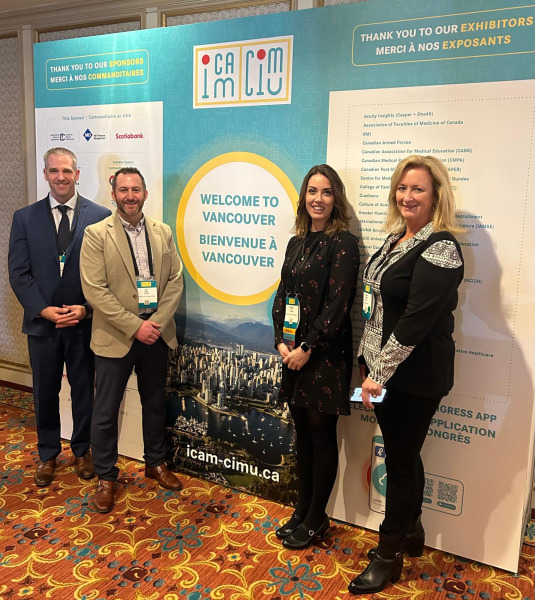
Recently, a few members of the Faculty of Medicine team attended the International Congress on Academic Medicine (ICAM) in Vancouver, which is the premier Canadian meeting for medical schools and medical education with over 1,250 participants. It was fun being one of the new kids on the block, and attendees were very interested in and enthusiastic about what is happening at UPEI.
UPEI is certainly not alone, as Canada is seeing the greatest expansion in medical and health education since four new medical schools opened at the time of Confederation in 1967. Many new campuses are being planned, and three other universities are starting new medical schools (TMU, SFU, and York). One speaker remarked, “Stand up if you are not starting a new campus or medical school. Or, more correctly, stand up if your government hasn’t told you to start a new campus or medical school!” It was a great opportunity to network and learn from both established medical schools and others more like UPEI. Islanders can take pride in this; we are holding our own and ahead of some in this enormous national effort to contribute to the solution of the massive local and national shortage of healthcare professionals.
Key themes of the conference, other than the growth of enrolment and programs, were Indigenous health, equity, diversity, inclusivity, anti-racism, accessibility, interprofessional education, team-based care, simulation-based education, and artificial intelligence. It was a great conference with excellent education and networking.
Media Contact
Relevant links.
- Academic Calendar
- MyUPEI | Campus Login
- Staff and Faculty Lookup
- Study Abroad
- Explore the Campus
- Crisis Centre
- Athletics and Recreation
- Faculties and Schools
- Conference Services
- Health and Wellness
- Sexual Violence Prevention and Response Office

IMAGES
VIDEO
COMMENTS
This 2-semester course prepares students for studying in the German higher education system, helps them improve their language skills, and ends with the Feststellungsprüfung, an examination that allows international students to enter the German higher education system. Students who want to study medicine need to visit the M-Course at a ...
A passing score allows admission into the MBBS program. An MBBS graduate can practice medicine independently or pursue an MD or MS postgraduate degree. Free at public universities (except for the universities in Baden-Württemberg, e.g. Heidelberg, Stuttgart, Freiburg). 50,000 - 100,000 € at private universities. Fees.
Top 10 Biggest Medical Faculties in Germany. Ranked according to number of enrolled students in all medical programs of that faculty (as of August 2020): Charité - Universitätsmedizin Berlin - 8,077. LMU - Ludwig-Maximilians-Universität München - 6,911.
With that said, medical studies may take up to 7 years and 3 months. A medical degree in Germany has 12 semesters and is divided into a preclinical study section (1st - 4th semesters) and a clinical study section (5th - 12th semesters). The last two semesters, students spent working in different hospitals as interns.
The best English-taught med schools in Germany. According to the QS rankings by subject, these are the top German universities that offer Medical programmes: Heidelberg University. LMU University. Charité - Universitätsmedizin Berlin. Technical University of Munich. Hamburg University. Goethe University Frankfurt.
Medical practice is important, and German schools provide modern, well-equipped laboratories that give you the practical skills needed to succeed in the medical field. Diverse Student Community. With over 350,000 international students, Germany is full of different cultures. You'll have the chance to interact with people from around the world ...
The courses are heavily oversubscribed: each year, some 45,000 applications are submitted for one of the 9,000 or so available places to study medicine in Germany. The grade achieved in the applicant's university entrance qualification plays an important role: 30 percent of students are selected according to their performance in their final ...
The UMFST of Targu Mures, with its more than 11,000 students, is not only the largest, but also the most research-intensive medical institution of higher education in Romania. The University contributes significantly to the further development of evidence-based medicineWith the help of new technologies. More information.
One of the world's most popular non-anglophone study destinations, Germany is an ideal location for studying a medical degree, offering high-quality education at an affordable price. 32 German universities are included in the latest QS World University Rankings by Subject for Medicine, meaning there are plenty of options, depending on what type of university experience you're looking for.
Which medical schools in Germany are the best for International Students? When seeking top-notch medical education, a few outstanding choices stand out. Among them are universities like Heidelberg University, Rwth Aachen University, Lubeck University, Witten/Hercke University, and Magdeburg University. These institutions shine due to their ...
The semester fee for international students in Munich, Garching and Weihenstephan is €152.30; Straubing is €62.00; and Heilbronn is €92.00. As one of the most acclaimed medical universities in Germany, it offers a remarkable opportunity for international students through the Scholarship Program.
The course is completed with a state examination. The structure of the course is regulated uniformly throughout Germany via the Medical Licensing Regulations (ÄAppO). The course differs from training in other countries in a number of ways. After the basic course of four semesters and the first of a three-part "medical examination", a main ...
International students pursuing education in Germany employ various strategies to cover their educational expenses. The approaches they choose reflect their financial circumstances and aspirations: Family Income and Savings (30%): Many international students rely on their family's financial support or use their personal savings to fund their ...
Ranked 221 globally, the University of Wurzburg is a hub for medical innovation. Its comprehensive medical programs and state-of-the-art facilities make it a preferred choice for prospective medical students. 4. University of Giessen: At 392 in global rankings, the University of Giessen emphasizes a holistic approach to medical education. The ...
The Medical Faculty in Heidelberg is one of the oldest medical faculties in Germany, with an international reputation. Students benefit from outstanding opportunities for study and research. The degree programme in Medicine lasts for a minimum of six years and three months and consists in three training phases: Preclinical study. Clinical study.
The Master's degree in Medical Education at the HMU focuses on three areas: Educational Sciences, the Social Sciences and the elective areas of Health Sciences (including Therapy Sciences) or Nursing Sciences. The part-time model of the HMU Health and Medical University Potsdam provides part-time students with the opportunity to gain academic ...
Embarking on a journey towards a medical career is a commendable pursuit, and for many aspiring medical professionals, studying abroad is a viable option. Germany, renowned for its world-class…
Finally, Henrike Schulze and colleagues have summarized the "Symposium International Medical Students" of the German Medical Students Association, ... licensing examinations with the participation in international health electives during the final year of undergraduate medical education in Germany. GMS J Med Educ. 2018;35(5):Doc54.
Fee Structure for MBBS in Germany. State-funded German medical universities charge a nominal semester fee that usually ranges between € 100-500 each semester. Privately-owned institutions charge an annual fee of € 28,000 or above. However, students have to incur significant living expenses during their stay in Germany.
Undergraduate education e.g. preparatory classes for medical school, prevalent in some countries, do not exist in Germany. Therefore, the term undergraduate or graduate education does not apply in the strict sense. In Germany, the average age of medical students is 21.4 years when they start medical school [ 14 ].
Postgraduate medical training in Germany has undergone several changes since then [ 4 ], [ 5 ]. Undergraduate medical education has previously been described in detail [ 6 ]. About 10,000 medical students graduate in Germany each year [ 7] and over 95% plan to begin postgraduate medical training [ 8 ].
Once these criteria are fulfilled, medical students in Germany typically partake in the second state board exam after their 5 th year of education. It entails 320 multiple-choice questions over a course of three consecutive days. In recent years, German universities have begun to implement more innovative and practical aspects into the clinical ...
Germany is a hotspot for education, offering a wide range of courses and programs at world-renowned universities. With over 450,000 international students already making the most of what Germany has to offer, it's a top pick for students worldwide. If you're considering pursuing a degree in Germany, we've put together a handy list of the requirements you'll need to meet - check them ...
A significant attraction for international students considering an education in Germany is the opportunity to work in the country post-graduation through the post-graduation work visa. This policy underlines Germany's commitment to fostering global talent and providing a seamless transition from higher education to gainful employment within its ...
Studying-in-Germany.org is the largest information portal about studying in Germany for foreign students. We publish news about the latest German higher education system changes and education policy updates, as well as a vast amount of informational content, articles, and research about studying in Germany for international students.
Recently, a few members of the Faculty of Medicine team attended the International Congress on Academic Medicine (ICAM) in Vancouver, which is the premier Canadian meeting for medical schools and medical education with over 1,250 participants. It was fun being one of the new kids on the block, and attendees were very interested in and enthusiastic about what is happening at UPEI.